Engagement between Family Supportive Supervisor Behaviors (FSSB) and Job Satisfaction: A Dissertation Study
VerifiedAdded on 2023/04/25
|66
|18347
|293
Dissertation
AI Summary
In this dissertation we will discuss about human resources dissertation and below are the summaries point:-
Dissertation investigates the relationship between Family Supportive Supervisor Behaviors (FSSB) and job satisfaction.
FSSB includes emotional support, work-life balance, instrumental support, and role modeling.
Findings indicate a strong association between FSSB and job satisfaction, highlighting the importance of supervisor support in the workplace.
Contribute Materials
Your contribution can guide someone’s learning journey. Share your
documents today.
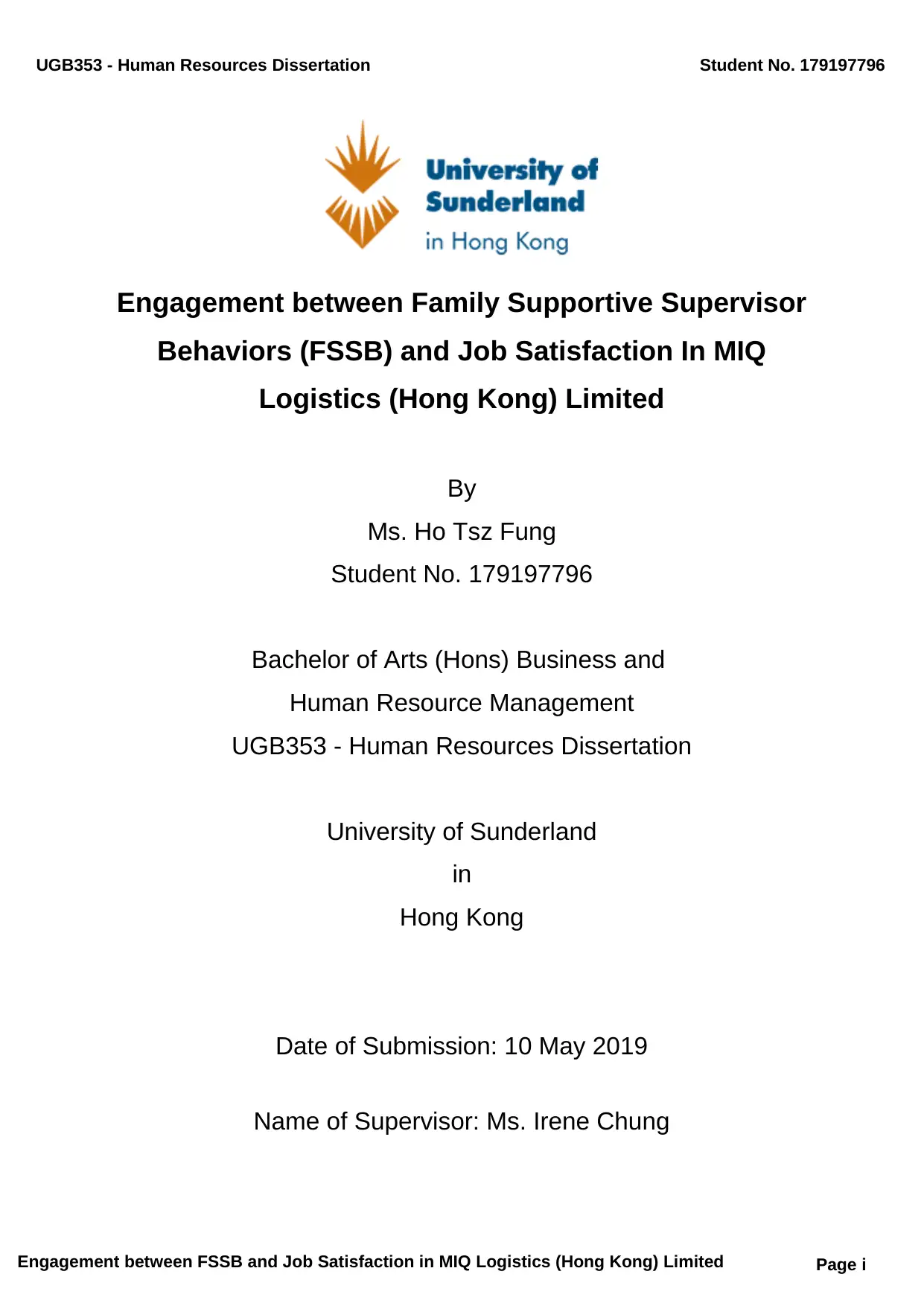
UGB353 - Human Resources Dissertation Student No. 179197796
Engagement between Family Supportive Supervisor
Behaviors (FSSB) and Job Satisfaction In MIQ
Logistics (Hong Kong) Limited
By
Ms. Ho Tsz Fung
Student No. 179197796
Bachelor of Arts (Hons) Business and
Human Resource Management
UGB353 - Human Resources Dissertation
University of Sunderland
in
Hong Kong
Date of Submission: 10 May 2019
Name of Supervisor: Ms. Irene Chung
Engagement between FSSB and Job Satisfaction in MIQ Logistics (Hong Kong) Limited Page i
Engagement between Family Supportive Supervisor
Behaviors (FSSB) and Job Satisfaction In MIQ
Logistics (Hong Kong) Limited
By
Ms. Ho Tsz Fung
Student No. 179197796
Bachelor of Arts (Hons) Business and
Human Resource Management
UGB353 - Human Resources Dissertation
University of Sunderland
in
Hong Kong
Date of Submission: 10 May 2019
Name of Supervisor: Ms. Irene Chung
Engagement between FSSB and Job Satisfaction in MIQ Logistics (Hong Kong) Limited Page i
Secure Best Marks with AI Grader
Need help grading? Try our AI Grader for instant feedback on your assignments.
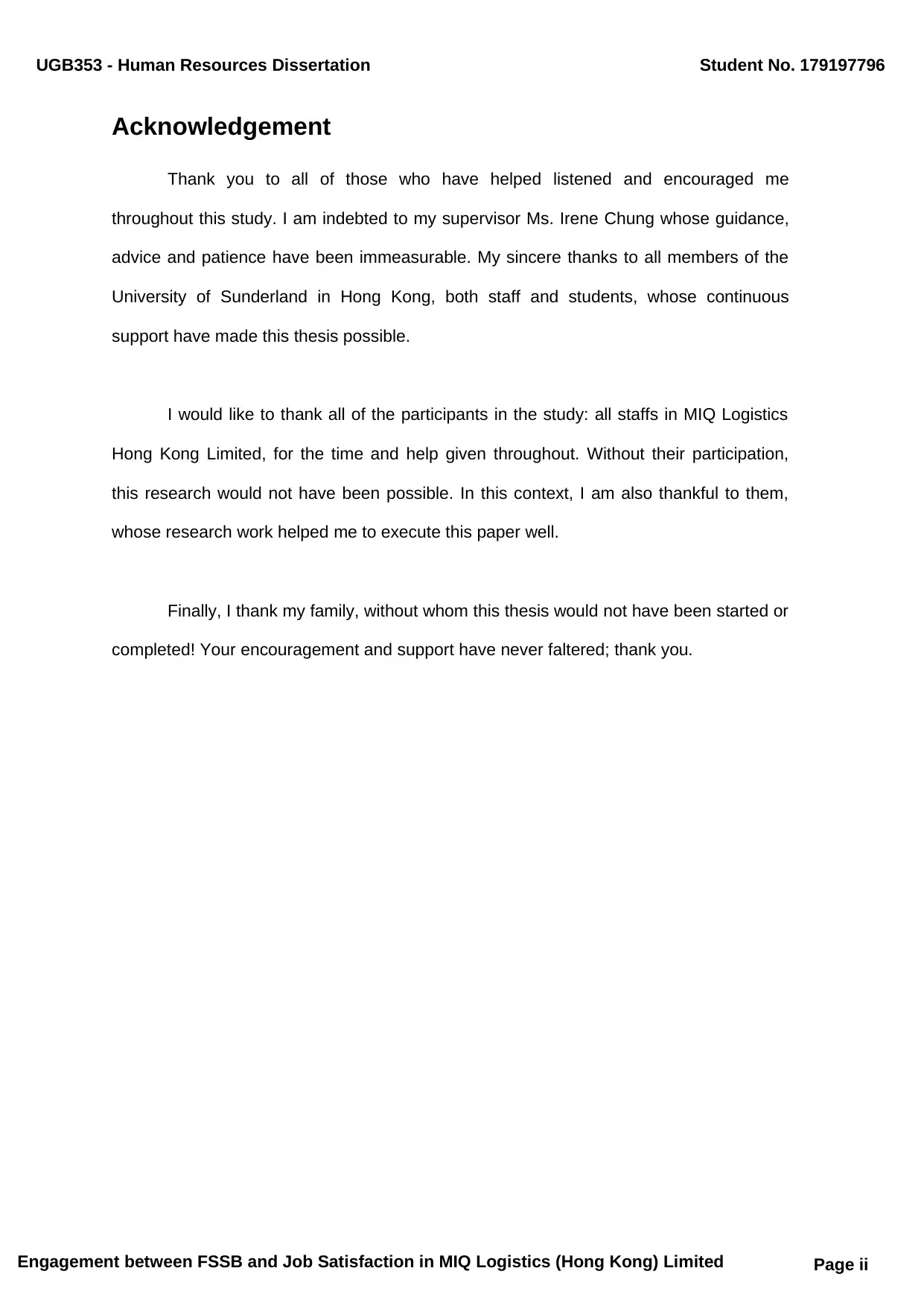
UGB353 - Human Resources Dissertation Student No. 179197796
Acknowledgement
Thank you to all of those who have helped listened and encouraged me
throughout this study. I am indebted to my supervisor Ms. Irene Chung whose guidance,
advice and patience have been immeasurable. My sincere thanks to all members of the
University of Sunderland in Hong Kong, both staff and students, whose continuous
support have made this thesis possible.
I would like to thank all of the participants in the study: all staffs in MIQ Logistics
Hong Kong Limited, for the time and help given throughout. Without their participation,
this research would not have been possible. In this context, I am also thankful to them,
whose research work helped me to execute this paper well.
Finally, I thank my family, without whom this thesis would not have been started or
completed! Your encouragement and support have never faltered; thank you.
Engagement between FSSB and Job Satisfaction in MIQ Logistics (Hong Kong) Limited Page ii
Acknowledgement
Thank you to all of those who have helped listened and encouraged me
throughout this study. I am indebted to my supervisor Ms. Irene Chung whose guidance,
advice and patience have been immeasurable. My sincere thanks to all members of the
University of Sunderland in Hong Kong, both staff and students, whose continuous
support have made this thesis possible.
I would like to thank all of the participants in the study: all staffs in MIQ Logistics
Hong Kong Limited, for the time and help given throughout. Without their participation,
this research would not have been possible. In this context, I am also thankful to them,
whose research work helped me to execute this paper well.
Finally, I thank my family, without whom this thesis would not have been started or
completed! Your encouragement and support have never faltered; thank you.
Engagement between FSSB and Job Satisfaction in MIQ Logistics (Hong Kong) Limited Page ii
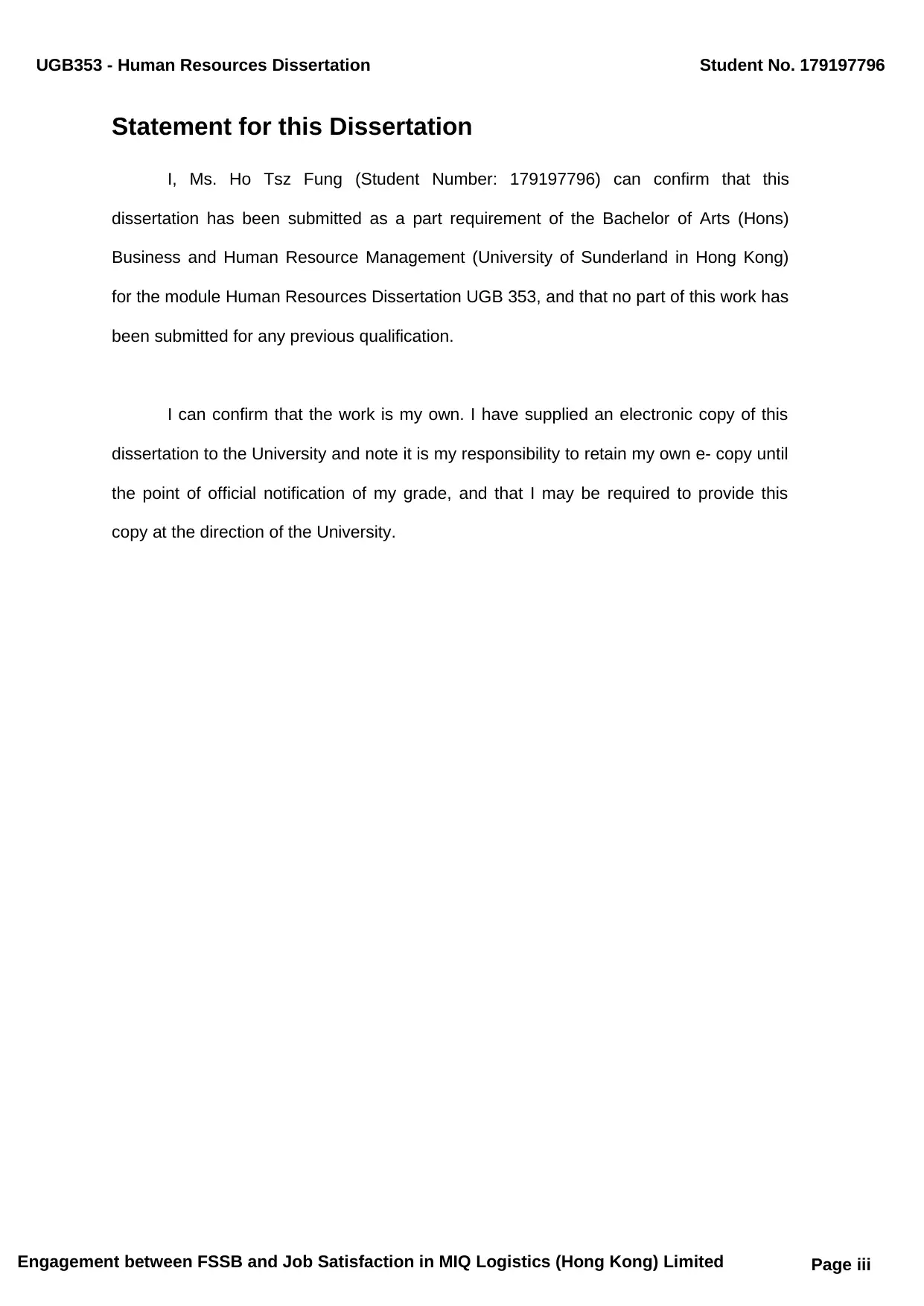
UGB353 - Human Resources Dissertation Student No. 179197796
Statement for this Dissertation
I, Ms. Ho Tsz Fung (Student Number: 179197796) can confirm that this
dissertation has been submitted as a part requirement of the Bachelor of Arts (Hons)
Business and Human Resource Management (University of Sunderland in Hong Kong)
for the module Human Resources Dissertation UGB 353, and that no part of this work has
been submitted for any previous qualification.
I can confirm that the work is my own. I have supplied an electronic copy of this
dissertation to the University and note it is my responsibility to retain my own e- copy until
the point of official notification of my grade, and that I may be required to provide this
copy at the direction of the University.
Engagement between FSSB and Job Satisfaction in MIQ Logistics (Hong Kong) Limited Page iii
Statement for this Dissertation
I, Ms. Ho Tsz Fung (Student Number: 179197796) can confirm that this
dissertation has been submitted as a part requirement of the Bachelor of Arts (Hons)
Business and Human Resource Management (University of Sunderland in Hong Kong)
for the module Human Resources Dissertation UGB 353, and that no part of this work has
been submitted for any previous qualification.
I can confirm that the work is my own. I have supplied an electronic copy of this
dissertation to the University and note it is my responsibility to retain my own e- copy until
the point of official notification of my grade, and that I may be required to provide this
copy at the direction of the University.
Engagement between FSSB and Job Satisfaction in MIQ Logistics (Hong Kong) Limited Page iii
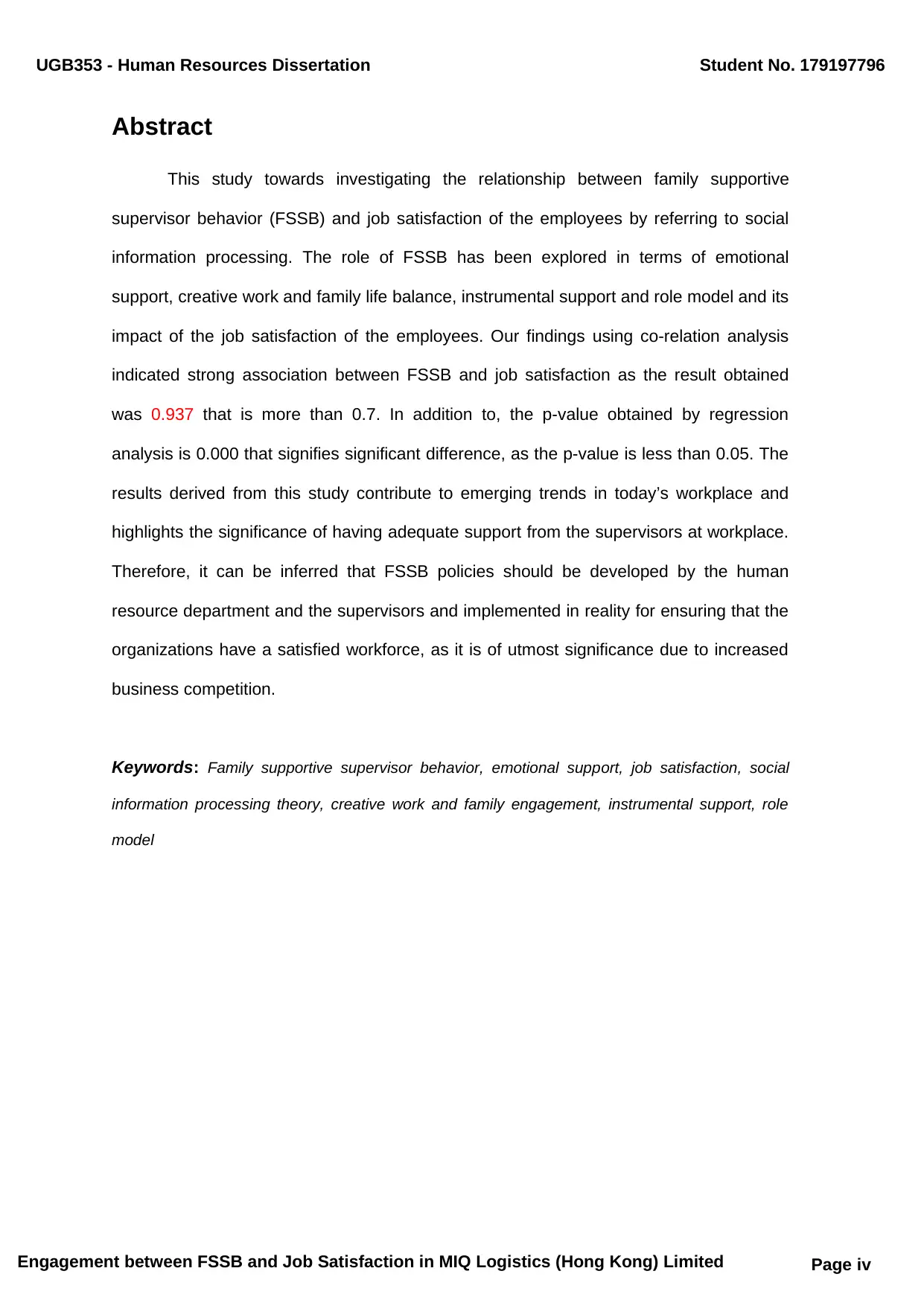
UGB353 - Human Resources Dissertation Student No. 179197796
Abstract
This study towards investigating the relationship between family supportive
supervisor behavior (FSSB) and job satisfaction of the employees by referring to social
information processing. The role of FSSB has been explored in terms of emotional
support, creative work and family life balance, instrumental support and role model and its
impact of the job satisfaction of the employees. Our findings using co-relation analysis
indicated strong association between FSSB and job satisfaction as the result obtained
was 0.937 that is more than 0.7. In addition to, the p-value obtained by regression
analysis is 0.000 that signifies significant difference, as the p-value is less than 0.05. The
results derived from this study contribute to emerging trends in today’s workplace and
highlights the significance of having adequate support from the supervisors at workplace.
Therefore, it can be inferred that FSSB policies should be developed by the human
resource department and the supervisors and implemented in reality for ensuring that the
organizations have a satisfied workforce, as it is of utmost significance due to increased
business competition.
Keywords: Family supportive supervisor behavior, emotional support, job satisfaction, social
information processing theory, creative work and family engagement, instrumental support, role
model
Engagement between FSSB and Job Satisfaction in MIQ Logistics (Hong Kong) Limited Page iv
Abstract
This study towards investigating the relationship between family supportive
supervisor behavior (FSSB) and job satisfaction of the employees by referring to social
information processing. The role of FSSB has been explored in terms of emotional
support, creative work and family life balance, instrumental support and role model and its
impact of the job satisfaction of the employees. Our findings using co-relation analysis
indicated strong association between FSSB and job satisfaction as the result obtained
was 0.937 that is more than 0.7. In addition to, the p-value obtained by regression
analysis is 0.000 that signifies significant difference, as the p-value is less than 0.05. The
results derived from this study contribute to emerging trends in today’s workplace and
highlights the significance of having adequate support from the supervisors at workplace.
Therefore, it can be inferred that FSSB policies should be developed by the human
resource department and the supervisors and implemented in reality for ensuring that the
organizations have a satisfied workforce, as it is of utmost significance due to increased
business competition.
Keywords: Family supportive supervisor behavior, emotional support, job satisfaction, social
information processing theory, creative work and family engagement, instrumental support, role
model
Engagement between FSSB and Job Satisfaction in MIQ Logistics (Hong Kong) Limited Page iv
Secure Best Marks with AI Grader
Need help grading? Try our AI Grader for instant feedback on your assignments.
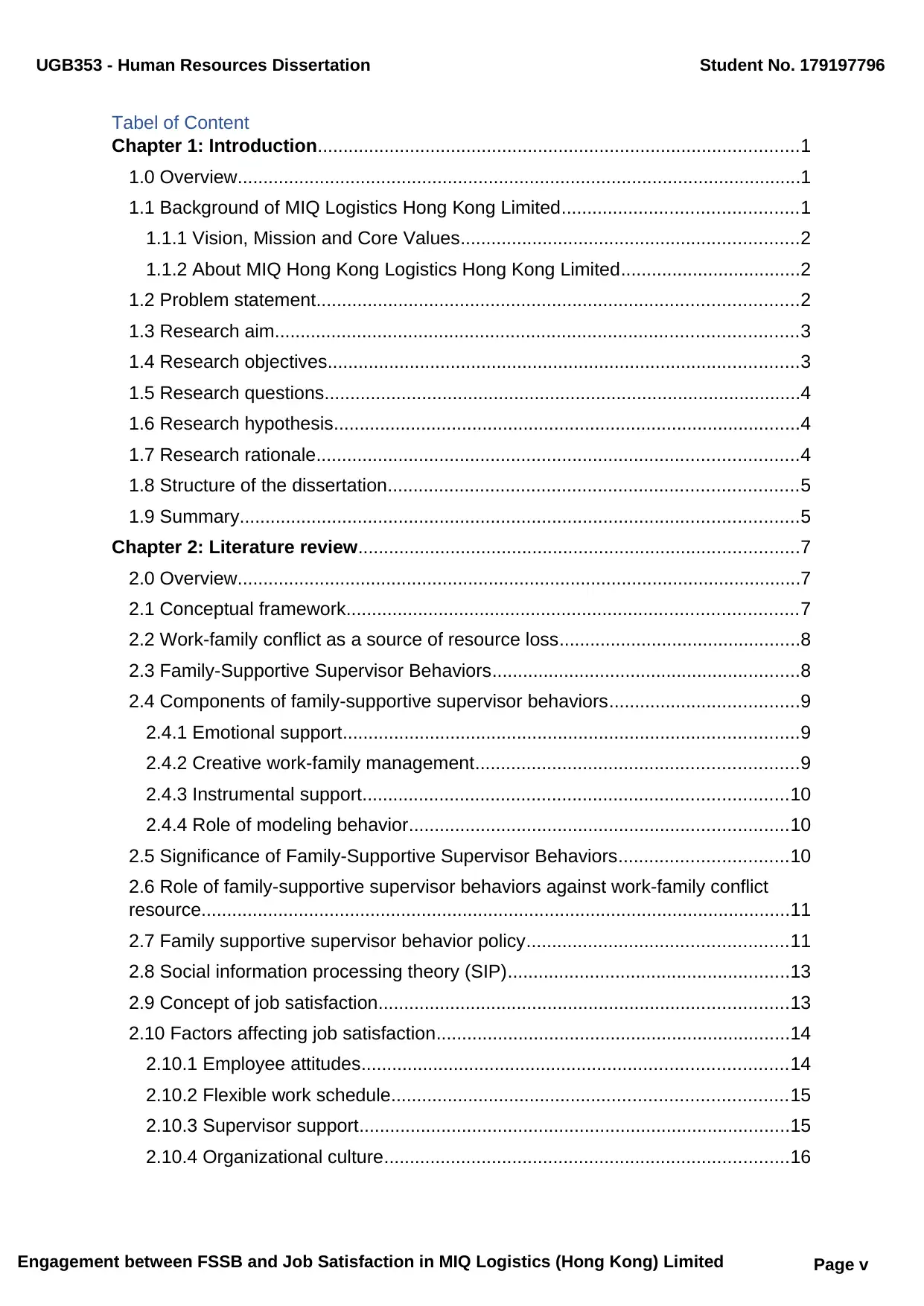
UGB353 - Human Resources Dissertation Student No. 179197796
Tabel of Content
Chapter 1: Introduction..............................................................................................1
1.0 Overview..............................................................................................................1
1.1 Background of MIQ Logistics Hong Kong Limited..............................................1
1.1.1 Vision, Mission and Core Values..................................................................2
1.1.2 About MIQ Hong Kong Logistics Hong Kong Limited...................................2
1.2 Problem statement..............................................................................................2
1.3 Research aim......................................................................................................3
1.4 Research objectives............................................................................................3
1.5 Research questions.............................................................................................4
1.6 Research hypothesis...........................................................................................4
1.7 Research rationale..............................................................................................4
1.8 Structure of the dissertation................................................................................5
1.9 Summary.............................................................................................................5
Chapter 2: Literature review......................................................................................7
2.0 Overview..............................................................................................................7
2.1 Conceptual framework........................................................................................7
2.2 Work-family conflict as a source of resource loss...............................................8
2.3 Family-Supportive Supervisor Behaviors............................................................8
2.4 Components of family-supportive supervisor behaviors.....................................9
2.4.1 Emotional support.........................................................................................9
2.4.2 Creative work-family management...............................................................9
2.4.3 Instrumental support...................................................................................10
2.4.4 Role of modeling behavior..........................................................................10
2.5 Significance of Family-Supportive Supervisor Behaviors.................................10
2.6 Role of family-supportive supervisor behaviors against work-family conflict
resource...................................................................................................................11
2.7 Family supportive supervisor behavior policy...................................................11
2.8 Social information processing theory (SIP).......................................................13
2.9 Concept of job satisfaction................................................................................13
2.10 Factors affecting job satisfaction.....................................................................14
2.10.1 Employee attitudes...................................................................................14
2.10.2 Flexible work schedule.............................................................................15
2.10.3 Supervisor support....................................................................................15
2.10.4 Organizational culture...............................................................................16
Engagement between FSSB and Job Satisfaction in MIQ Logistics (Hong Kong) Limited Page v
Tabel of Content
Chapter 1: Introduction..............................................................................................1
1.0 Overview..............................................................................................................1
1.1 Background of MIQ Logistics Hong Kong Limited..............................................1
1.1.1 Vision, Mission and Core Values..................................................................2
1.1.2 About MIQ Hong Kong Logistics Hong Kong Limited...................................2
1.2 Problem statement..............................................................................................2
1.3 Research aim......................................................................................................3
1.4 Research objectives............................................................................................3
1.5 Research questions.............................................................................................4
1.6 Research hypothesis...........................................................................................4
1.7 Research rationale..............................................................................................4
1.8 Structure of the dissertation................................................................................5
1.9 Summary.............................................................................................................5
Chapter 2: Literature review......................................................................................7
2.0 Overview..............................................................................................................7
2.1 Conceptual framework........................................................................................7
2.2 Work-family conflict as a source of resource loss...............................................8
2.3 Family-Supportive Supervisor Behaviors............................................................8
2.4 Components of family-supportive supervisor behaviors.....................................9
2.4.1 Emotional support.........................................................................................9
2.4.2 Creative work-family management...............................................................9
2.4.3 Instrumental support...................................................................................10
2.4.4 Role of modeling behavior..........................................................................10
2.5 Significance of Family-Supportive Supervisor Behaviors.................................10
2.6 Role of family-supportive supervisor behaviors against work-family conflict
resource...................................................................................................................11
2.7 Family supportive supervisor behavior policy...................................................11
2.8 Social information processing theory (SIP).......................................................13
2.9 Concept of job satisfaction................................................................................13
2.10 Factors affecting job satisfaction.....................................................................14
2.10.1 Employee attitudes...................................................................................14
2.10.2 Flexible work schedule.............................................................................15
2.10.3 Supervisor support....................................................................................15
2.10.4 Organizational culture...............................................................................16
Engagement between FSSB and Job Satisfaction in MIQ Logistics (Hong Kong) Limited Page v
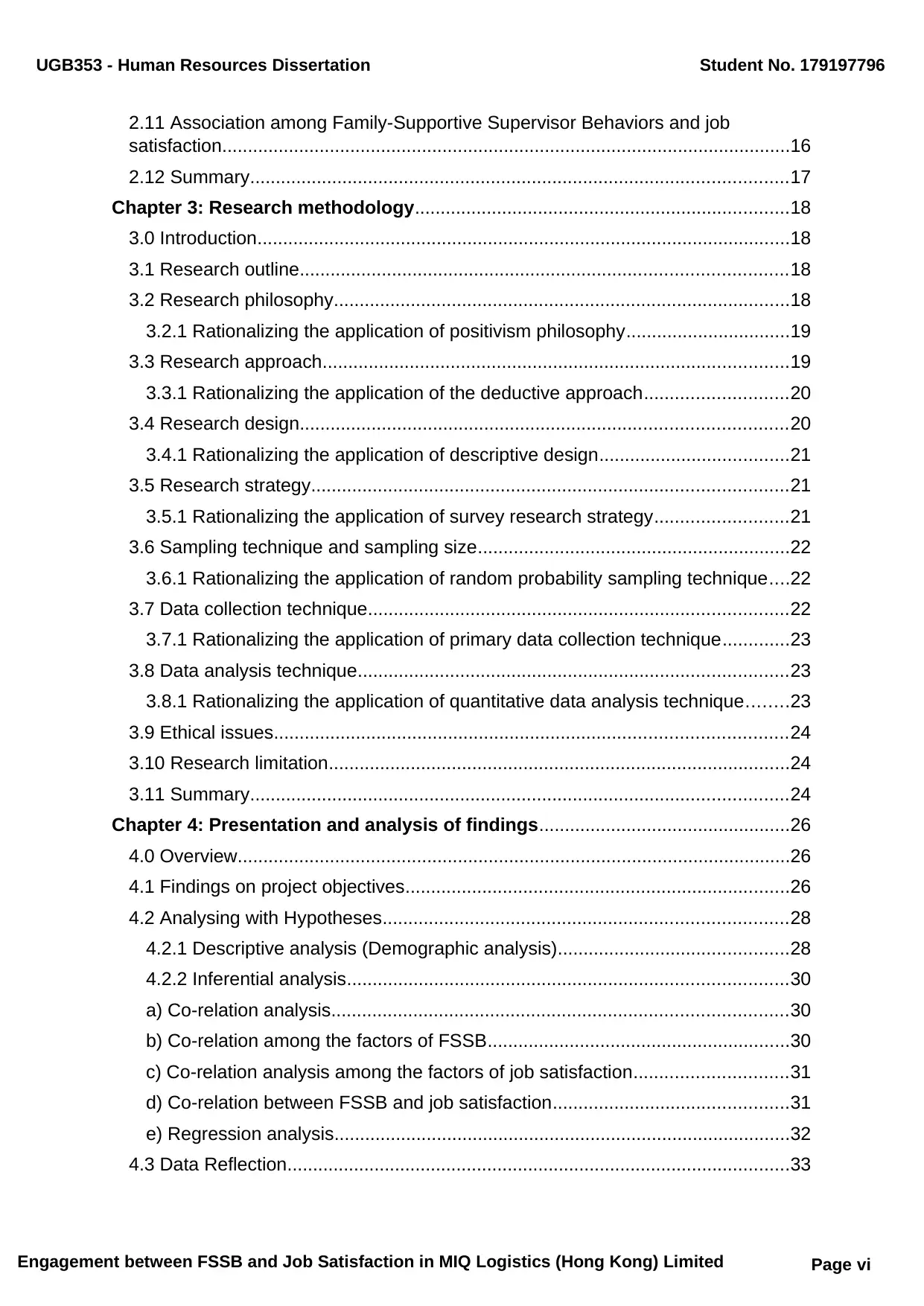
UGB353 - Human Resources Dissertation Student No. 179197796
2.11 Association among Family-Supportive Supervisor Behaviors and job
satisfaction...............................................................................................................16
2.12 Summary.........................................................................................................17
Chapter 3: Research methodology.........................................................................18
3.0 Introduction........................................................................................................18
3.1 Research outline...............................................................................................18
3.2 Research philosophy.........................................................................................18
3.2.1 Rationalizing the application of positivism philosophy................................19
3.3 Research approach...........................................................................................19
3.3.1 Rationalizing the application of the deductive approach............................20
3.4 Research design...............................................................................................20
3.4.1 Rationalizing the application of descriptive design.....................................21
3.5 Research strategy.............................................................................................21
3.5.1 Rationalizing the application of survey research strategy..........................21
3.6 Sampling technique and sampling size.............................................................22
3.6.1 Rationalizing the application of random probability sampling technique....22
3.7 Data collection technique..................................................................................22
3.7.1 Rationalizing the application of primary data collection technique.............23
3.8 Data analysis technique....................................................................................23
3.8.1 Rationalizing the application of quantitative data analysis technique........23
3.9 Ethical issues....................................................................................................24
3.10 Research limitation..........................................................................................24
3.11 Summary.........................................................................................................24
Chapter 4: Presentation and analysis of findings.................................................26
4.0 Overview............................................................................................................26
4.1 Findings on project objectives...........................................................................26
4.2 Analysing with Hypotheses...............................................................................28
4.2.1 Descriptive analysis (Demographic analysis).............................................28
4.2.2 Inferential analysis......................................................................................30
a) Co-relation analysis.........................................................................................30
b) Co-relation among the factors of FSSB...........................................................30
c) Co-relation analysis among the factors of job satisfaction..............................31
d) Co-relation between FSSB and job satisfaction..............................................31
e) Regression analysis.........................................................................................32
4.3 Data Reflection..................................................................................................33
Engagement between FSSB and Job Satisfaction in MIQ Logistics (Hong Kong) Limited Page vi
2.11 Association among Family-Supportive Supervisor Behaviors and job
satisfaction...............................................................................................................16
2.12 Summary.........................................................................................................17
Chapter 3: Research methodology.........................................................................18
3.0 Introduction........................................................................................................18
3.1 Research outline...............................................................................................18
3.2 Research philosophy.........................................................................................18
3.2.1 Rationalizing the application of positivism philosophy................................19
3.3 Research approach...........................................................................................19
3.3.1 Rationalizing the application of the deductive approach............................20
3.4 Research design...............................................................................................20
3.4.1 Rationalizing the application of descriptive design.....................................21
3.5 Research strategy.............................................................................................21
3.5.1 Rationalizing the application of survey research strategy..........................21
3.6 Sampling technique and sampling size.............................................................22
3.6.1 Rationalizing the application of random probability sampling technique....22
3.7 Data collection technique..................................................................................22
3.7.1 Rationalizing the application of primary data collection technique.............23
3.8 Data analysis technique....................................................................................23
3.8.1 Rationalizing the application of quantitative data analysis technique........23
3.9 Ethical issues....................................................................................................24
3.10 Research limitation..........................................................................................24
3.11 Summary.........................................................................................................24
Chapter 4: Presentation and analysis of findings.................................................26
4.0 Overview............................................................................................................26
4.1 Findings on project objectives...........................................................................26
4.2 Analysing with Hypotheses...............................................................................28
4.2.1 Descriptive analysis (Demographic analysis).............................................28
4.2.2 Inferential analysis......................................................................................30
a) Co-relation analysis.........................................................................................30
b) Co-relation among the factors of FSSB...........................................................30
c) Co-relation analysis among the factors of job satisfaction..............................31
d) Co-relation between FSSB and job satisfaction..............................................31
e) Regression analysis.........................................................................................32
4.3 Data Reflection..................................................................................................33
Engagement between FSSB and Job Satisfaction in MIQ Logistics (Hong Kong) Limited Page vi
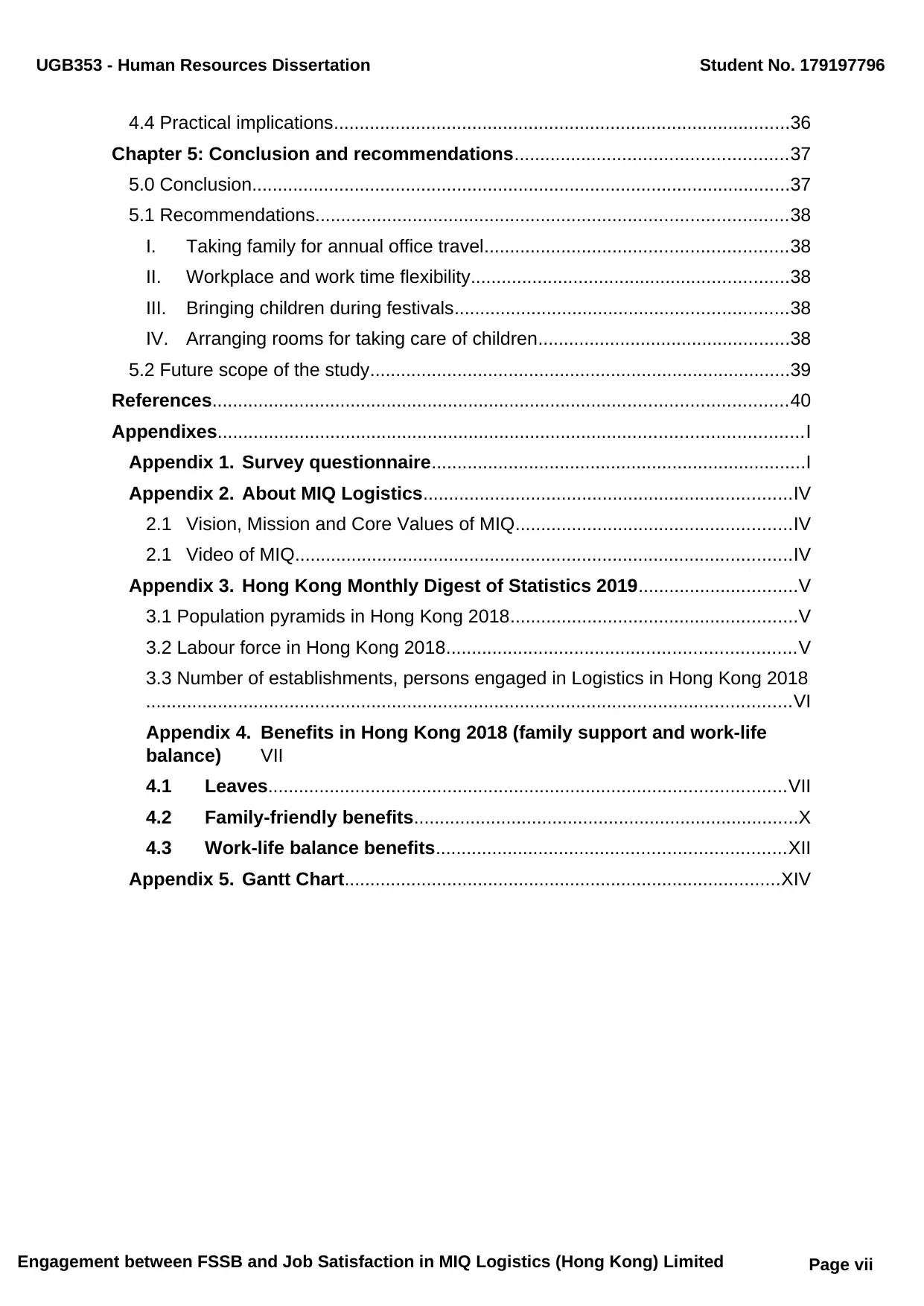
UGB353 - Human Resources Dissertation Student No. 179197796
4.4 Practical implications.........................................................................................36
Chapter 5: Conclusion and recommendations.....................................................37
5.0 Conclusion.........................................................................................................37
5.1 Recommendations............................................................................................38
I. Taking family for annual office travel...........................................................38
II. Workplace and work time flexibility..............................................................38
III. Bringing children during festivals.................................................................38
IV. Arranging rooms for taking care of children.................................................38
5.2 Future scope of the study..................................................................................39
References................................................................................................................40
Appendixes..................................................................................................................I
Appendix 1. Survey questionnaire.........................................................................I
Appendix 2. About MIQ Logistics........................................................................IV
2.1 Vision, Mission and Core Values of MIQ......................................................IV
2.1 Video of MIQ.................................................................................................IV
Appendix 3. Hong Kong Monthly Digest of Statistics 2019...............................V
3.1 Population pyramids in Hong Kong 2018........................................................V
3.2 Labour force in Hong Kong 2018....................................................................V
3.3 Number of establishments, persons engaged in Logistics in Hong Kong 2018
..............................................................................................................................VI
Appendix 4. Benefits in Hong Kong 2018 (family support and work-life
balance) VII
4.1 Leaves.....................................................................................................VII
4.2 Family-friendly benefits...........................................................................X
4.3 Work-life balance benefits....................................................................XII
Appendix 5. Gantt Chart.....................................................................................XIV
Engagement between FSSB and Job Satisfaction in MIQ Logistics (Hong Kong) Limited Page vii
4.4 Practical implications.........................................................................................36
Chapter 5: Conclusion and recommendations.....................................................37
5.0 Conclusion.........................................................................................................37
5.1 Recommendations............................................................................................38
I. Taking family for annual office travel...........................................................38
II. Workplace and work time flexibility..............................................................38
III. Bringing children during festivals.................................................................38
IV. Arranging rooms for taking care of children.................................................38
5.2 Future scope of the study..................................................................................39
References................................................................................................................40
Appendixes..................................................................................................................I
Appendix 1. Survey questionnaire.........................................................................I
Appendix 2. About MIQ Logistics........................................................................IV
2.1 Vision, Mission and Core Values of MIQ......................................................IV
2.1 Video of MIQ.................................................................................................IV
Appendix 3. Hong Kong Monthly Digest of Statistics 2019...............................V
3.1 Population pyramids in Hong Kong 2018........................................................V
3.2 Labour force in Hong Kong 2018....................................................................V
3.3 Number of establishments, persons engaged in Logistics in Hong Kong 2018
..............................................................................................................................VI
Appendix 4. Benefits in Hong Kong 2018 (family support and work-life
balance) VII
4.1 Leaves.....................................................................................................VII
4.2 Family-friendly benefits...........................................................................X
4.3 Work-life balance benefits....................................................................XII
Appendix 5. Gantt Chart.....................................................................................XIV
Engagement between FSSB and Job Satisfaction in MIQ Logistics (Hong Kong) Limited Page vii
Paraphrase This Document
Need a fresh take? Get an instant paraphrase of this document with our AI Paraphraser
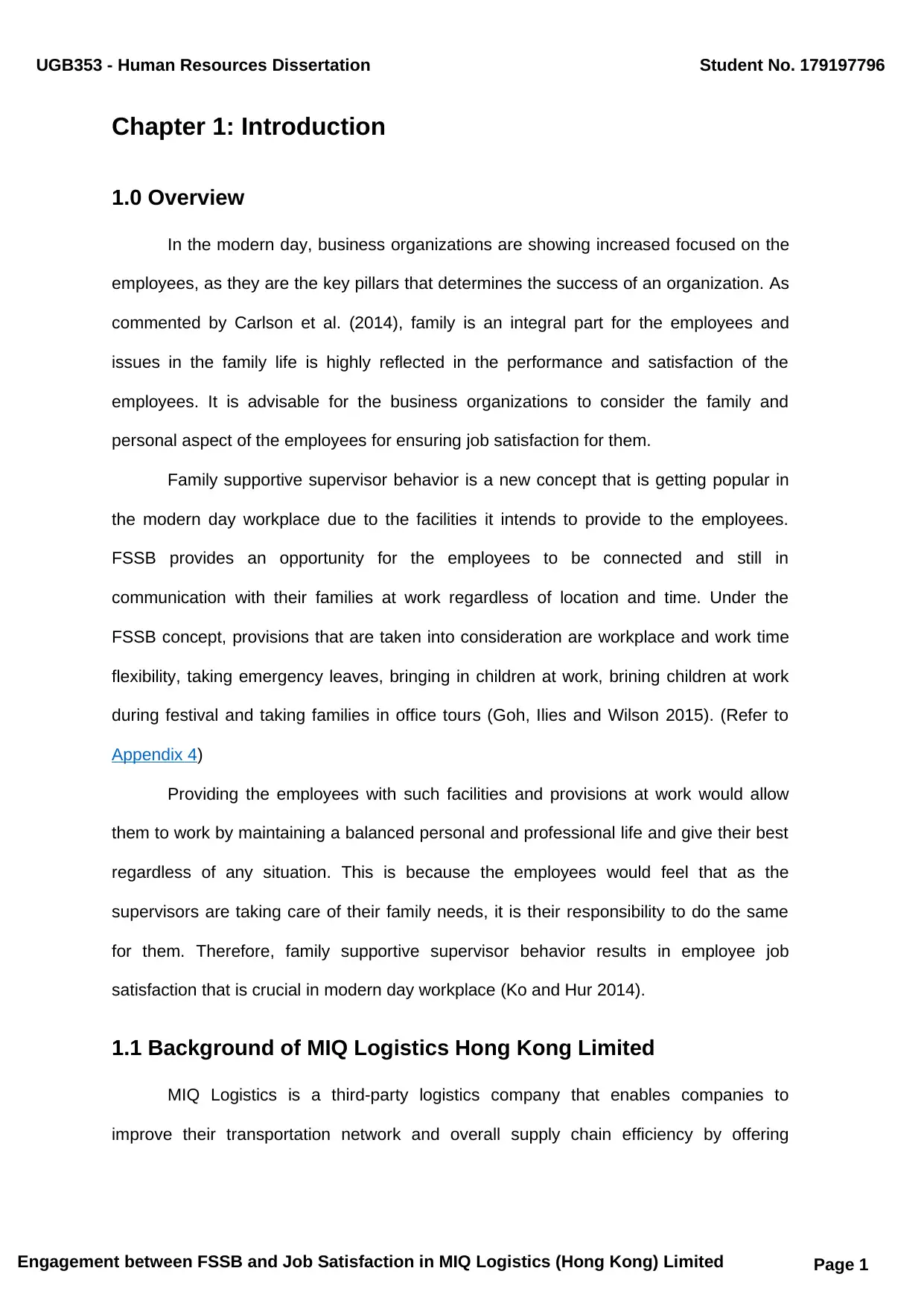
UGB353 - Human Resources Dissertation Student No. 179197796
Chapter 1: Introduction
1.0 Overview
In the modern day, business organizations are showing increased focused on the
employees, as they are the key pillars that determines the success of an organization. As
commented by Carlson et al. (2014), family is an integral part for the employees and
issues in the family life is highly reflected in the performance and satisfaction of the
employees. It is advisable for the business organizations to consider the family and
personal aspect of the employees for ensuring job satisfaction for them.
Family supportive supervisor behavior is a new concept that is getting popular in
the modern day workplace due to the facilities it intends to provide to the employees.
FSSB provides an opportunity for the employees to be connected and still in
communication with their families at work regardless of location and time. Under the
FSSB concept, provisions that are taken into consideration are workplace and work time
flexibility, taking emergency leaves, bringing in children at work, brining children at work
during festival and taking families in office tours (Goh, Ilies and Wilson 2015). (Refer to
Appendix 4)
Providing the employees with such facilities and provisions at work would allow
them to work by maintaining a balanced personal and professional life and give their best
regardless of any situation. This is because the employees would feel that as the
supervisors are taking care of their family needs, it is their responsibility to do the same
for them. Therefore, family supportive supervisor behavior results in employee job
satisfaction that is crucial in modern day workplace (Ko and Hur 2014).
1.1 Background of MIQ Logistics Hong Kong Limited
MIQ Logistics is a third-party logistics company that enables companies to
improve their transportation network and overall supply chain efficiency by offering
Engagement between FSSB and Job Satisfaction in MIQ Logistics (Hong Kong) Limited Page 1
Chapter 1: Introduction
1.0 Overview
In the modern day, business organizations are showing increased focused on the
employees, as they are the key pillars that determines the success of an organization. As
commented by Carlson et al. (2014), family is an integral part for the employees and
issues in the family life is highly reflected in the performance and satisfaction of the
employees. It is advisable for the business organizations to consider the family and
personal aspect of the employees for ensuring job satisfaction for them.
Family supportive supervisor behavior is a new concept that is getting popular in
the modern day workplace due to the facilities it intends to provide to the employees.
FSSB provides an opportunity for the employees to be connected and still in
communication with their families at work regardless of location and time. Under the
FSSB concept, provisions that are taken into consideration are workplace and work time
flexibility, taking emergency leaves, bringing in children at work, brining children at work
during festival and taking families in office tours (Goh, Ilies and Wilson 2015). (Refer to
Appendix 4)
Providing the employees with such facilities and provisions at work would allow
them to work by maintaining a balanced personal and professional life and give their best
regardless of any situation. This is because the employees would feel that as the
supervisors are taking care of their family needs, it is their responsibility to do the same
for them. Therefore, family supportive supervisor behavior results in employee job
satisfaction that is crucial in modern day workplace (Ko and Hur 2014).
1.1 Background of MIQ Logistics Hong Kong Limited
MIQ Logistics is a third-party logistics company that enables companies to
improve their transportation network and overall supply chain efficiency by offering
Engagement between FSSB and Job Satisfaction in MIQ Logistics (Hong Kong) Limited Page 1
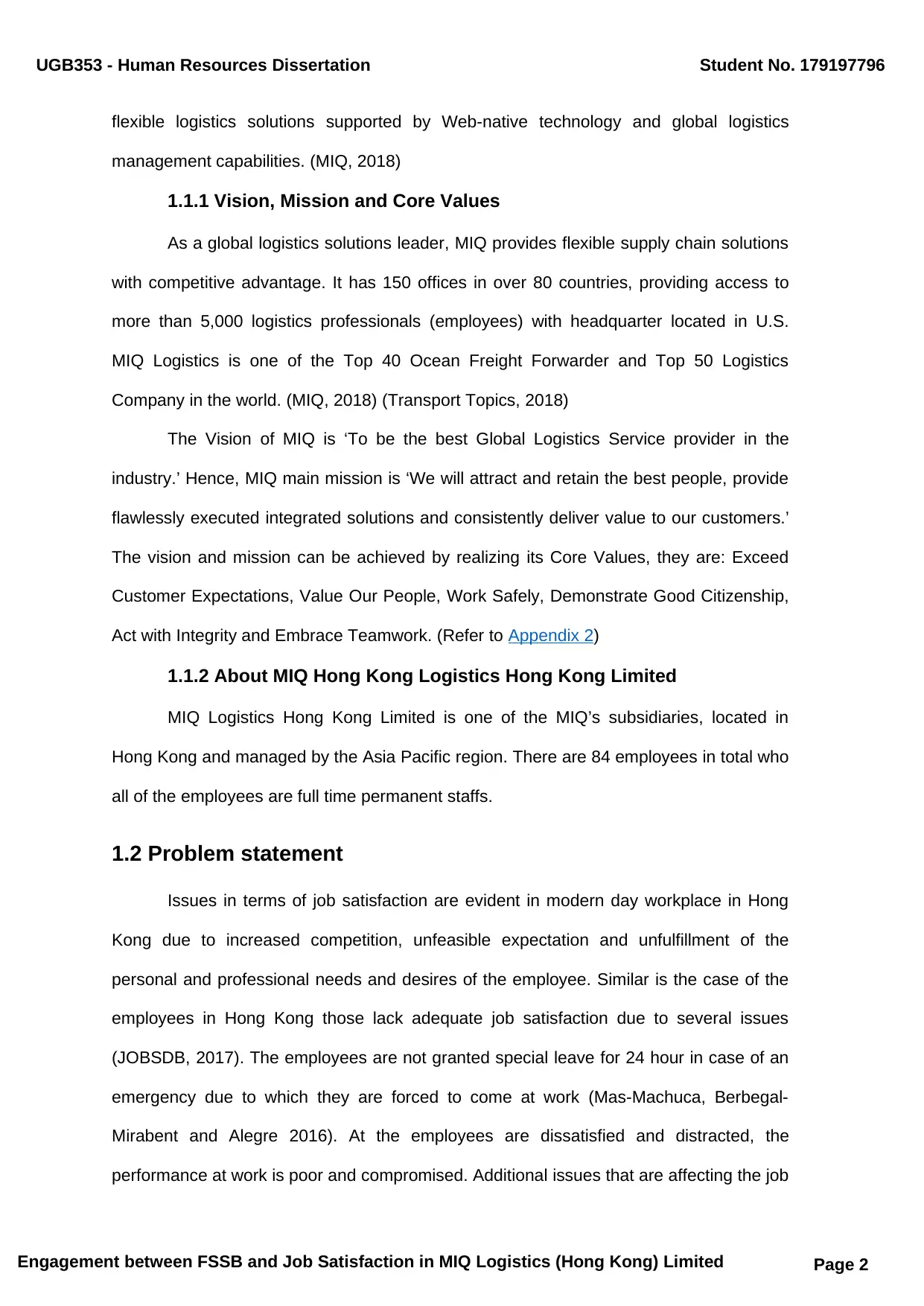
UGB353 - Human Resources Dissertation Student No. 179197796
flexible logistics solutions supported by Web-native technology and global logistics
management capabilities. (MIQ, 2018)
1.1.1 Vision, Mission and Core Values
As a global logistics solutions leader, MIQ provides flexible supply chain solutions
with competitive advantage. It has 150 offices in over 80 countries, providing access to
more than 5,000 logistics professionals (employees) with headquarter located in U.S.
MIQ Logistics is one of the Top 40 Ocean Freight Forwarder and Top 50 Logistics
Company in the world. (MIQ, 2018) (Transport Topics, 2018)
The Vision of MIQ is ‘To be the best Global Logistics Service provider in the
industry.’ Hence, MIQ main mission is ‘We will attract and retain the best people, provide
flawlessly executed integrated solutions and consistently deliver value to our customers.’
The vision and mission can be achieved by realizing its Core Values, they are: Exceed
Customer Expectations, Value Our People, Work Safely, Demonstrate Good Citizenship,
Act with Integrity and Embrace Teamwork. (Refer to Appendix 2)
1.1.2 About MIQ Hong Kong Logistics Hong Kong Limited
MIQ Logistics Hong Kong Limited is one of the MIQ’s subsidiaries, located in
Hong Kong and managed by the Asia Pacific region. There are 84 employees in total who
all of the employees are full time permanent staffs.
1.2 Problem statement
Issues in terms of job satisfaction are evident in modern day workplace in Hong
Kong due to increased competition, unfeasible expectation and unfulfillment of the
personal and professional needs and desires of the employee. Similar is the case of the
employees in Hong Kong those lack adequate job satisfaction due to several issues
(JOBSDB, 2017). The employees are not granted special leave for 24 hour in case of an
emergency due to which they are forced to come at work (Mas-Machuca, Berbegal-
Mirabent and Alegre 2016). At the employees are dissatisfied and distracted, the
performance at work is poor and compromised. Additional issues that are affecting the job
Engagement between FSSB and Job Satisfaction in MIQ Logistics (Hong Kong) Limited Page 2
flexible logistics solutions supported by Web-native technology and global logistics
management capabilities. (MIQ, 2018)
1.1.1 Vision, Mission and Core Values
As a global logistics solutions leader, MIQ provides flexible supply chain solutions
with competitive advantage. It has 150 offices in over 80 countries, providing access to
more than 5,000 logistics professionals (employees) with headquarter located in U.S.
MIQ Logistics is one of the Top 40 Ocean Freight Forwarder and Top 50 Logistics
Company in the world. (MIQ, 2018) (Transport Topics, 2018)
The Vision of MIQ is ‘To be the best Global Logistics Service provider in the
industry.’ Hence, MIQ main mission is ‘We will attract and retain the best people, provide
flawlessly executed integrated solutions and consistently deliver value to our customers.’
The vision and mission can be achieved by realizing its Core Values, they are: Exceed
Customer Expectations, Value Our People, Work Safely, Demonstrate Good Citizenship,
Act with Integrity and Embrace Teamwork. (Refer to Appendix 2)
1.1.2 About MIQ Hong Kong Logistics Hong Kong Limited
MIQ Logistics Hong Kong Limited is one of the MIQ’s subsidiaries, located in
Hong Kong and managed by the Asia Pacific region. There are 84 employees in total who
all of the employees are full time permanent staffs.
1.2 Problem statement
Issues in terms of job satisfaction are evident in modern day workplace in Hong
Kong due to increased competition, unfeasible expectation and unfulfillment of the
personal and professional needs and desires of the employee. Similar is the case of the
employees in Hong Kong those lack adequate job satisfaction due to several issues
(JOBSDB, 2017). The employees are not granted special leave for 24 hour in case of an
emergency due to which they are forced to come at work (Mas-Machuca, Berbegal-
Mirabent and Alegre 2016). At the employees are dissatisfied and distracted, the
performance at work is poor and compromised. Additional issues that are affecting the job
Engagement between FSSB and Job Satisfaction in MIQ Logistics (Hong Kong) Limited Page 2
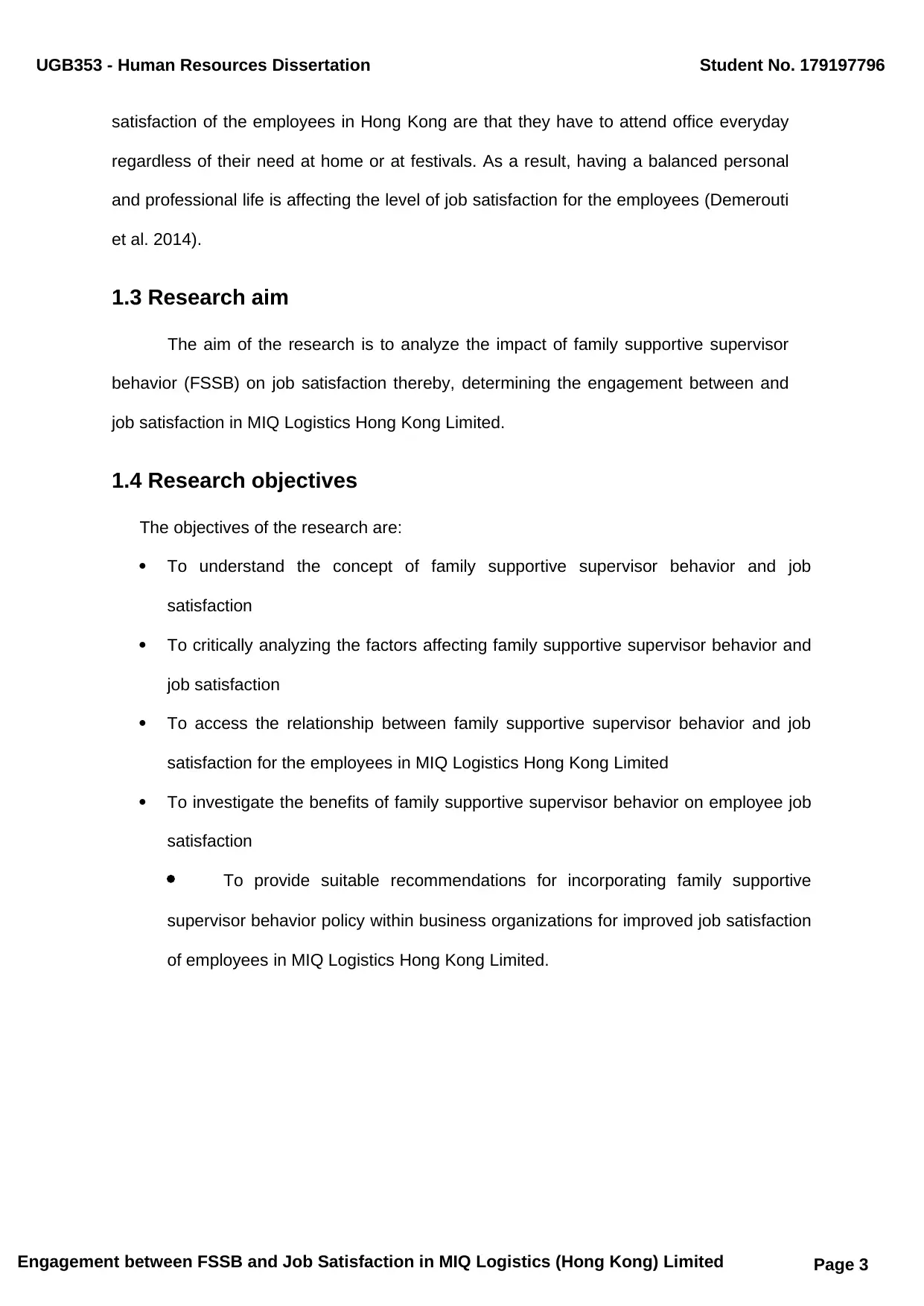
UGB353 - Human Resources Dissertation Student No. 179197796
satisfaction of the employees in Hong Kong are that they have to attend office everyday
regardless of their need at home or at festivals. As a result, having a balanced personal
and professional life is affecting the level of job satisfaction for the employees (Demerouti
et al. 2014).
1.3 Research aim
The aim of the research is to analyze the impact of family supportive supervisor
behavior (FSSB) on job satisfaction thereby, determining the engagement between and
job satisfaction in MIQ Logistics Hong Kong Limited.
1.4 Research objectives
The objectives of the research are:
To understand the concept of family supportive supervisor behavior and job
satisfaction
To critically analyzing the factors affecting family supportive supervisor behavior and
job satisfaction
To access the relationship between family supportive supervisor behavior and job
satisfaction for the employees in MIQ Logistics Hong Kong Limited
To investigate the benefits of family supportive supervisor behavior on employee job
satisfaction
To provide suitable recommendations for incorporating family supportive
supervisor behavior policy within business organizations for improved job satisfaction
of employees in MIQ Logistics Hong Kong Limited.
Engagement between FSSB and Job Satisfaction in MIQ Logistics (Hong Kong) Limited Page 3
satisfaction of the employees in Hong Kong are that they have to attend office everyday
regardless of their need at home or at festivals. As a result, having a balanced personal
and professional life is affecting the level of job satisfaction for the employees (Demerouti
et al. 2014).
1.3 Research aim
The aim of the research is to analyze the impact of family supportive supervisor
behavior (FSSB) on job satisfaction thereby, determining the engagement between and
job satisfaction in MIQ Logistics Hong Kong Limited.
1.4 Research objectives
The objectives of the research are:
To understand the concept of family supportive supervisor behavior and job
satisfaction
To critically analyzing the factors affecting family supportive supervisor behavior and
job satisfaction
To access the relationship between family supportive supervisor behavior and job
satisfaction for the employees in MIQ Logistics Hong Kong Limited
To investigate the benefits of family supportive supervisor behavior on employee job
satisfaction
To provide suitable recommendations for incorporating family supportive
supervisor behavior policy within business organizations for improved job satisfaction
of employees in MIQ Logistics Hong Kong Limited.
Engagement between FSSB and Job Satisfaction in MIQ Logistics (Hong Kong) Limited Page 3
Secure Best Marks with AI Grader
Need help grading? Try our AI Grader for instant feedback on your assignments.
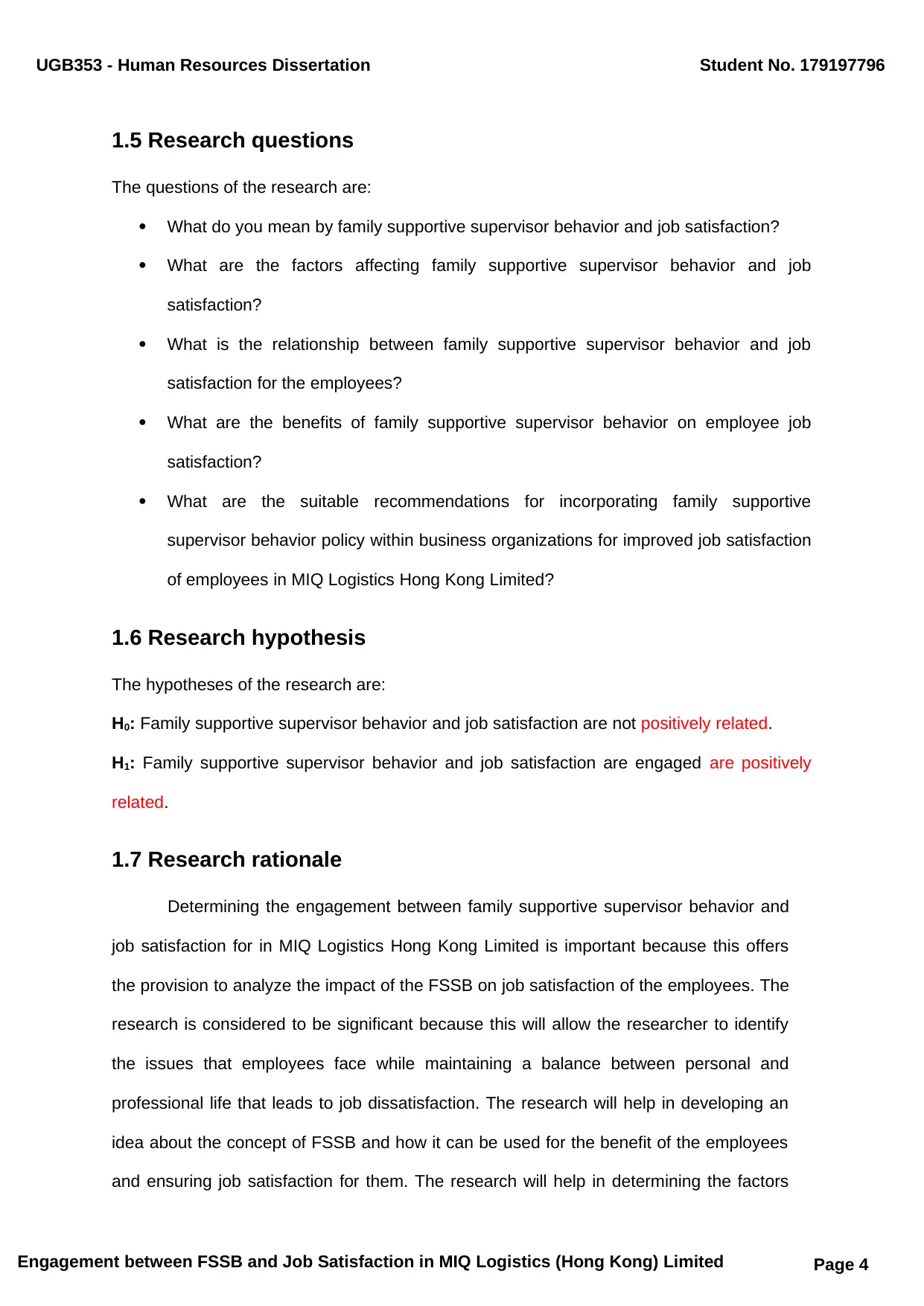
UGB353 - Human Resources Dissertation Student No. 179197796
1.5 Research questions
The questions of the research are:
What do you mean by family supportive supervisor behavior and job satisfaction?
What are the factors affecting family supportive supervisor behavior and job
satisfaction?
What is the relationship between family supportive supervisor behavior and job
satisfaction for the employees?
What are the benefits of family supportive supervisor behavior on employee job
satisfaction?
What are the suitable recommendations for incorporating family supportive
supervisor behavior policy within business organizations for improved job satisfaction
of employees in MIQ Logistics Hong Kong Limited?
1.6 Research hypothesis
The hypotheses of the research are:
H0: Family supportive supervisor behavior and job satisfaction are not positively related.
H1: Family supportive supervisor behavior and job satisfaction are engaged are positively
related.
1.7 Research rationale
Determining the engagement between family supportive supervisor behavior and
job satisfaction for in MIQ Logistics Hong Kong Limited is important because this offers
the provision to analyze the impact of the FSSB on job satisfaction of the employees. The
research is considered to be significant because this will allow the researcher to identify
the issues that employees face while maintaining a balance between personal and
professional life that leads to job dissatisfaction. The research will help in developing an
idea about the concept of FSSB and how it can be used for the benefit of the employees
and ensuring job satisfaction for them. The research will help in determining the factors
Engagement between FSSB and Job Satisfaction in MIQ Logistics (Hong Kong) Limited Page 4
1.5 Research questions
The questions of the research are:
What do you mean by family supportive supervisor behavior and job satisfaction?
What are the factors affecting family supportive supervisor behavior and job
satisfaction?
What is the relationship between family supportive supervisor behavior and job
satisfaction for the employees?
What are the benefits of family supportive supervisor behavior on employee job
satisfaction?
What are the suitable recommendations for incorporating family supportive
supervisor behavior policy within business organizations for improved job satisfaction
of employees in MIQ Logistics Hong Kong Limited?
1.6 Research hypothesis
The hypotheses of the research are:
H0: Family supportive supervisor behavior and job satisfaction are not positively related.
H1: Family supportive supervisor behavior and job satisfaction are engaged are positively
related.
1.7 Research rationale
Determining the engagement between family supportive supervisor behavior and
job satisfaction for in MIQ Logistics Hong Kong Limited is important because this offers
the provision to analyze the impact of the FSSB on job satisfaction of the employees. The
research is considered to be significant because this will allow the researcher to identify
the issues that employees face while maintaining a balance between personal and
professional life that leads to job dissatisfaction. The research will help in developing an
idea about the concept of FSSB and how it can be used for the benefit of the employees
and ensuring job satisfaction for them. The research will help in determining the factors
Engagement between FSSB and Job Satisfaction in MIQ Logistics (Hong Kong) Limited Page 4
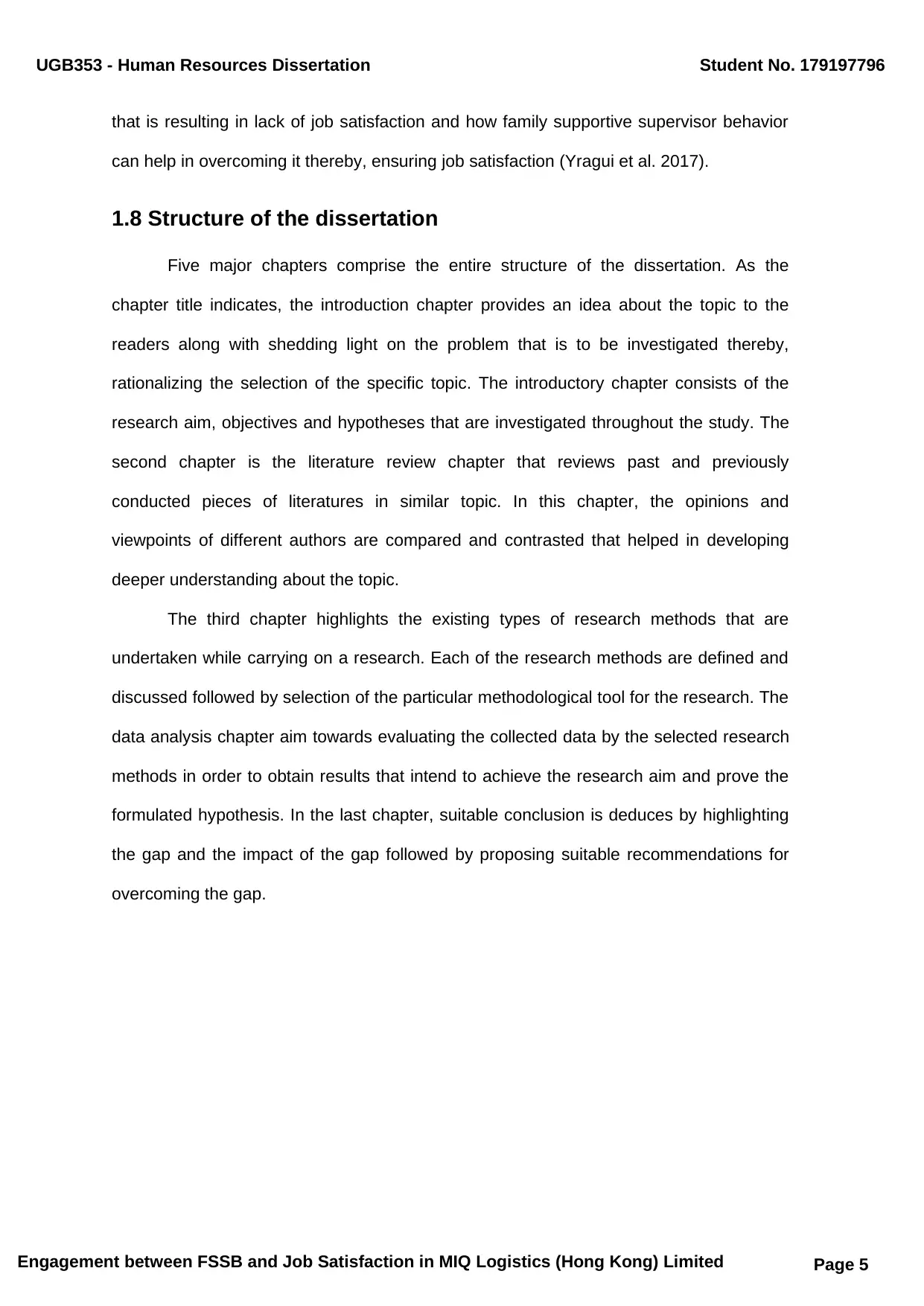
UGB353 - Human Resources Dissertation Student No. 179197796
that is resulting in lack of job satisfaction and how family supportive supervisor behavior
can help in overcoming it thereby, ensuring job satisfaction (Yragui et al. 2017).
1.8 Structure of the dissertation
Five major chapters comprise the entire structure of the dissertation. As the
chapter title indicates, the introduction chapter provides an idea about the topic to the
readers along with shedding light on the problem that is to be investigated thereby,
rationalizing the selection of the specific topic. The introductory chapter consists of the
research aim, objectives and hypotheses that are investigated throughout the study. The
second chapter is the literature review chapter that reviews past and previously
conducted pieces of literatures in similar topic. In this chapter, the opinions and
viewpoints of different authors are compared and contrasted that helped in developing
deeper understanding about the topic.
The third chapter highlights the existing types of research methods that are
undertaken while carrying on a research. Each of the research methods are defined and
discussed followed by selection of the particular methodological tool for the research. The
data analysis chapter aim towards evaluating the collected data by the selected research
methods in order to obtain results that intend to achieve the research aim and prove the
formulated hypothesis. In the last chapter, suitable conclusion is deduces by highlighting
the gap and the impact of the gap followed by proposing suitable recommendations for
overcoming the gap.
Engagement between FSSB and Job Satisfaction in MIQ Logistics (Hong Kong) Limited Page 5
that is resulting in lack of job satisfaction and how family supportive supervisor behavior
can help in overcoming it thereby, ensuring job satisfaction (Yragui et al. 2017).
1.8 Structure of the dissertation
Five major chapters comprise the entire structure of the dissertation. As the
chapter title indicates, the introduction chapter provides an idea about the topic to the
readers along with shedding light on the problem that is to be investigated thereby,
rationalizing the selection of the specific topic. The introductory chapter consists of the
research aim, objectives and hypotheses that are investigated throughout the study. The
second chapter is the literature review chapter that reviews past and previously
conducted pieces of literatures in similar topic. In this chapter, the opinions and
viewpoints of different authors are compared and contrasted that helped in developing
deeper understanding about the topic.
The third chapter highlights the existing types of research methods that are
undertaken while carrying on a research. Each of the research methods are defined and
discussed followed by selection of the particular methodological tool for the research. The
data analysis chapter aim towards evaluating the collected data by the selected research
methods in order to obtain results that intend to achieve the research aim and prove the
formulated hypothesis. In the last chapter, suitable conclusion is deduces by highlighting
the gap and the impact of the gap followed by proposing suitable recommendations for
overcoming the gap.
Engagement between FSSB and Job Satisfaction in MIQ Logistics (Hong Kong) Limited Page 5
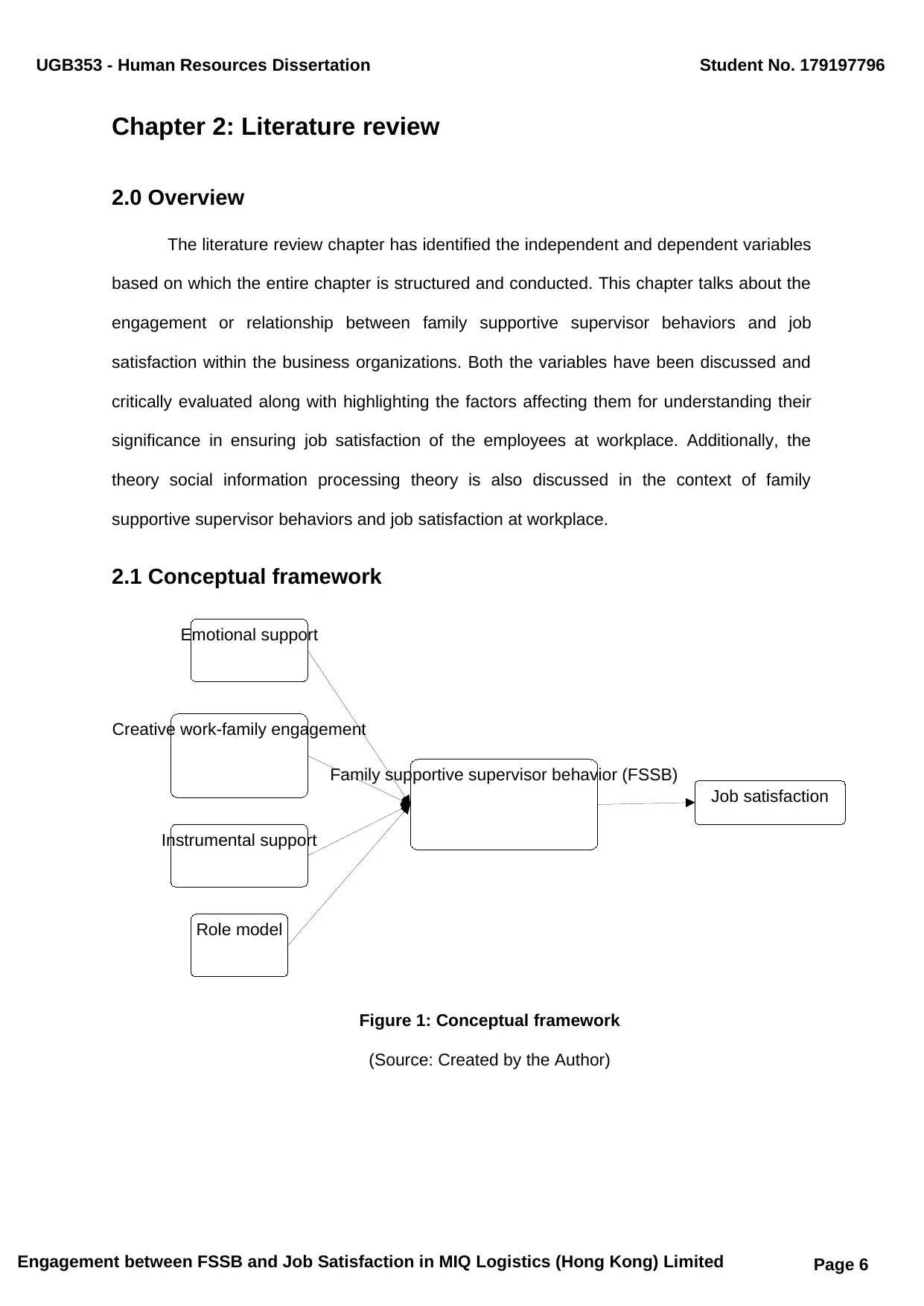
Family supportive supervisor behavior (FSSB)
Emotional support
Creative work-family engagement
Instrumental support
Role model
Job satisfaction
UGB353 - Human Resources Dissertation Student No. 179197796
Chapter 2: Literature review
2.0 Overview
The literature review chapter has identified the independent and dependent variables
based on which the entire chapter is structured and conducted. This chapter talks about the
engagement or relationship between family supportive supervisor behaviors and job
satisfaction within the business organizations. Both the variables have been discussed and
critically evaluated along with highlighting the factors affecting them for understanding their
significance in ensuring job satisfaction of the employees at workplace. Additionally, the
theory social information processing theory is also discussed in the context of family
supportive supervisor behaviors and job satisfaction at workplace.
2.1 Conceptual framework
Figure 1: Conceptual framework
(Source: Created by the Author)
Engagement between FSSB and Job Satisfaction in MIQ Logistics (Hong Kong) Limited Page 6
Emotional support
Creative work-family engagement
Instrumental support
Role model
Job satisfaction
UGB353 - Human Resources Dissertation Student No. 179197796
Chapter 2: Literature review
2.0 Overview
The literature review chapter has identified the independent and dependent variables
based on which the entire chapter is structured and conducted. This chapter talks about the
engagement or relationship between family supportive supervisor behaviors and job
satisfaction within the business organizations. Both the variables have been discussed and
critically evaluated along with highlighting the factors affecting them for understanding their
significance in ensuring job satisfaction of the employees at workplace. Additionally, the
theory social information processing theory is also discussed in the context of family
supportive supervisor behaviors and job satisfaction at workplace.
2.1 Conceptual framework
Figure 1: Conceptual framework
(Source: Created by the Author)
Engagement between FSSB and Job Satisfaction in MIQ Logistics (Hong Kong) Limited Page 6
Paraphrase This Document
Need a fresh take? Get an instant paraphrase of this document with our AI Paraphraser
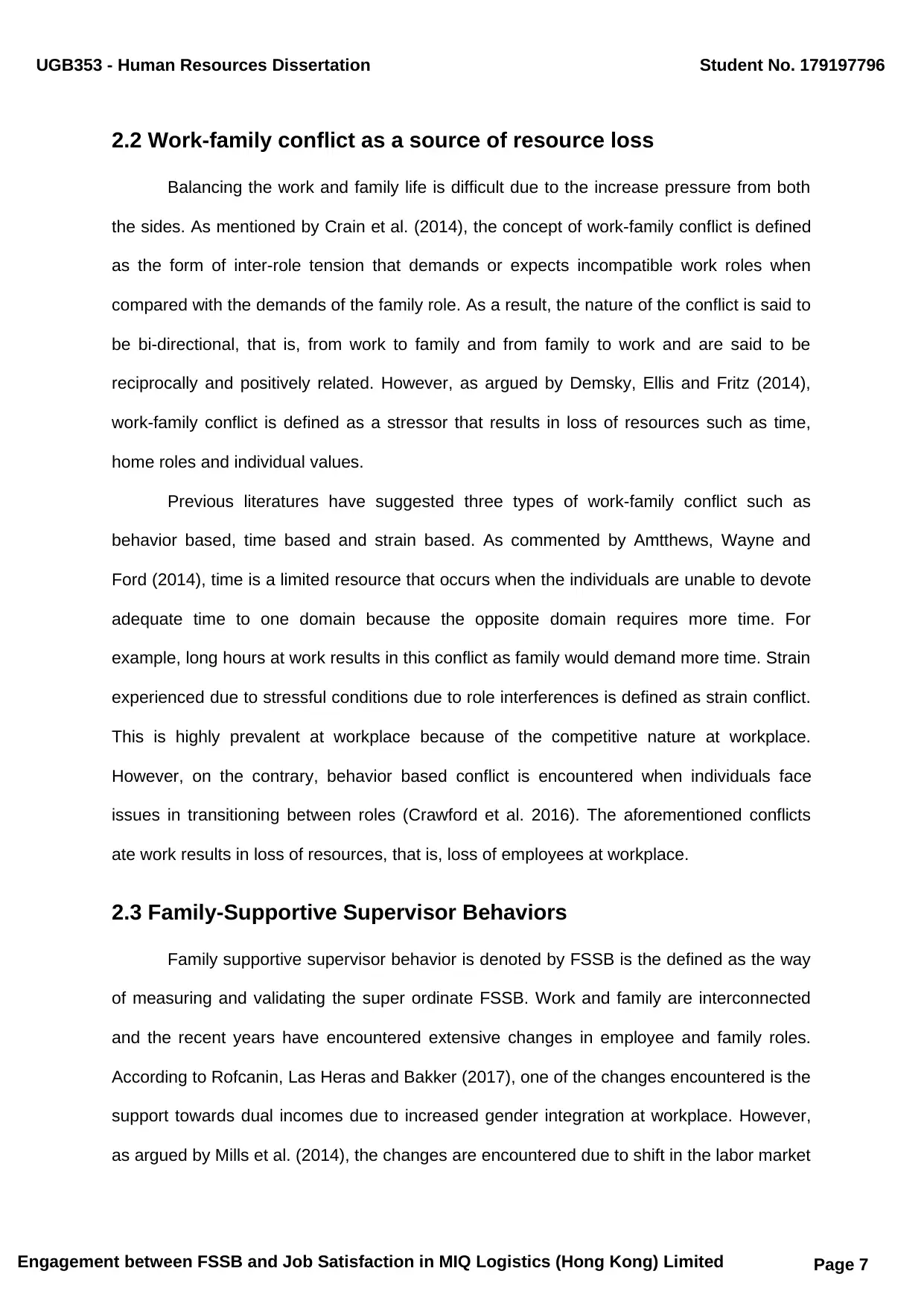
UGB353 - Human Resources Dissertation Student No. 179197796
2.2 Work-family conflict as a source of resource loss
Balancing the work and family life is difficult due to the increase pressure from both
the sides. As mentioned by Crain et al. (2014), the concept of work-family conflict is defined
as the form of inter-role tension that demands or expects incompatible work roles when
compared with the demands of the family role. As a result, the nature of the conflict is said to
be bi-directional, that is, from work to family and from family to work and are said to be
reciprocally and positively related. However, as argued by Demsky, Ellis and Fritz (2014),
work-family conflict is defined as a stressor that results in loss of resources such as time,
home roles and individual values.
Previous literatures have suggested three types of work-family conflict such as
behavior based, time based and strain based. As commented by Amtthews, Wayne and
Ford (2014), time is a limited resource that occurs when the individuals are unable to devote
adequate time to one domain because the opposite domain requires more time. For
example, long hours at work results in this conflict as family would demand more time. Strain
experienced due to stressful conditions due to role interferences is defined as strain conflict.
This is highly prevalent at workplace because of the competitive nature at workplace.
However, on the contrary, behavior based conflict is encountered when individuals face
issues in transitioning between roles (Crawford et al. 2016). The aforementioned conflicts
ate work results in loss of resources, that is, loss of employees at workplace.
2.3 Family-Supportive Supervisor Behaviors
Family supportive supervisor behavior is denoted by FSSB is the defined as the way
of measuring and validating the super ordinate FSSB. Work and family are interconnected
and the recent years have encountered extensive changes in employee and family roles.
According to Rofcanin, Las Heras and Bakker (2017), one of the changes encountered is the
support towards dual incomes due to increased gender integration at workplace. However,
as argued by Mills et al. (2014), the changes are encountered due to shift in the labor market
Engagement between FSSB and Job Satisfaction in MIQ Logistics (Hong Kong) Limited Page 7
2.2 Work-family conflict as a source of resource loss
Balancing the work and family life is difficult due to the increase pressure from both
the sides. As mentioned by Crain et al. (2014), the concept of work-family conflict is defined
as the form of inter-role tension that demands or expects incompatible work roles when
compared with the demands of the family role. As a result, the nature of the conflict is said to
be bi-directional, that is, from work to family and from family to work and are said to be
reciprocally and positively related. However, as argued by Demsky, Ellis and Fritz (2014),
work-family conflict is defined as a stressor that results in loss of resources such as time,
home roles and individual values.
Previous literatures have suggested three types of work-family conflict such as
behavior based, time based and strain based. As commented by Amtthews, Wayne and
Ford (2014), time is a limited resource that occurs when the individuals are unable to devote
adequate time to one domain because the opposite domain requires more time. For
example, long hours at work results in this conflict as family would demand more time. Strain
experienced due to stressful conditions due to role interferences is defined as strain conflict.
This is highly prevalent at workplace because of the competitive nature at workplace.
However, on the contrary, behavior based conflict is encountered when individuals face
issues in transitioning between roles (Crawford et al. 2016). The aforementioned conflicts
ate work results in loss of resources, that is, loss of employees at workplace.
2.3 Family-Supportive Supervisor Behaviors
Family supportive supervisor behavior is denoted by FSSB is the defined as the way
of measuring and validating the super ordinate FSSB. Work and family are interconnected
and the recent years have encountered extensive changes in employee and family roles.
According to Rofcanin, Las Heras and Bakker (2017), one of the changes encountered is the
support towards dual incomes due to increased gender integration at workplace. However,
as argued by Mills et al. (2014), the changes are encountered due to shift in the labor market
Engagement between FSSB and Job Satisfaction in MIQ Logistics (Hong Kong) Limited Page 7
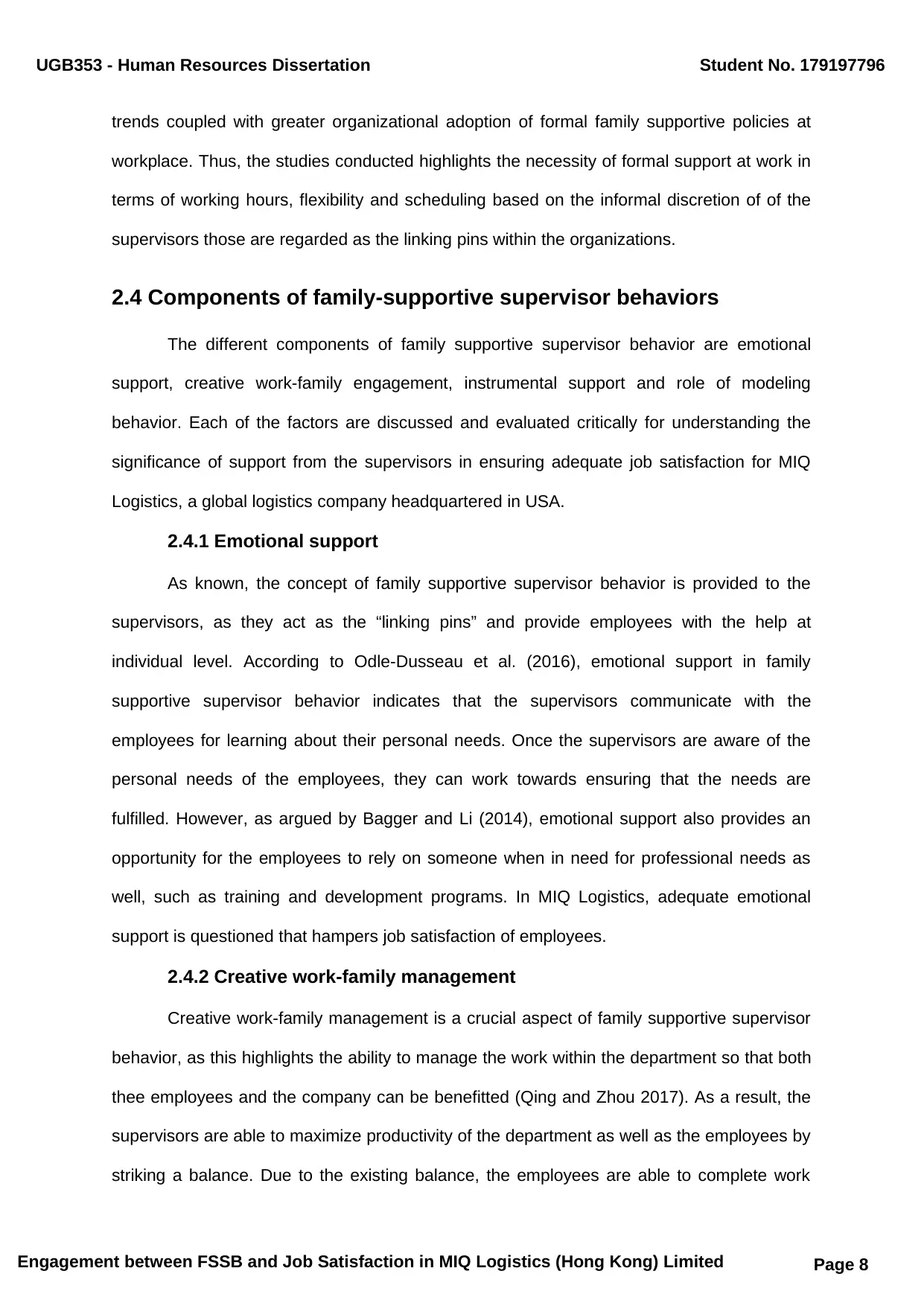
UGB353 - Human Resources Dissertation Student No. 179197796
trends coupled with greater organizational adoption of formal family supportive policies at
workplace. Thus, the studies conducted highlights the necessity of formal support at work in
terms of working hours, flexibility and scheduling based on the informal discretion of of the
supervisors those are regarded as the linking pins within the organizations.
2.4 Components of family-supportive supervisor behaviors
The different components of family supportive supervisor behavior are emotional
support, creative work-family engagement, instrumental support and role of modeling
behavior. Each of the factors are discussed and evaluated critically for understanding the
significance of support from the supervisors in ensuring adequate job satisfaction for MIQ
Logistics, a global logistics company headquartered in USA.
2.4.1 Emotional support
As known, the concept of family supportive supervisor behavior is provided to the
supervisors, as they act as the “linking pins” and provide employees with the help at
individual level. According to Odle-Dusseau et al. (2016), emotional support in family
supportive supervisor behavior indicates that the supervisors communicate with the
employees for learning about their personal needs. Once the supervisors are aware of the
personal needs of the employees, they can work towards ensuring that the needs are
fulfilled. However, as argued by Bagger and Li (2014), emotional support also provides an
opportunity for the employees to rely on someone when in need for professional needs as
well, such as training and development programs. In MIQ Logistics, adequate emotional
support is questioned that hampers job satisfaction of employees.
2.4.2 Creative work-family management
Creative work-family management is a crucial aspect of family supportive supervisor
behavior, as this highlights the ability to manage the work within the department so that both
thee employees and the company can be benefitted (Qing and Zhou 2017). As a result, the
supervisors are able to maximize productivity of the department as well as the employees by
striking a balance. Due to the existing balance, the employees are able to complete work
Engagement between FSSB and Job Satisfaction in MIQ Logistics (Hong Kong) Limited Page 8
trends coupled with greater organizational adoption of formal family supportive policies at
workplace. Thus, the studies conducted highlights the necessity of formal support at work in
terms of working hours, flexibility and scheduling based on the informal discretion of of the
supervisors those are regarded as the linking pins within the organizations.
2.4 Components of family-supportive supervisor behaviors
The different components of family supportive supervisor behavior are emotional
support, creative work-family engagement, instrumental support and role of modeling
behavior. Each of the factors are discussed and evaluated critically for understanding the
significance of support from the supervisors in ensuring adequate job satisfaction for MIQ
Logistics, a global logistics company headquartered in USA.
2.4.1 Emotional support
As known, the concept of family supportive supervisor behavior is provided to the
supervisors, as they act as the “linking pins” and provide employees with the help at
individual level. According to Odle-Dusseau et al. (2016), emotional support in family
supportive supervisor behavior indicates that the supervisors communicate with the
employees for learning about their personal needs. Once the supervisors are aware of the
personal needs of the employees, they can work towards ensuring that the needs are
fulfilled. However, as argued by Bagger and Li (2014), emotional support also provides an
opportunity for the employees to rely on someone when in need for professional needs as
well, such as training and development programs. In MIQ Logistics, adequate emotional
support is questioned that hampers job satisfaction of employees.
2.4.2 Creative work-family management
Creative work-family management is a crucial aspect of family supportive supervisor
behavior, as this highlights the ability to manage the work within the department so that both
thee employees and the company can be benefitted (Qing and Zhou 2017). As a result, the
supervisors are able to maximize productivity of the department as well as the employees by
striking a balance. Due to the existing balance, the employees are able to complete work
Engagement between FSSB and Job Satisfaction in MIQ Logistics (Hong Kong) Limited Page 8
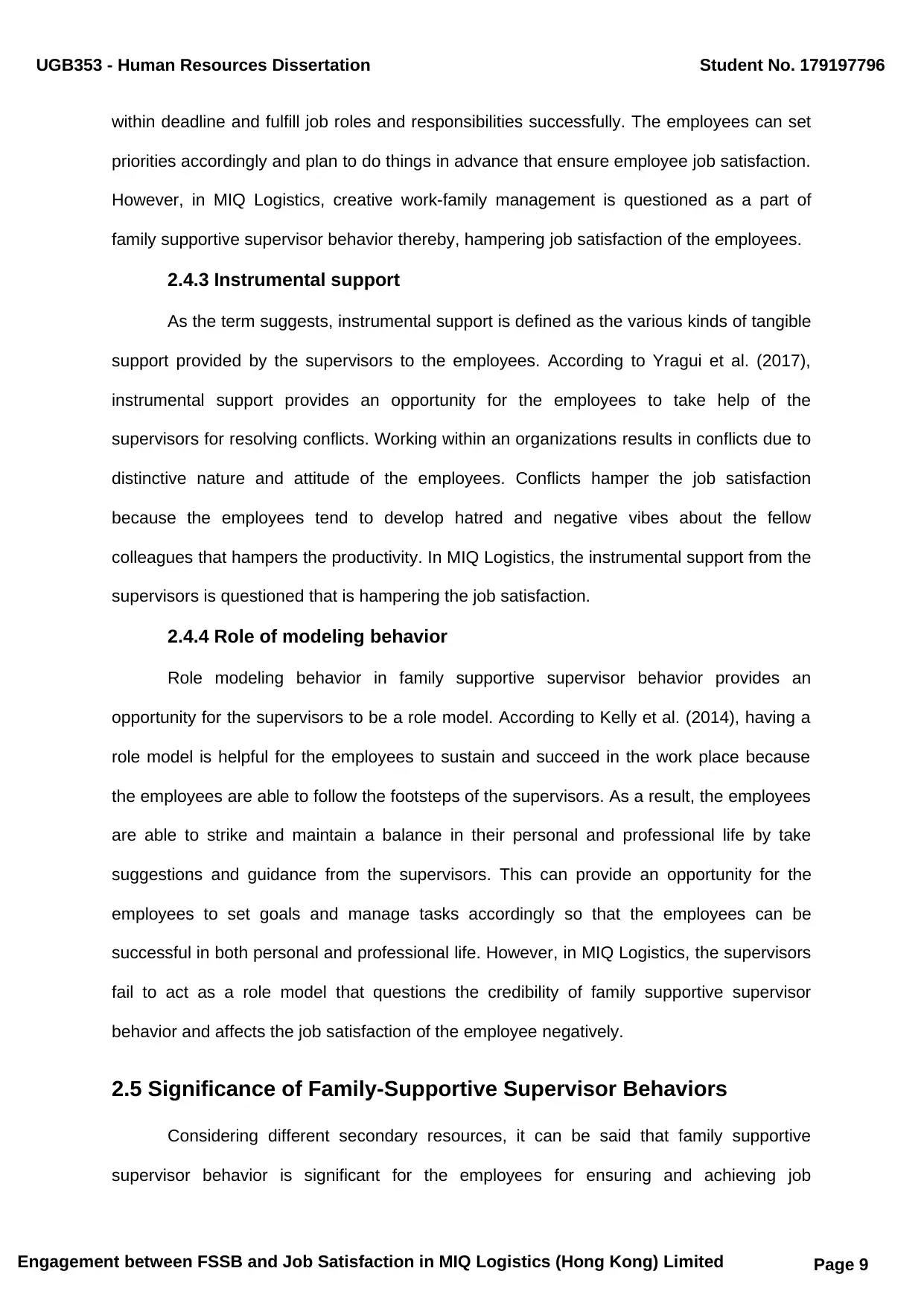
UGB353 - Human Resources Dissertation Student No. 179197796
within deadline and fulfill job roles and responsibilities successfully. The employees can set
priorities accordingly and plan to do things in advance that ensure employee job satisfaction.
However, in MIQ Logistics, creative work-family management is questioned as a part of
family supportive supervisor behavior thereby, hampering job satisfaction of the employees.
2.4.3 Instrumental support
As the term suggests, instrumental support is defined as the various kinds of tangible
support provided by the supervisors to the employees. According to Yragui et al. (2017),
instrumental support provides an opportunity for the employees to take help of the
supervisors for resolving conflicts. Working within an organizations results in conflicts due to
distinctive nature and attitude of the employees. Conflicts hamper the job satisfaction
because the employees tend to develop hatred and negative vibes about the fellow
colleagues that hampers the productivity. In MIQ Logistics, the instrumental support from the
supervisors is questioned that is hampering the job satisfaction.
2.4.4 Role of modeling behavior
Role modeling behavior in family supportive supervisor behavior provides an
opportunity for the supervisors to be a role model. According to Kelly et al. (2014), having a
role model is helpful for the employees to sustain and succeed in the work place because
the employees are able to follow the footsteps of the supervisors. As a result, the employees
are able to strike and maintain a balance in their personal and professional life by take
suggestions and guidance from the supervisors. This can provide an opportunity for the
employees to set goals and manage tasks accordingly so that the employees can be
successful in both personal and professional life. However, in MIQ Logistics, the supervisors
fail to act as a role model that questions the credibility of family supportive supervisor
behavior and affects the job satisfaction of the employee negatively.
2.5 Significance of Family-Supportive Supervisor Behaviors
Considering different secondary resources, it can be said that family supportive
supervisor behavior is significant for the employees for ensuring and achieving job
Engagement between FSSB and Job Satisfaction in MIQ Logistics (Hong Kong) Limited Page 9
within deadline and fulfill job roles and responsibilities successfully. The employees can set
priorities accordingly and plan to do things in advance that ensure employee job satisfaction.
However, in MIQ Logistics, creative work-family management is questioned as a part of
family supportive supervisor behavior thereby, hampering job satisfaction of the employees.
2.4.3 Instrumental support
As the term suggests, instrumental support is defined as the various kinds of tangible
support provided by the supervisors to the employees. According to Yragui et al. (2017),
instrumental support provides an opportunity for the employees to take help of the
supervisors for resolving conflicts. Working within an organizations results in conflicts due to
distinctive nature and attitude of the employees. Conflicts hamper the job satisfaction
because the employees tend to develop hatred and negative vibes about the fellow
colleagues that hampers the productivity. In MIQ Logistics, the instrumental support from the
supervisors is questioned that is hampering the job satisfaction.
2.4.4 Role of modeling behavior
Role modeling behavior in family supportive supervisor behavior provides an
opportunity for the supervisors to be a role model. According to Kelly et al. (2014), having a
role model is helpful for the employees to sustain and succeed in the work place because
the employees are able to follow the footsteps of the supervisors. As a result, the employees
are able to strike and maintain a balance in their personal and professional life by take
suggestions and guidance from the supervisors. This can provide an opportunity for the
employees to set goals and manage tasks accordingly so that the employees can be
successful in both personal and professional life. However, in MIQ Logistics, the supervisors
fail to act as a role model that questions the credibility of family supportive supervisor
behavior and affects the job satisfaction of the employee negatively.
2.5 Significance of Family-Supportive Supervisor Behaviors
Considering different secondary resources, it can be said that family supportive
supervisor behavior is significant for the employees for ensuring and achieving job
Engagement between FSSB and Job Satisfaction in MIQ Logistics (Hong Kong) Limited Page 9
Secure Best Marks with AI Grader
Need help grading? Try our AI Grader for instant feedback on your assignments.
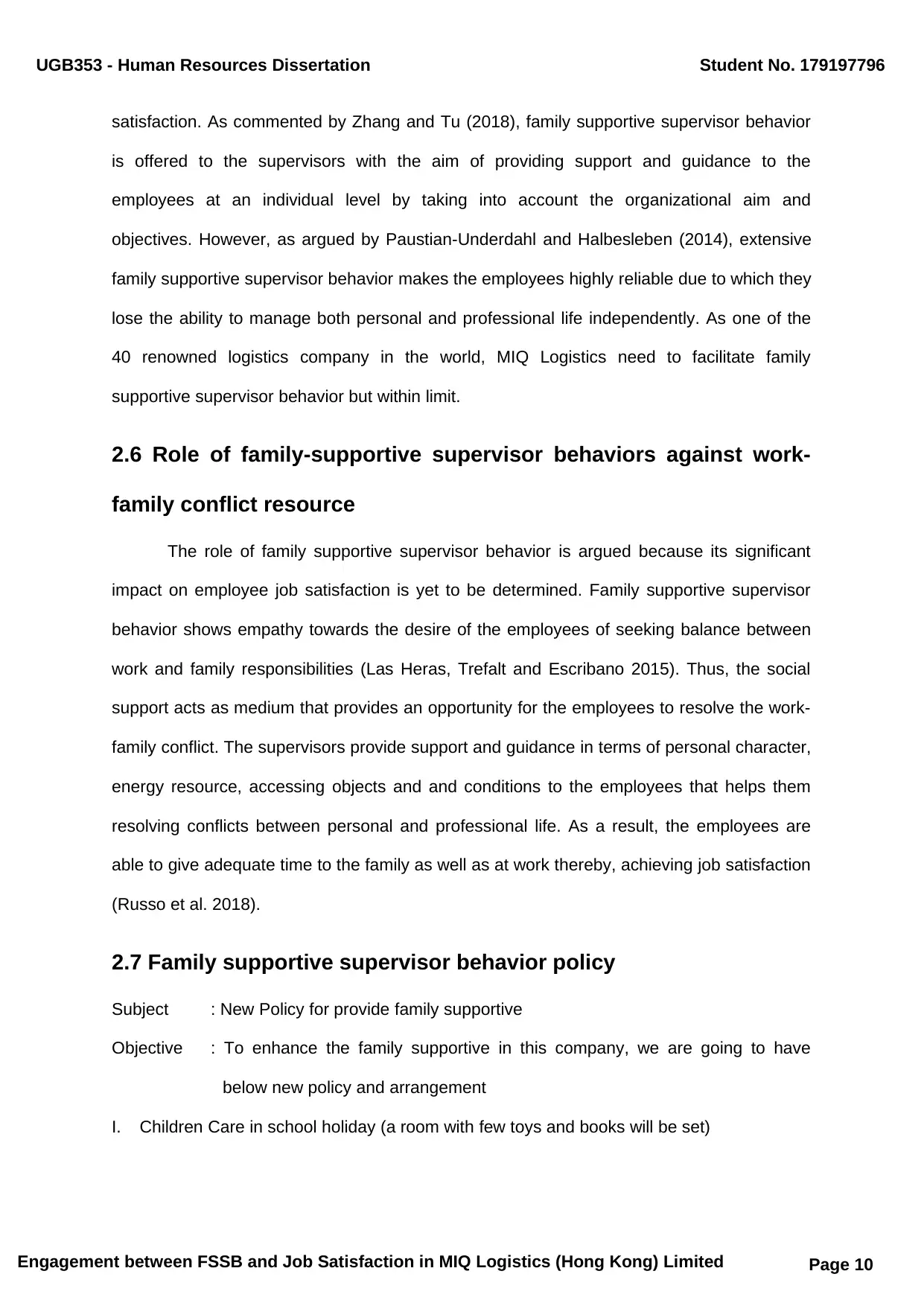
UGB353 - Human Resources Dissertation Student No. 179197796
satisfaction. As commented by Zhang and Tu (2018), family supportive supervisor behavior
is offered to the supervisors with the aim of providing support and guidance to the
employees at an individual level by taking into account the organizational aim and
objectives. However, as argued by Paustian‐Underdahl and Halbesleben (2014), extensive
family supportive supervisor behavior makes the employees highly reliable due to which they
lose the ability to manage both personal and professional life independently. As one of the
40 renowned logistics company in the world, MIQ Logistics need to facilitate family
supportive supervisor behavior but within limit.
2.6 Role of family-supportive supervisor behaviors against work-
family conflict resource
The role of family supportive supervisor behavior is argued because its significant
impact on employee job satisfaction is yet to be determined. Family supportive supervisor
behavior shows empathy towards the desire of the employees of seeking balance between
work and family responsibilities (Las Heras, Trefalt and Escribano 2015). Thus, the social
support acts as medium that provides an opportunity for the employees to resolve the work-
family conflict. The supervisors provide support and guidance in terms of personal character,
energy resource, accessing objects and and conditions to the employees that helps them
resolving conflicts between personal and professional life. As a result, the employees are
able to give adequate time to the family as well as at work thereby, achieving job satisfaction
(Russo et al. 2018).
2.7 Family supportive supervisor behavior policy
Subject : New Policy for provide family supportive
Objective : To enhance the family supportive in this company, we are going to have
below new policy and arrangement
I. Children Care in school holiday (a room with few toys and books will be set)
Engagement between FSSB and Job Satisfaction in MIQ Logistics (Hong Kong) Limited Page 10
satisfaction. As commented by Zhang and Tu (2018), family supportive supervisor behavior
is offered to the supervisors with the aim of providing support and guidance to the
employees at an individual level by taking into account the organizational aim and
objectives. However, as argued by Paustian‐Underdahl and Halbesleben (2014), extensive
family supportive supervisor behavior makes the employees highly reliable due to which they
lose the ability to manage both personal and professional life independently. As one of the
40 renowned logistics company in the world, MIQ Logistics need to facilitate family
supportive supervisor behavior but within limit.
2.6 Role of family-supportive supervisor behaviors against work-
family conflict resource
The role of family supportive supervisor behavior is argued because its significant
impact on employee job satisfaction is yet to be determined. Family supportive supervisor
behavior shows empathy towards the desire of the employees of seeking balance between
work and family responsibilities (Las Heras, Trefalt and Escribano 2015). Thus, the social
support acts as medium that provides an opportunity for the employees to resolve the work-
family conflict. The supervisors provide support and guidance in terms of personal character,
energy resource, accessing objects and and conditions to the employees that helps them
resolving conflicts between personal and professional life. As a result, the employees are
able to give adequate time to the family as well as at work thereby, achieving job satisfaction
(Russo et al. 2018).
2.7 Family supportive supervisor behavior policy
Subject : New Policy for provide family supportive
Objective : To enhance the family supportive in this company, we are going to have
below new policy and arrangement
I. Children Care in school holiday (a room with few toys and books will be set)
Engagement between FSSB and Job Satisfaction in MIQ Logistics (Hong Kong) Limited Page 10
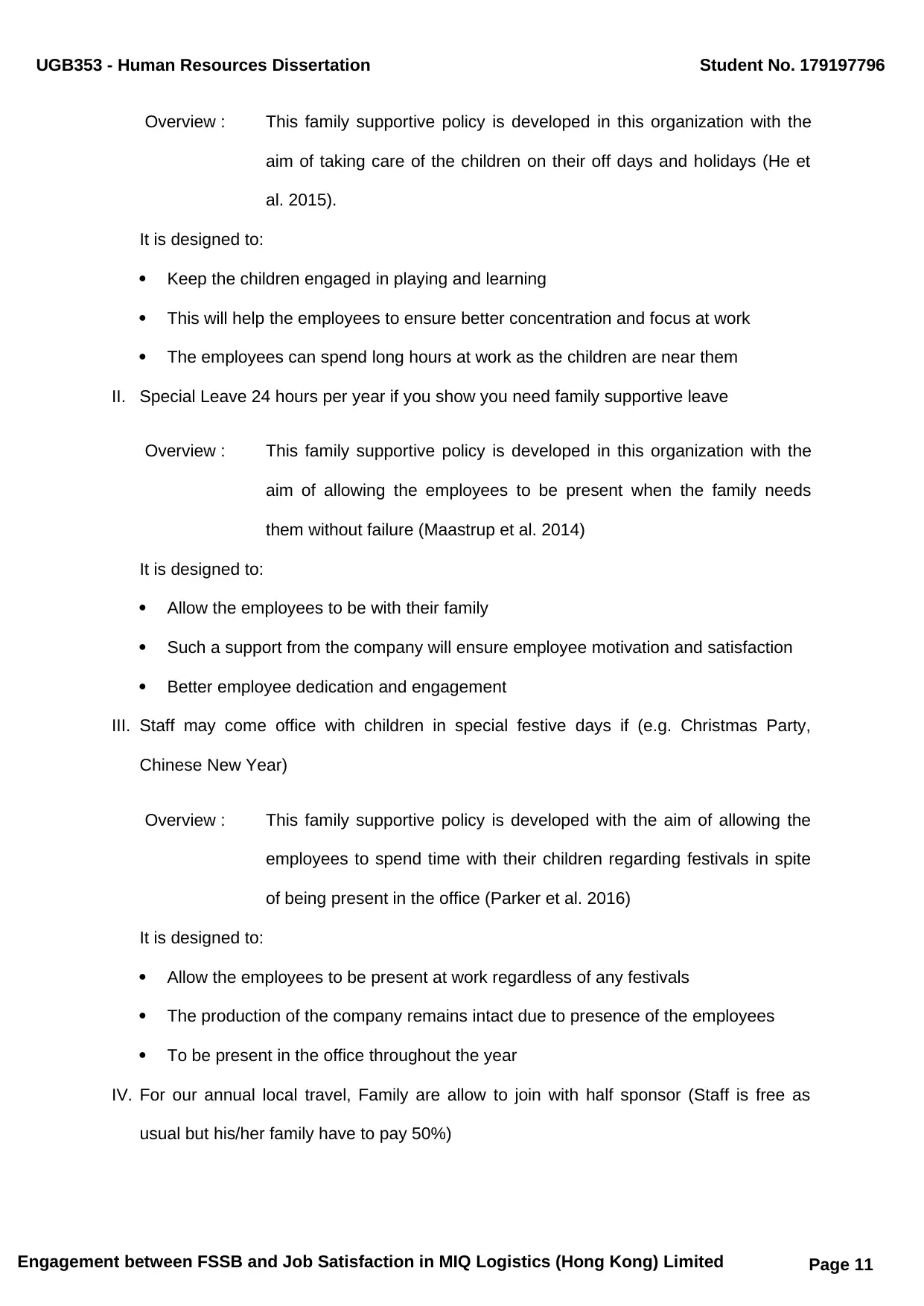
UGB353 - Human Resources Dissertation Student No. 179197796
Overview : This family supportive policy is developed in this organization with the
aim of taking care of the children on their off days and holidays (He et
al. 2015).
It is designed to:
Keep the children engaged in playing and learning
This will help the employees to ensure better concentration and focus at work
The employees can spend long hours at work as the children are near them
II. Special Leave 24 hours per year if you show you need family supportive leave
Overview : This family supportive policy is developed in this organization with the
aim of allowing the employees to be present when the family needs
them without failure (Maastrup et al. 2014)
It is designed to:
Allow the employees to be with their family
Such a support from the company will ensure employee motivation and satisfaction
Better employee dedication and engagement
III. Staff may come office with children in special festive days if (e.g. Christmas Party,
Chinese New Year)
Overview : This family supportive policy is developed with the aim of allowing the
employees to spend time with their children regarding festivals in spite
of being present in the office (Parker et al. 2016)
It is designed to:
Allow the employees to be present at work regardless of any festivals
The production of the company remains intact due to presence of the employees
To be present in the office throughout the year
IV. For our annual local travel, Family are allow to join with half sponsor (Staff is free as
usual but his/her family have to pay 50%)
Engagement between FSSB and Job Satisfaction in MIQ Logistics (Hong Kong) Limited Page 11
Overview : This family supportive policy is developed in this organization with the
aim of taking care of the children on their off days and holidays (He et
al. 2015).
It is designed to:
Keep the children engaged in playing and learning
This will help the employees to ensure better concentration and focus at work
The employees can spend long hours at work as the children are near them
II. Special Leave 24 hours per year if you show you need family supportive leave
Overview : This family supportive policy is developed in this organization with the
aim of allowing the employees to be present when the family needs
them without failure (Maastrup et al. 2014)
It is designed to:
Allow the employees to be with their family
Such a support from the company will ensure employee motivation and satisfaction
Better employee dedication and engagement
III. Staff may come office with children in special festive days if (e.g. Christmas Party,
Chinese New Year)
Overview : This family supportive policy is developed with the aim of allowing the
employees to spend time with their children regarding festivals in spite
of being present in the office (Parker et al. 2016)
It is designed to:
Allow the employees to be present at work regardless of any festivals
The production of the company remains intact due to presence of the employees
To be present in the office throughout the year
IV. For our annual local travel, Family are allow to join with half sponsor (Staff is free as
usual but his/her family have to pay 50%)
Engagement between FSSB and Job Satisfaction in MIQ Logistics (Hong Kong) Limited Page 11
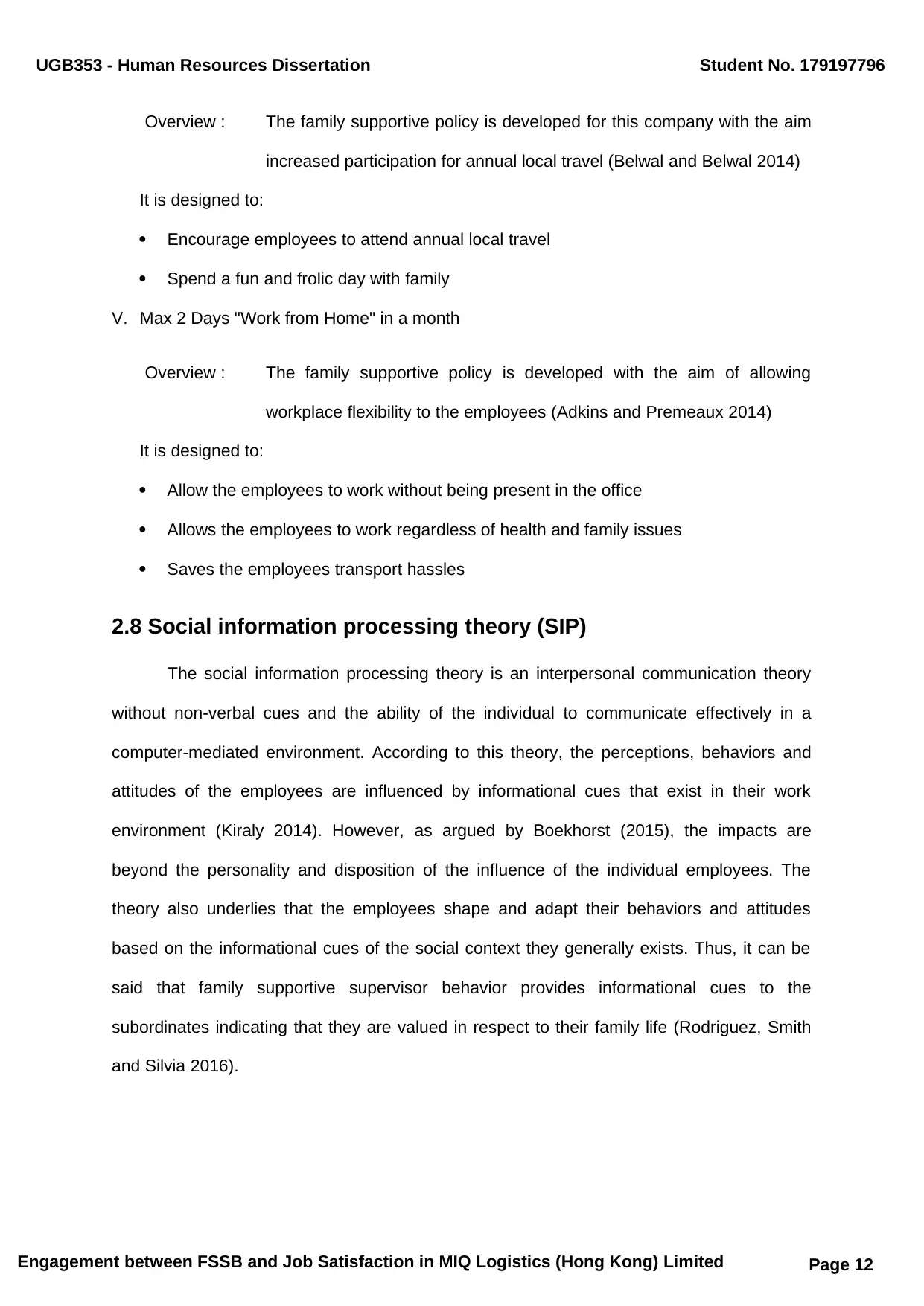
UGB353 - Human Resources Dissertation Student No. 179197796
Overview : The family supportive policy is developed for this company with the aim
increased participation for annual local travel (Belwal and Belwal 2014)
It is designed to:
Encourage employees to attend annual local travel
Spend a fun and frolic day with family
V. Max 2 Days "Work from Home" in a month
Overview : The family supportive policy is developed with the aim of allowing
workplace flexibility to the employees (Adkins and Premeaux 2014)
It is designed to:
Allow the employees to work without being present in the office
Allows the employees to work regardless of health and family issues
Saves the employees transport hassles
2.8 Social information processing theory (SIP)
The social information processing theory is an interpersonal communication theory
without non-verbal cues and the ability of the individual to communicate effectively in a
computer-mediated environment. According to this theory, the perceptions, behaviors and
attitudes of the employees are influenced by informational cues that exist in their work
environment (Kiraly 2014). However, as argued by Boekhorst (2015), the impacts are
beyond the personality and disposition of the influence of the individual employees. The
theory also underlies that the employees shape and adapt their behaviors and attitudes
based on the informational cues of the social context they generally exists. Thus, it can be
said that family supportive supervisor behavior provides informational cues to the
subordinates indicating that they are valued in respect to their family life (Rodriguez, Smith
and Silvia 2016).
Engagement between FSSB and Job Satisfaction in MIQ Logistics (Hong Kong) Limited Page 12
Overview : The family supportive policy is developed for this company with the aim
increased participation for annual local travel (Belwal and Belwal 2014)
It is designed to:
Encourage employees to attend annual local travel
Spend a fun and frolic day with family
V. Max 2 Days "Work from Home" in a month
Overview : The family supportive policy is developed with the aim of allowing
workplace flexibility to the employees (Adkins and Premeaux 2014)
It is designed to:
Allow the employees to work without being present in the office
Allows the employees to work regardless of health and family issues
Saves the employees transport hassles
2.8 Social information processing theory (SIP)
The social information processing theory is an interpersonal communication theory
without non-verbal cues and the ability of the individual to communicate effectively in a
computer-mediated environment. According to this theory, the perceptions, behaviors and
attitudes of the employees are influenced by informational cues that exist in their work
environment (Kiraly 2014). However, as argued by Boekhorst (2015), the impacts are
beyond the personality and disposition of the influence of the individual employees. The
theory also underlies that the employees shape and adapt their behaviors and attitudes
based on the informational cues of the social context they generally exists. Thus, it can be
said that family supportive supervisor behavior provides informational cues to the
subordinates indicating that they are valued in respect to their family life (Rodriguez, Smith
and Silvia 2016).
Engagement between FSSB and Job Satisfaction in MIQ Logistics (Hong Kong) Limited Page 12
Paraphrase This Document
Need a fresh take? Get an instant paraphrase of this document with our AI Paraphraser
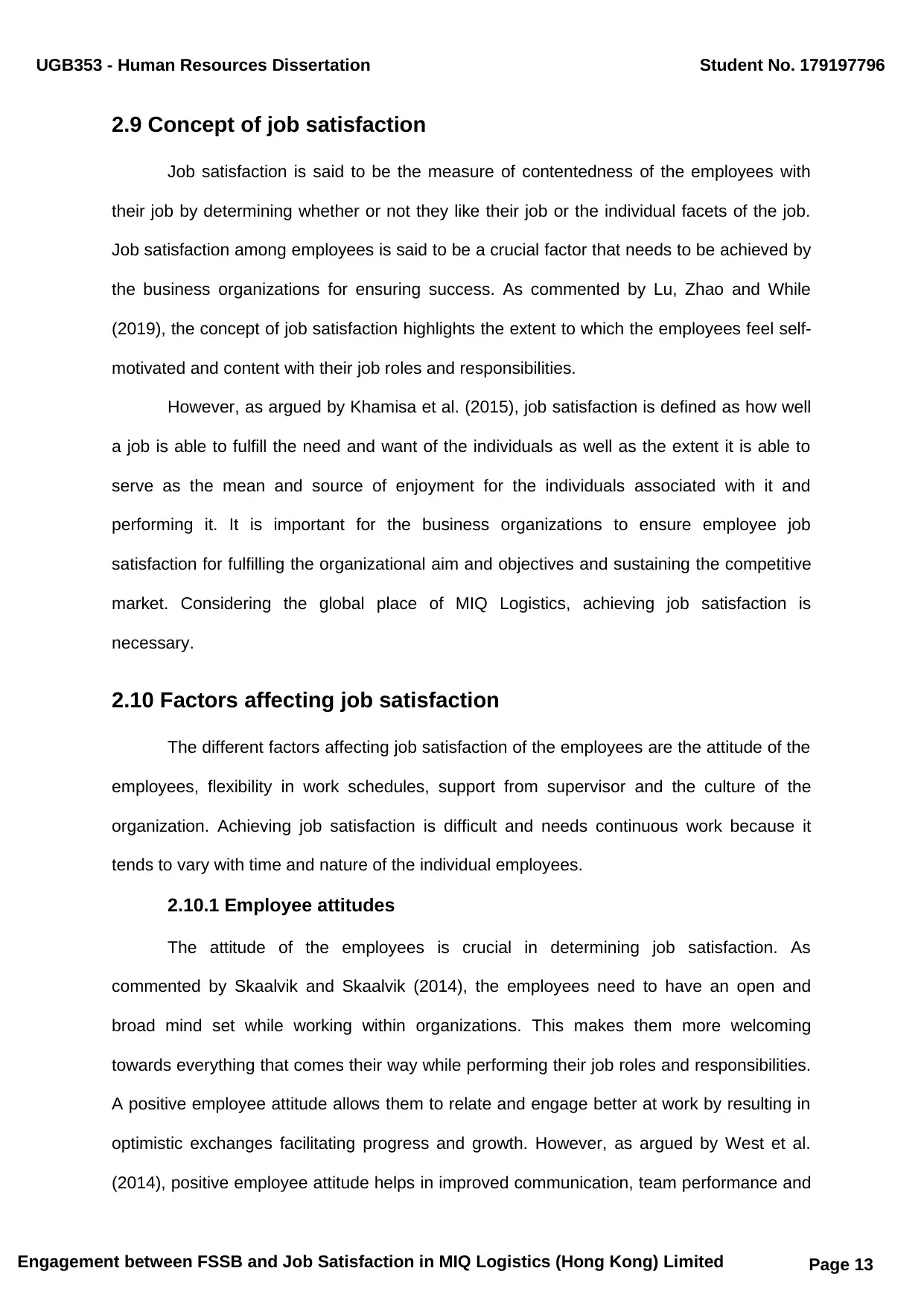
UGB353 - Human Resources Dissertation Student No. 179197796
2.9 Concept of job satisfaction
Job satisfaction is said to be the measure of contentedness of the employees with
their job by determining whether or not they like their job or the individual facets of the job.
Job satisfaction among employees is said to be a crucial factor that needs to be achieved by
the business organizations for ensuring success. As commented by Lu, Zhao and While
(2019), the concept of job satisfaction highlights the extent to which the employees feel self-
motivated and content with their job roles and responsibilities.
However, as argued by Khamisa et al. (2015), job satisfaction is defined as how well
a job is able to fulfill the need and want of the individuals as well as the extent it is able to
serve as the mean and source of enjoyment for the individuals associated with it and
performing it. It is important for the business organizations to ensure employee job
satisfaction for fulfilling the organizational aim and objectives and sustaining the competitive
market. Considering the global place of MIQ Logistics, achieving job satisfaction is
necessary.
2.10 Factors affecting job satisfaction
The different factors affecting job satisfaction of the employees are the attitude of the
employees, flexibility in work schedules, support from supervisor and the culture of the
organization. Achieving job satisfaction is difficult and needs continuous work because it
tends to vary with time and nature of the individual employees.
2.10.1 Employee attitudes
The attitude of the employees is crucial in determining job satisfaction. As
commented by Skaalvik and Skaalvik (2014), the employees need to have an open and
broad mind set while working within organizations. This makes them more welcoming
towards everything that comes their way while performing their job roles and responsibilities.
A positive employee attitude allows them to relate and engage better at work by resulting in
optimistic exchanges facilitating progress and growth. However, as argued by West et al.
(2014), positive employee attitude helps in improved communication, team performance and
Engagement between FSSB and Job Satisfaction in MIQ Logistics (Hong Kong) Limited Page 13
2.9 Concept of job satisfaction
Job satisfaction is said to be the measure of contentedness of the employees with
their job by determining whether or not they like their job or the individual facets of the job.
Job satisfaction among employees is said to be a crucial factor that needs to be achieved by
the business organizations for ensuring success. As commented by Lu, Zhao and While
(2019), the concept of job satisfaction highlights the extent to which the employees feel self-
motivated and content with their job roles and responsibilities.
However, as argued by Khamisa et al. (2015), job satisfaction is defined as how well
a job is able to fulfill the need and want of the individuals as well as the extent it is able to
serve as the mean and source of enjoyment for the individuals associated with it and
performing it. It is important for the business organizations to ensure employee job
satisfaction for fulfilling the organizational aim and objectives and sustaining the competitive
market. Considering the global place of MIQ Logistics, achieving job satisfaction is
necessary.
2.10 Factors affecting job satisfaction
The different factors affecting job satisfaction of the employees are the attitude of the
employees, flexibility in work schedules, support from supervisor and the culture of the
organization. Achieving job satisfaction is difficult and needs continuous work because it
tends to vary with time and nature of the individual employees.
2.10.1 Employee attitudes
The attitude of the employees is crucial in determining job satisfaction. As
commented by Skaalvik and Skaalvik (2014), the employees need to have an open and
broad mind set while working within organizations. This makes them more welcoming
towards everything that comes their way while performing their job roles and responsibilities.
A positive employee attitude allows them to relate and engage better at work by resulting in
optimistic exchanges facilitating progress and growth. However, as argued by West et al.
(2014), positive employee attitude helps in improved communication, team performance and
Engagement between FSSB and Job Satisfaction in MIQ Logistics (Hong Kong) Limited Page 13
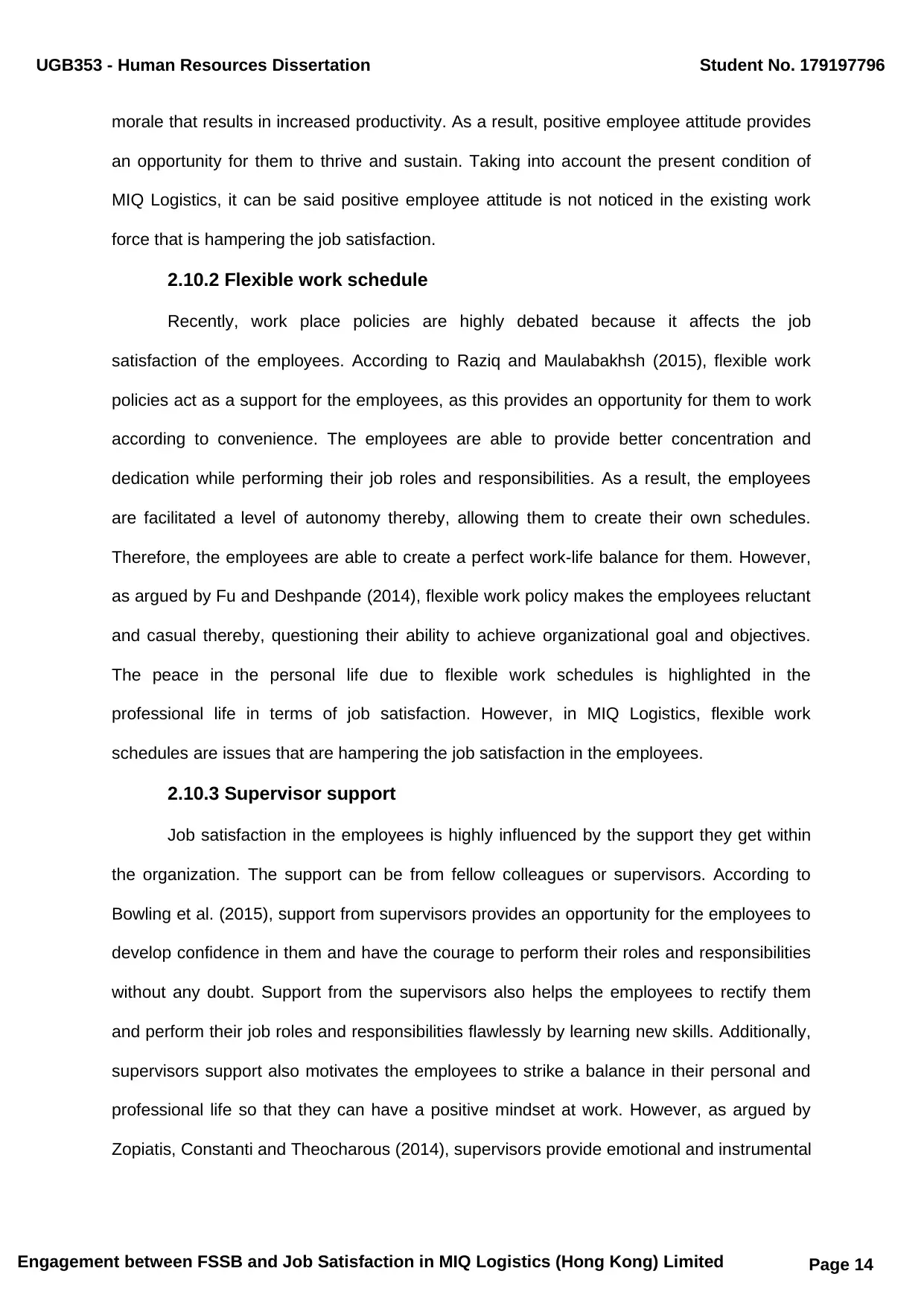
UGB353 - Human Resources Dissertation Student No. 179197796
morale that results in increased productivity. As a result, positive employee attitude provides
an opportunity for them to thrive and sustain. Taking into account the present condition of
MIQ Logistics, it can be said positive employee attitude is not noticed in the existing work
force that is hampering the job satisfaction.
2.10.2 Flexible work schedule
Recently, work place policies are highly debated because it affects the job
satisfaction of the employees. According to Raziq and Maulabakhsh (2015), flexible work
policies act as a support for the employees, as this provides an opportunity for them to work
according to convenience. The employees are able to provide better concentration and
dedication while performing their job roles and responsibilities. As a result, the employees
are facilitated a level of autonomy thereby, allowing them to create their own schedules.
Therefore, the employees are able to create a perfect work-life balance for them. However,
as argued by Fu and Deshpande (2014), flexible work policy makes the employees reluctant
and casual thereby, questioning their ability to achieve organizational goal and objectives.
The peace in the personal life due to flexible work schedules is highlighted in the
professional life in terms of job satisfaction. However, in MIQ Logistics, flexible work
schedules are issues that are hampering the job satisfaction in the employees.
2.10.3 Supervisor support
Job satisfaction in the employees is highly influenced by the support they get within
the organization. The support can be from fellow colleagues or supervisors. According to
Bowling et al. (2015), support from supervisors provides an opportunity for the employees to
develop confidence in them and have the courage to perform their roles and responsibilities
without any doubt. Support from the supervisors also helps the employees to rectify them
and perform their job roles and responsibilities flawlessly by learning new skills. Additionally,
supervisors support also motivates the employees to strike a balance in their personal and
professional life so that they can have a positive mindset at work. However, as argued by
Zopiatis, Constanti and Theocharous (2014), supervisors provide emotional and instrumental
Engagement between FSSB and Job Satisfaction in MIQ Logistics (Hong Kong) Limited Page 14
morale that results in increased productivity. As a result, positive employee attitude provides
an opportunity for them to thrive and sustain. Taking into account the present condition of
MIQ Logistics, it can be said positive employee attitude is not noticed in the existing work
force that is hampering the job satisfaction.
2.10.2 Flexible work schedule
Recently, work place policies are highly debated because it affects the job
satisfaction of the employees. According to Raziq and Maulabakhsh (2015), flexible work
policies act as a support for the employees, as this provides an opportunity for them to work
according to convenience. The employees are able to provide better concentration and
dedication while performing their job roles and responsibilities. As a result, the employees
are facilitated a level of autonomy thereby, allowing them to create their own schedules.
Therefore, the employees are able to create a perfect work-life balance for them. However,
as argued by Fu and Deshpande (2014), flexible work policy makes the employees reluctant
and casual thereby, questioning their ability to achieve organizational goal and objectives.
The peace in the personal life due to flexible work schedules is highlighted in the
professional life in terms of job satisfaction. However, in MIQ Logistics, flexible work
schedules are issues that are hampering the job satisfaction in the employees.
2.10.3 Supervisor support
Job satisfaction in the employees is highly influenced by the support they get within
the organization. The support can be from fellow colleagues or supervisors. According to
Bowling et al. (2015), support from supervisors provides an opportunity for the employees to
develop confidence in them and have the courage to perform their roles and responsibilities
without any doubt. Support from the supervisors also helps the employees to rectify them
and perform their job roles and responsibilities flawlessly by learning new skills. Additionally,
supervisors support also motivates the employees to strike a balance in their personal and
professional life so that they can have a positive mindset at work. However, as argued by
Zopiatis, Constanti and Theocharous (2014), supervisors provide emotional and instrumental
Engagement between FSSB and Job Satisfaction in MIQ Logistics (Hong Kong) Limited Page 14
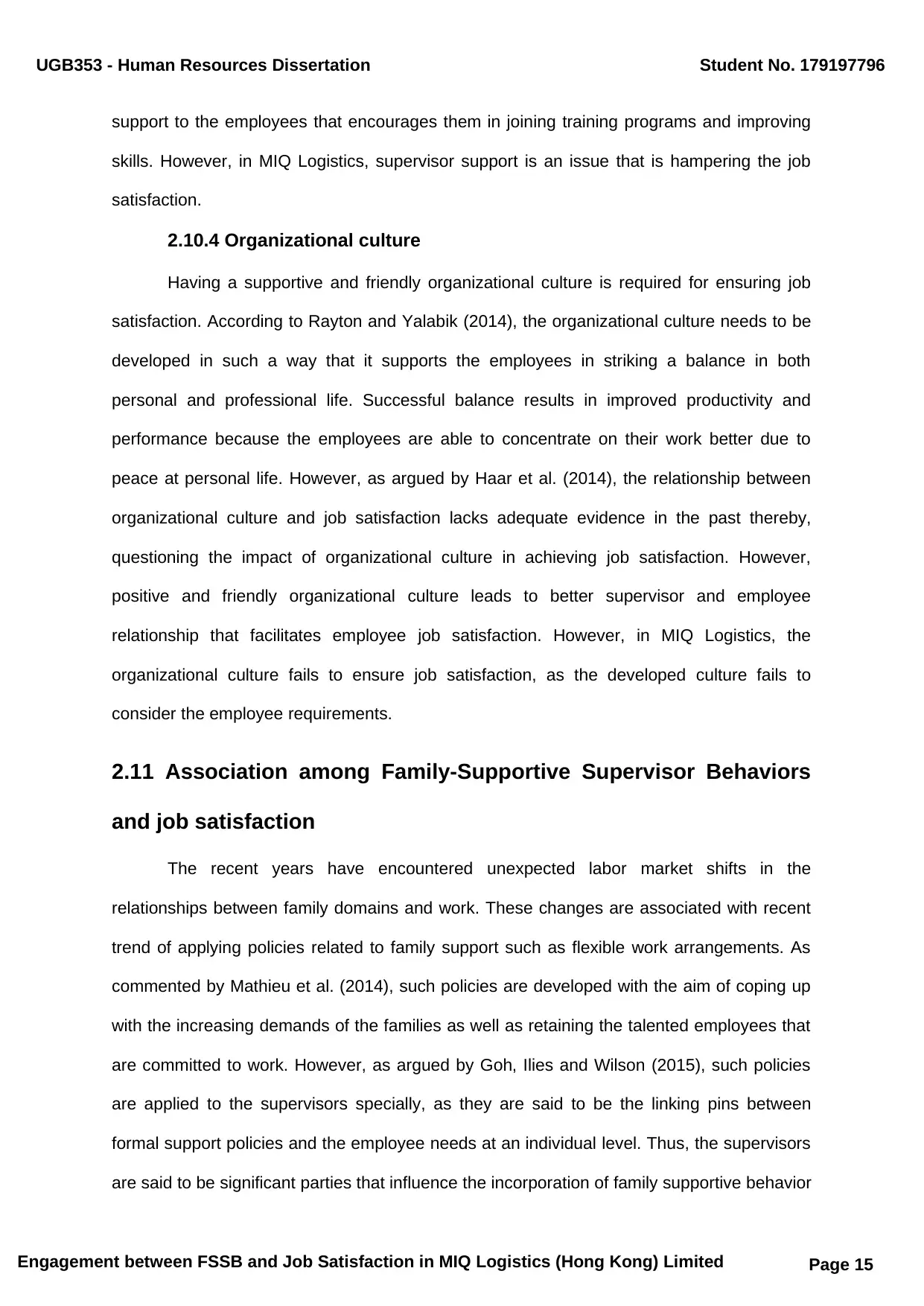
UGB353 - Human Resources Dissertation Student No. 179197796
support to the employees that encourages them in joining training programs and improving
skills. However, in MIQ Logistics, supervisor support is an issue that is hampering the job
satisfaction.
2.10.4 Organizational culture
Having a supportive and friendly organizational culture is required for ensuring job
satisfaction. According to Rayton and Yalabik (2014), the organizational culture needs to be
developed in such a way that it supports the employees in striking a balance in both
personal and professional life. Successful balance results in improved productivity and
performance because the employees are able to concentrate on their work better due to
peace at personal life. However, as argued by Haar et al. (2014), the relationship between
organizational culture and job satisfaction lacks adequate evidence in the past thereby,
questioning the impact of organizational culture in achieving job satisfaction. However,
positive and friendly organizational culture leads to better supervisor and employee
relationship that facilitates employee job satisfaction. However, in MIQ Logistics, the
organizational culture fails to ensure job satisfaction, as the developed culture fails to
consider the employee requirements.
2.11 Association among Family-Supportive Supervisor Behaviors
and job satisfaction
The recent years have encountered unexpected labor market shifts in the
relationships between family domains and work. These changes are associated with recent
trend of applying policies related to family support such as flexible work arrangements. As
commented by Mathieu et al. (2014), such policies are developed with the aim of coping up
with the increasing demands of the families as well as retaining the talented employees that
are committed to work. However, as argued by Goh, Ilies and Wilson (2015), such policies
are applied to the supervisors specially, as they are said to be the linking pins between
formal support policies and the employee needs at an individual level. Thus, the supervisors
are said to be significant parties that influence the incorporation of family supportive behavior
Engagement between FSSB and Job Satisfaction in MIQ Logistics (Hong Kong) Limited Page 15
support to the employees that encourages them in joining training programs and improving
skills. However, in MIQ Logistics, supervisor support is an issue that is hampering the job
satisfaction.
2.10.4 Organizational culture
Having a supportive and friendly organizational culture is required for ensuring job
satisfaction. According to Rayton and Yalabik (2014), the organizational culture needs to be
developed in such a way that it supports the employees in striking a balance in both
personal and professional life. Successful balance results in improved productivity and
performance because the employees are able to concentrate on their work better due to
peace at personal life. However, as argued by Haar et al. (2014), the relationship between
organizational culture and job satisfaction lacks adequate evidence in the past thereby,
questioning the impact of organizational culture in achieving job satisfaction. However,
positive and friendly organizational culture leads to better supervisor and employee
relationship that facilitates employee job satisfaction. However, in MIQ Logistics, the
organizational culture fails to ensure job satisfaction, as the developed culture fails to
consider the employee requirements.
2.11 Association among Family-Supportive Supervisor Behaviors
and job satisfaction
The recent years have encountered unexpected labor market shifts in the
relationships between family domains and work. These changes are associated with recent
trend of applying policies related to family support such as flexible work arrangements. As
commented by Mathieu et al. (2014), such policies are developed with the aim of coping up
with the increasing demands of the families as well as retaining the talented employees that
are committed to work. However, as argued by Goh, Ilies and Wilson (2015), such policies
are applied to the supervisors specially, as they are said to be the linking pins between
formal support policies and the employee needs at an individual level. Thus, the supervisors
are said to be significant parties that influence the incorporation of family supportive behavior
Engagement between FSSB and Job Satisfaction in MIQ Logistics (Hong Kong) Limited Page 15
Secure Best Marks with AI Grader
Need help grading? Try our AI Grader for instant feedback on your assignments.
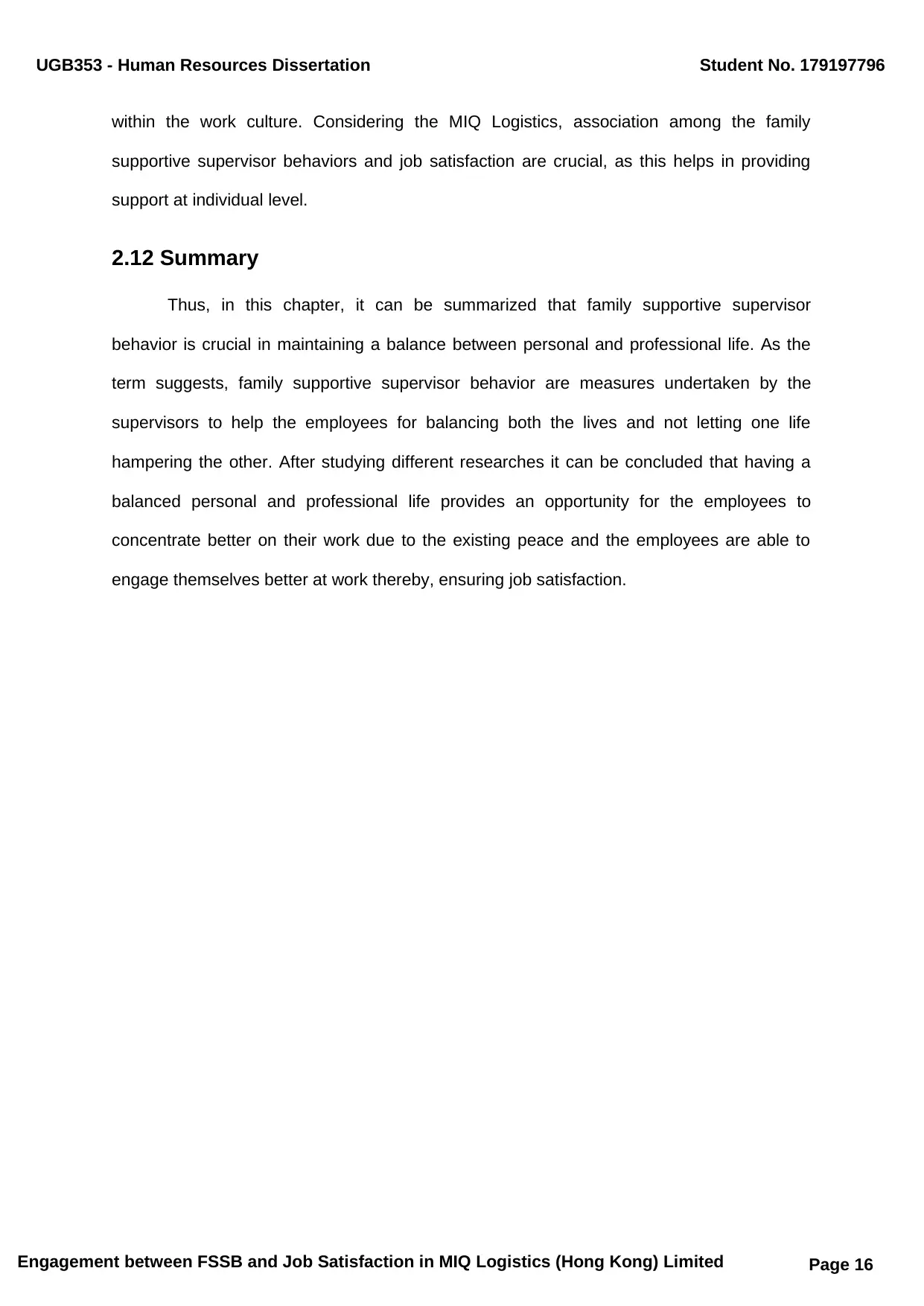
UGB353 - Human Resources Dissertation Student No. 179197796
within the work culture. Considering the MIQ Logistics, association among the family
supportive supervisor behaviors and job satisfaction are crucial, as this helps in providing
support at individual level.
2.12 Summary
Thus, in this chapter, it can be summarized that family supportive supervisor
behavior is crucial in maintaining a balance between personal and professional life. As the
term suggests, family supportive supervisor behavior are measures undertaken by the
supervisors to help the employees for balancing both the lives and not letting one life
hampering the other. After studying different researches it can be concluded that having a
balanced personal and professional life provides an opportunity for the employees to
concentrate better on their work due to the existing peace and the employees are able to
engage themselves better at work thereby, ensuring job satisfaction.
Engagement between FSSB and Job Satisfaction in MIQ Logistics (Hong Kong) Limited Page 16
within the work culture. Considering the MIQ Logistics, association among the family
supportive supervisor behaviors and job satisfaction are crucial, as this helps in providing
support at individual level.
2.12 Summary
Thus, in this chapter, it can be summarized that family supportive supervisor
behavior is crucial in maintaining a balance between personal and professional life. As the
term suggests, family supportive supervisor behavior are measures undertaken by the
supervisors to help the employees for balancing both the lives and not letting one life
hampering the other. After studying different researches it can be concluded that having a
balanced personal and professional life provides an opportunity for the employees to
concentrate better on their work due to the existing peace and the employees are able to
engage themselves better at work thereby, ensuring job satisfaction.
Engagement between FSSB and Job Satisfaction in MIQ Logistics (Hong Kong) Limited Page 16
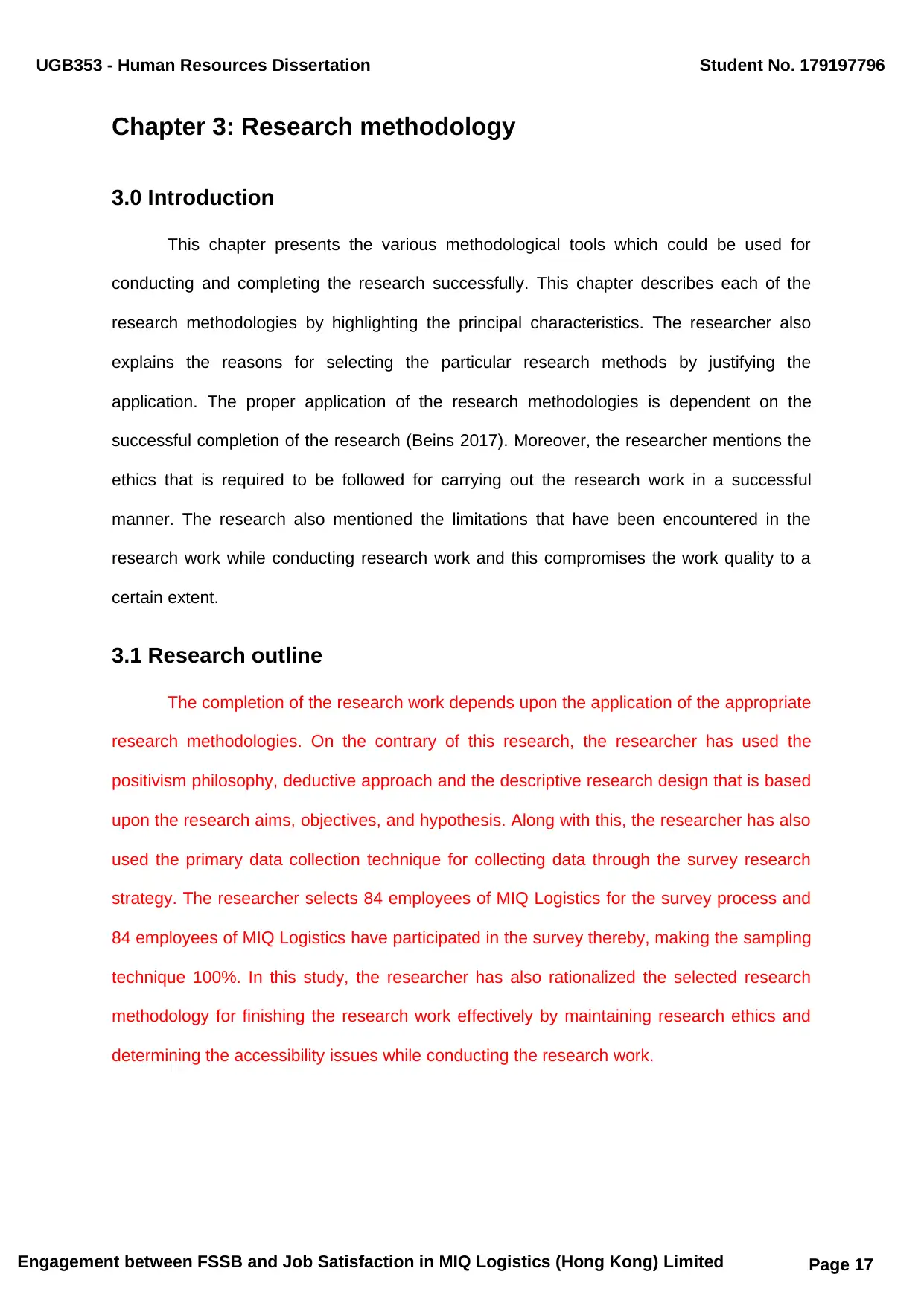
UGB353 - Human Resources Dissertation Student No. 179197796
Chapter 3: Research methodology
3.0 Introduction
This chapter presents the various methodological tools which could be used for
conducting and completing the research successfully. This chapter describes each of the
research methodologies by highlighting the principal characteristics. The researcher also
explains the reasons for selecting the particular research methods by justifying the
application. The proper application of the research methodologies is dependent on the
successful completion of the research (Beins 2017). Moreover, the researcher mentions the
ethics that is required to be followed for carrying out the research work in a successful
manner. The research also mentioned the limitations that have been encountered in the
research work while conducting research work and this compromises the work quality to a
certain extent.
3.1 Research outline
The completion of the research work depends upon the application of the appropriate
research methodologies. On the contrary of this research, the researcher has used the
positivism philosophy, deductive approach and the descriptive research design that is based
upon the research aims, objectives, and hypothesis. Along with this, the researcher has also
used the primary data collection technique for collecting data through the survey research
strategy. The researcher selects 84 employees of MIQ Logistics for the survey process and
84 employees of MIQ Logistics have participated in the survey thereby, making the sampling
technique 100%. In this study, the researcher has also rationalized the selected research
methodology for finishing the research work effectively by maintaining research ethics and
determining the accessibility issues while conducting the research work.
Engagement between FSSB and Job Satisfaction in MIQ Logistics (Hong Kong) Limited Page 17
Chapter 3: Research methodology
3.0 Introduction
This chapter presents the various methodological tools which could be used for
conducting and completing the research successfully. This chapter describes each of the
research methodologies by highlighting the principal characteristics. The researcher also
explains the reasons for selecting the particular research methods by justifying the
application. The proper application of the research methodologies is dependent on the
successful completion of the research (Beins 2017). Moreover, the researcher mentions the
ethics that is required to be followed for carrying out the research work in a successful
manner. The research also mentioned the limitations that have been encountered in the
research work while conducting research work and this compromises the work quality to a
certain extent.
3.1 Research outline
The completion of the research work depends upon the application of the appropriate
research methodologies. On the contrary of this research, the researcher has used the
positivism philosophy, deductive approach and the descriptive research design that is based
upon the research aims, objectives, and hypothesis. Along with this, the researcher has also
used the primary data collection technique for collecting data through the survey research
strategy. The researcher selects 84 employees of MIQ Logistics for the survey process and
84 employees of MIQ Logistics have participated in the survey thereby, making the sampling
technique 100%. In this study, the researcher has also rationalized the selected research
methodology for finishing the research work effectively by maintaining research ethics and
determining the accessibility issues while conducting the research work.
Engagement between FSSB and Job Satisfaction in MIQ Logistics (Hong Kong) Limited Page 17
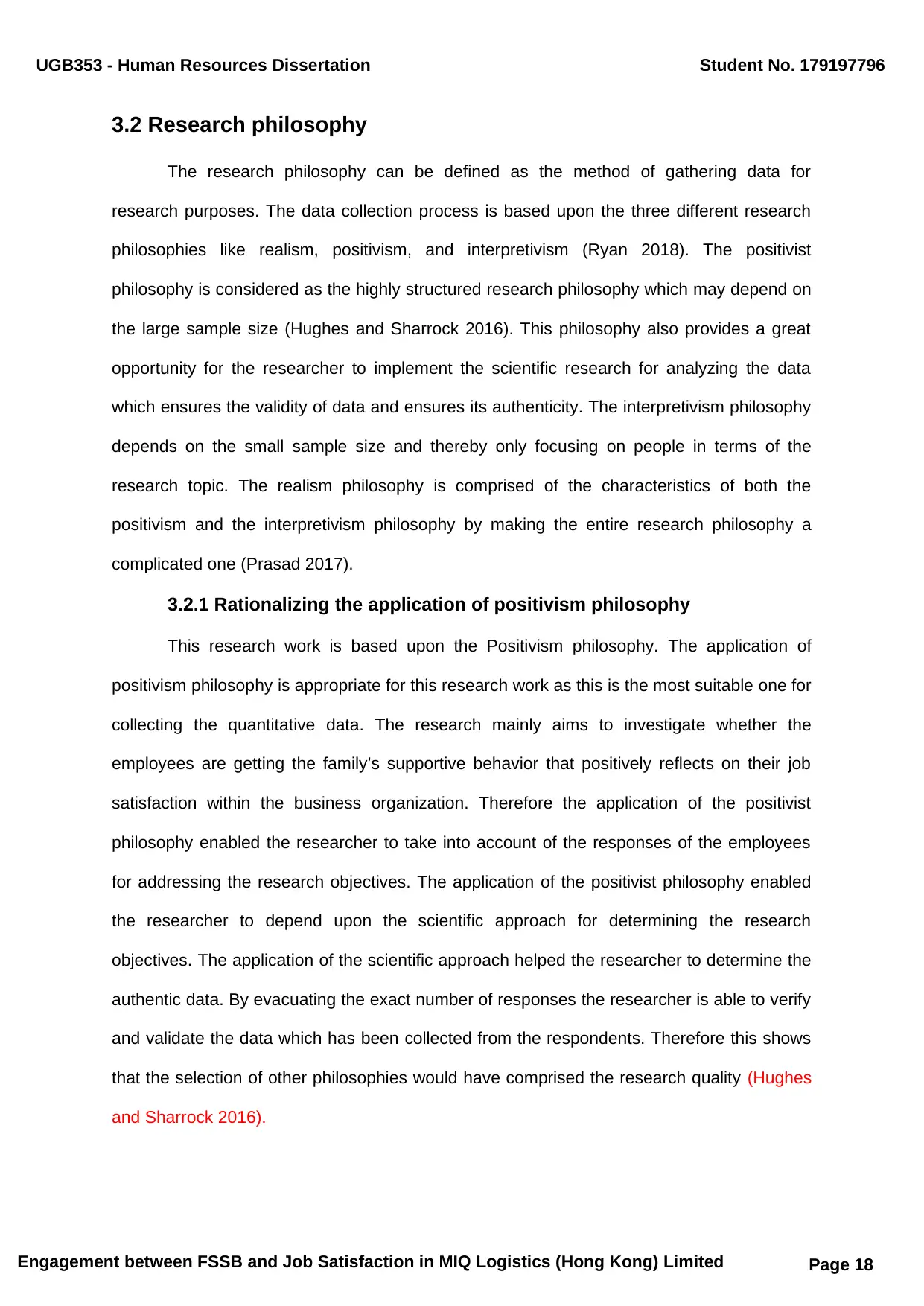
UGB353 - Human Resources Dissertation Student No. 179197796
3.2 Research philosophy
The research philosophy can be defined as the method of gathering data for
research purposes. The data collection process is based upon the three different research
philosophies like realism, positivism, and interpretivism (Ryan 2018). The positivist
philosophy is considered as the highly structured research philosophy which may depend on
the large sample size (Hughes and Sharrock 2016). This philosophy also provides a great
opportunity for the researcher to implement the scientific research for analyzing the data
which ensures the validity of data and ensures its authenticity. The interpretivism philosophy
depends on the small sample size and thereby only focusing on people in terms of the
research topic. The realism philosophy is comprised of the characteristics of both the
positivism and the interpretivism philosophy by making the entire research philosophy a
complicated one (Prasad 2017).
3.2.1 Rationalizing the application of positivism philosophy
This research work is based upon the Positivism philosophy. The application of
positivism philosophy is appropriate for this research work as this is the most suitable one for
collecting the quantitative data. The research mainly aims to investigate whether the
employees are getting the family’s supportive behavior that positively reflects on their job
satisfaction within the business organization. Therefore the application of the positivist
philosophy enabled the researcher to take into account of the responses of the employees
for addressing the research objectives. The application of the positivist philosophy enabled
the researcher to depend upon the scientific approach for determining the research
objectives. The application of the scientific approach helped the researcher to determine the
authentic data. By evacuating the exact number of responses the researcher is able to verify
and validate the data which has been collected from the respondents. Therefore this shows
that the selection of other philosophies would have comprised the research quality (Hughes
and Sharrock 2016).
Engagement between FSSB and Job Satisfaction in MIQ Logistics (Hong Kong) Limited Page 18
3.2 Research philosophy
The research philosophy can be defined as the method of gathering data for
research purposes. The data collection process is based upon the three different research
philosophies like realism, positivism, and interpretivism (Ryan 2018). The positivist
philosophy is considered as the highly structured research philosophy which may depend on
the large sample size (Hughes and Sharrock 2016). This philosophy also provides a great
opportunity for the researcher to implement the scientific research for analyzing the data
which ensures the validity of data and ensures its authenticity. The interpretivism philosophy
depends on the small sample size and thereby only focusing on people in terms of the
research topic. The realism philosophy is comprised of the characteristics of both the
positivism and the interpretivism philosophy by making the entire research philosophy a
complicated one (Prasad 2017).
3.2.1 Rationalizing the application of positivism philosophy
This research work is based upon the Positivism philosophy. The application of
positivism philosophy is appropriate for this research work as this is the most suitable one for
collecting the quantitative data. The research mainly aims to investigate whether the
employees are getting the family’s supportive behavior that positively reflects on their job
satisfaction within the business organization. Therefore the application of the positivist
philosophy enabled the researcher to take into account of the responses of the employees
for addressing the research objectives. The application of the positivist philosophy enabled
the researcher to depend upon the scientific approach for determining the research
objectives. The application of the scientific approach helped the researcher to determine the
authentic data. By evacuating the exact number of responses the researcher is able to verify
and validate the data which has been collected from the respondents. Therefore this shows
that the selection of other philosophies would have comprised the research quality (Hughes
and Sharrock 2016).
Engagement between FSSB and Job Satisfaction in MIQ Logistics (Hong Kong) Limited Page 18
Paraphrase This Document
Need a fresh take? Get an instant paraphrase of this document with our AI Paraphraser
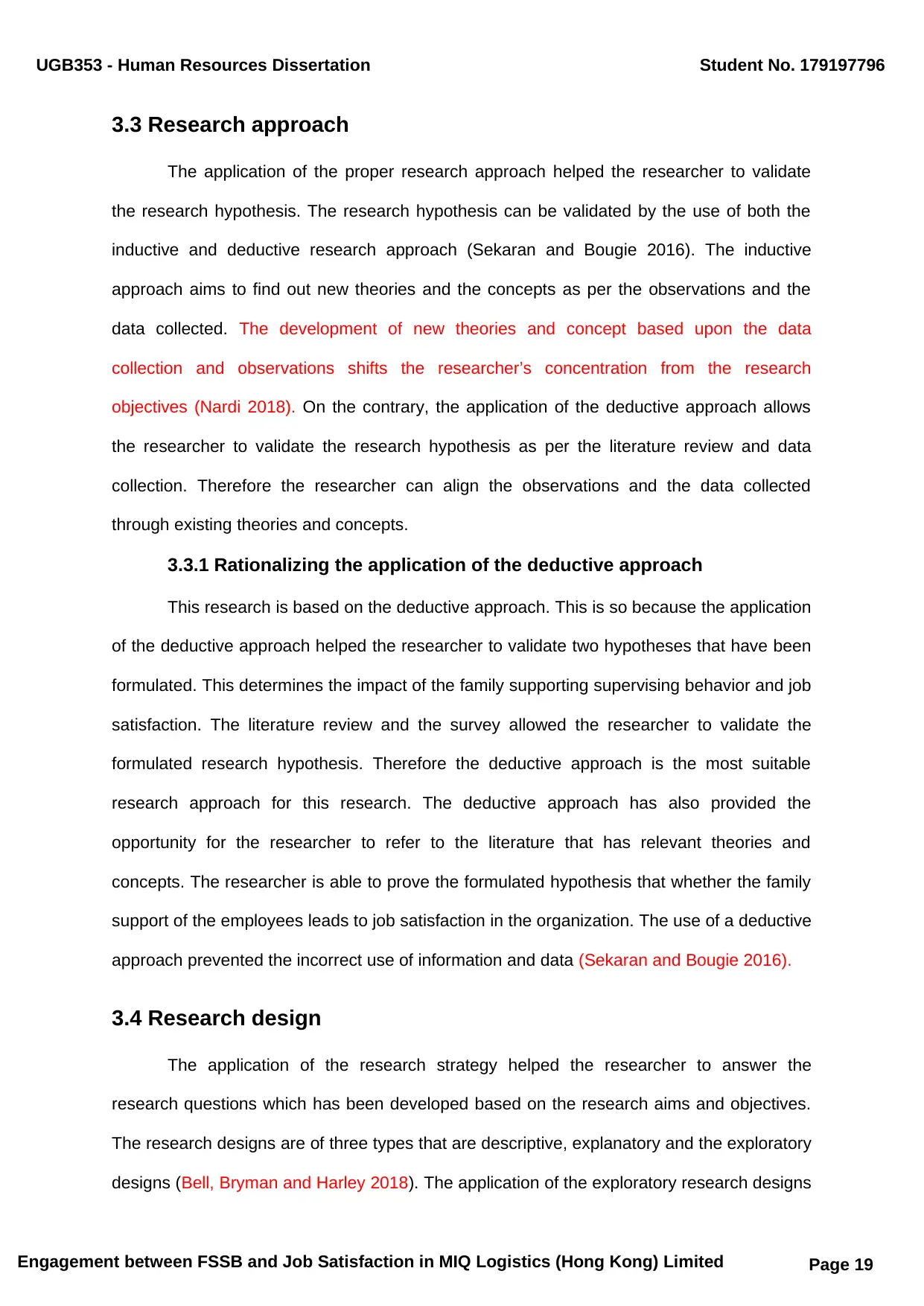
UGB353 - Human Resources Dissertation Student No. 179197796
3.3 Research approach
The application of the proper research approach helped the researcher to validate
the research hypothesis. The research hypothesis can be validated by the use of both the
inductive and deductive research approach (Sekaran and Bougie 2016). The inductive
approach aims to find out new theories and the concepts as per the observations and the
data collected. The development of new theories and concept based upon the data
collection and observations shifts the researcher’s concentration from the research
objectives (Nardi 2018). On the contrary, the application of the deductive approach allows
the researcher to validate the research hypothesis as per the literature review and data
collection. Therefore the researcher can align the observations and the data collected
through existing theories and concepts.
3.3.1 Rationalizing the application of the deductive approach
This research is based on the deductive approach. This is so because the application
of the deductive approach helped the researcher to validate two hypotheses that have been
formulated. This determines the impact of the family supporting supervising behavior and job
satisfaction. The literature review and the survey allowed the researcher to validate the
formulated research hypothesis. Therefore the deductive approach is the most suitable
research approach for this research. The deductive approach has also provided the
opportunity for the researcher to refer to the literature that has relevant theories and
concepts. The researcher is able to prove the formulated hypothesis that whether the family
support of the employees leads to job satisfaction in the organization. The use of a deductive
approach prevented the incorrect use of information and data (Sekaran and Bougie 2016).
3.4 Research design
The application of the research strategy helped the researcher to answer the
research questions which has been developed based on the research aims and objectives.
The research designs are of three types that are descriptive, explanatory and the exploratory
designs (Bell, Bryman and Harley 2018). The application of the exploratory research designs
Engagement between FSSB and Job Satisfaction in MIQ Logistics (Hong Kong) Limited Page 19
3.3 Research approach
The application of the proper research approach helped the researcher to validate
the research hypothesis. The research hypothesis can be validated by the use of both the
inductive and deductive research approach (Sekaran and Bougie 2016). The inductive
approach aims to find out new theories and the concepts as per the observations and the
data collected. The development of new theories and concept based upon the data
collection and observations shifts the researcher’s concentration from the research
objectives (Nardi 2018). On the contrary, the application of the deductive approach allows
the researcher to validate the research hypothesis as per the literature review and data
collection. Therefore the researcher can align the observations and the data collected
through existing theories and concepts.
3.3.1 Rationalizing the application of the deductive approach
This research is based on the deductive approach. This is so because the application
of the deductive approach helped the researcher to validate two hypotheses that have been
formulated. This determines the impact of the family supporting supervising behavior and job
satisfaction. The literature review and the survey allowed the researcher to validate the
formulated research hypothesis. Therefore the deductive approach is the most suitable
research approach for this research. The deductive approach has also provided the
opportunity for the researcher to refer to the literature that has relevant theories and
concepts. The researcher is able to prove the formulated hypothesis that whether the family
support of the employees leads to job satisfaction in the organization. The use of a deductive
approach prevented the incorrect use of information and data (Sekaran and Bougie 2016).
3.4 Research design
The application of the research strategy helped the researcher to answer the
research questions which has been developed based on the research aims and objectives.
The research designs are of three types that are descriptive, explanatory and the exploratory
designs (Bell, Bryman and Harley 2018). The application of the exploratory research designs
Engagement between FSSB and Job Satisfaction in MIQ Logistics (Hong Kong) Limited Page 19
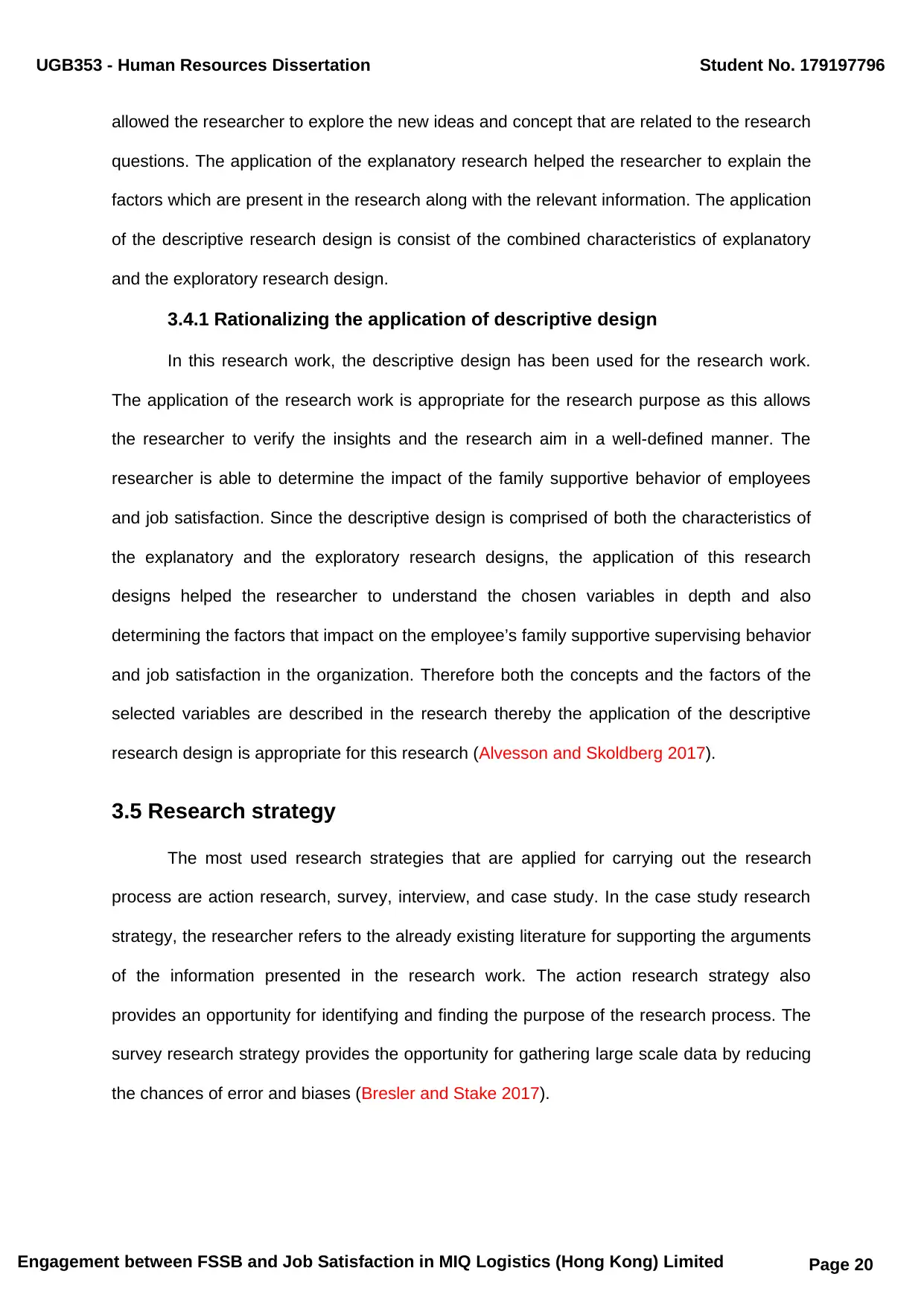
UGB353 - Human Resources Dissertation Student No. 179197796
allowed the researcher to explore the new ideas and concept that are related to the research
questions. The application of the explanatory research helped the researcher to explain the
factors which are present in the research along with the relevant information. The application
of the descriptive research design is consist of the combined characteristics of explanatory
and the exploratory research design.
3.4.1 Rationalizing the application of descriptive design
In this research work, the descriptive design has been used for the research work.
The application of the research work is appropriate for the research purpose as this allows
the researcher to verify the insights and the research aim in a well-defined manner. The
researcher is able to determine the impact of the family supportive behavior of employees
and job satisfaction. Since the descriptive design is comprised of both the characteristics of
the explanatory and the exploratory research designs, the application of this research
designs helped the researcher to understand the chosen variables in depth and also
determining the factors that impact on the employee’s family supportive supervising behavior
and job satisfaction in the organization. Therefore both the concepts and the factors of the
selected variables are described in the research thereby the application of the descriptive
research design is appropriate for this research (Alvesson and Skoldberg 2017).
3.5 Research strategy
The most used research strategies that are applied for carrying out the research
process are action research, survey, interview, and case study. In the case study research
strategy, the researcher refers to the already existing literature for supporting the arguments
of the information presented in the research work. The action research strategy also
provides an opportunity for identifying and finding the purpose of the research process. The
survey research strategy provides the opportunity for gathering large scale data by reducing
the chances of error and biases (Bresler and Stake 2017).
Engagement between FSSB and Job Satisfaction in MIQ Logistics (Hong Kong) Limited Page 20
allowed the researcher to explore the new ideas and concept that are related to the research
questions. The application of the explanatory research helped the researcher to explain the
factors which are present in the research along with the relevant information. The application
of the descriptive research design is consist of the combined characteristics of explanatory
and the exploratory research design.
3.4.1 Rationalizing the application of descriptive design
In this research work, the descriptive design has been used for the research work.
The application of the research work is appropriate for the research purpose as this allows
the researcher to verify the insights and the research aim in a well-defined manner. The
researcher is able to determine the impact of the family supportive behavior of employees
and job satisfaction. Since the descriptive design is comprised of both the characteristics of
the explanatory and the exploratory research designs, the application of this research
designs helped the researcher to understand the chosen variables in depth and also
determining the factors that impact on the employee’s family supportive supervising behavior
and job satisfaction in the organization. Therefore both the concepts and the factors of the
selected variables are described in the research thereby the application of the descriptive
research design is appropriate for this research (Alvesson and Skoldberg 2017).
3.5 Research strategy
The most used research strategies that are applied for carrying out the research
process are action research, survey, interview, and case study. In the case study research
strategy, the researcher refers to the already existing literature for supporting the arguments
of the information presented in the research work. The action research strategy also
provides an opportunity for identifying and finding the purpose of the research process. The
survey research strategy provides the opportunity for gathering large scale data by reducing
the chances of error and biases (Bresler and Stake 2017).
Engagement between FSSB and Job Satisfaction in MIQ Logistics (Hong Kong) Limited Page 20
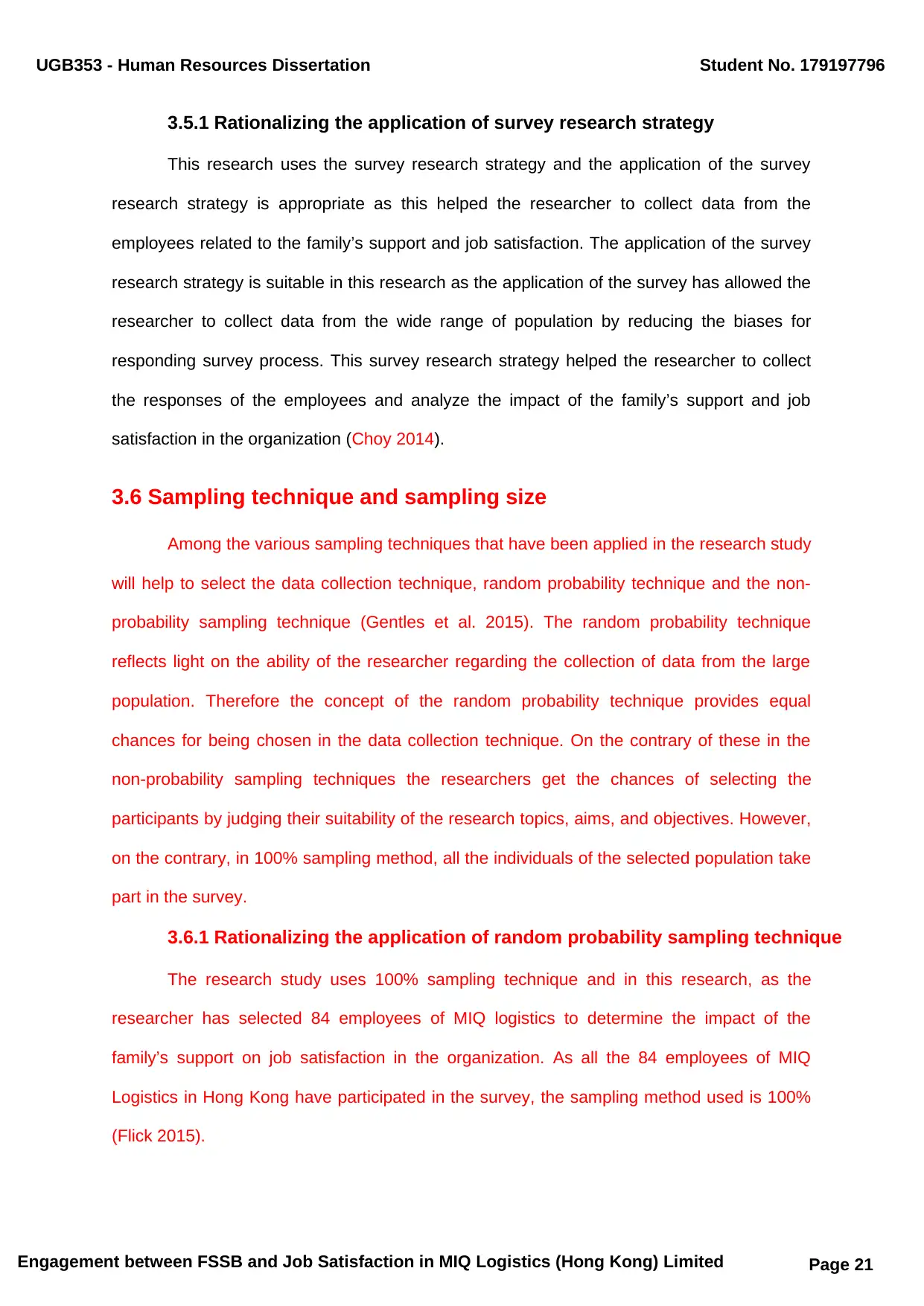
UGB353 - Human Resources Dissertation Student No. 179197796
3.5.1 Rationalizing the application of survey research strategy
This research uses the survey research strategy and the application of the survey
research strategy is appropriate as this helped the researcher to collect data from the
employees related to the family’s support and job satisfaction. The application of the survey
research strategy is suitable in this research as the application of the survey has allowed the
researcher to collect data from the wide range of population by reducing the biases for
responding survey process. This survey research strategy helped the researcher to collect
the responses of the employees and analyze the impact of the family’s support and job
satisfaction in the organization (Choy 2014).
3.6 Sampling technique and sampling size
Among the various sampling techniques that have been applied in the research study
will help to select the data collection technique, random probability technique and the non-
probability sampling technique (Gentles et al. 2015). The random probability technique
reflects light on the ability of the researcher regarding the collection of data from the large
population. Therefore the concept of the random probability technique provides equal
chances for being chosen in the data collection technique. On the contrary of these in the
non-probability sampling techniques the researchers get the chances of selecting the
participants by judging their suitability of the research topics, aims, and objectives. However,
on the contrary, in 100% sampling method, all the individuals of the selected population take
part in the survey.
3.6.1 Rationalizing the application of random probability sampling technique
The research study uses 100% sampling technique and in this research, as the
researcher has selected 84 employees of MIQ logistics to determine the impact of the
family’s support on job satisfaction in the organization. As all the 84 employees of MIQ
Logistics in Hong Kong have participated in the survey, the sampling method used is 100%
(Flick 2015).
Engagement between FSSB and Job Satisfaction in MIQ Logistics (Hong Kong) Limited Page 21
3.5.1 Rationalizing the application of survey research strategy
This research uses the survey research strategy and the application of the survey
research strategy is appropriate as this helped the researcher to collect data from the
employees related to the family’s support and job satisfaction. The application of the survey
research strategy is suitable in this research as the application of the survey has allowed the
researcher to collect data from the wide range of population by reducing the biases for
responding survey process. This survey research strategy helped the researcher to collect
the responses of the employees and analyze the impact of the family’s support and job
satisfaction in the organization (Choy 2014).
3.6 Sampling technique and sampling size
Among the various sampling techniques that have been applied in the research study
will help to select the data collection technique, random probability technique and the non-
probability sampling technique (Gentles et al. 2015). The random probability technique
reflects light on the ability of the researcher regarding the collection of data from the large
population. Therefore the concept of the random probability technique provides equal
chances for being chosen in the data collection technique. On the contrary of these in the
non-probability sampling techniques the researchers get the chances of selecting the
participants by judging their suitability of the research topics, aims, and objectives. However,
on the contrary, in 100% sampling method, all the individuals of the selected population take
part in the survey.
3.6.1 Rationalizing the application of random probability sampling technique
The research study uses 100% sampling technique and in this research, as the
researcher has selected 84 employees of MIQ logistics to determine the impact of the
family’s support on job satisfaction in the organization. As all the 84 employees of MIQ
Logistics in Hong Kong have participated in the survey, the sampling method used is 100%
(Flick 2015).
Engagement between FSSB and Job Satisfaction in MIQ Logistics (Hong Kong) Limited Page 21
Secure Best Marks with AI Grader
Need help grading? Try our AI Grader for instant feedback on your assignments.
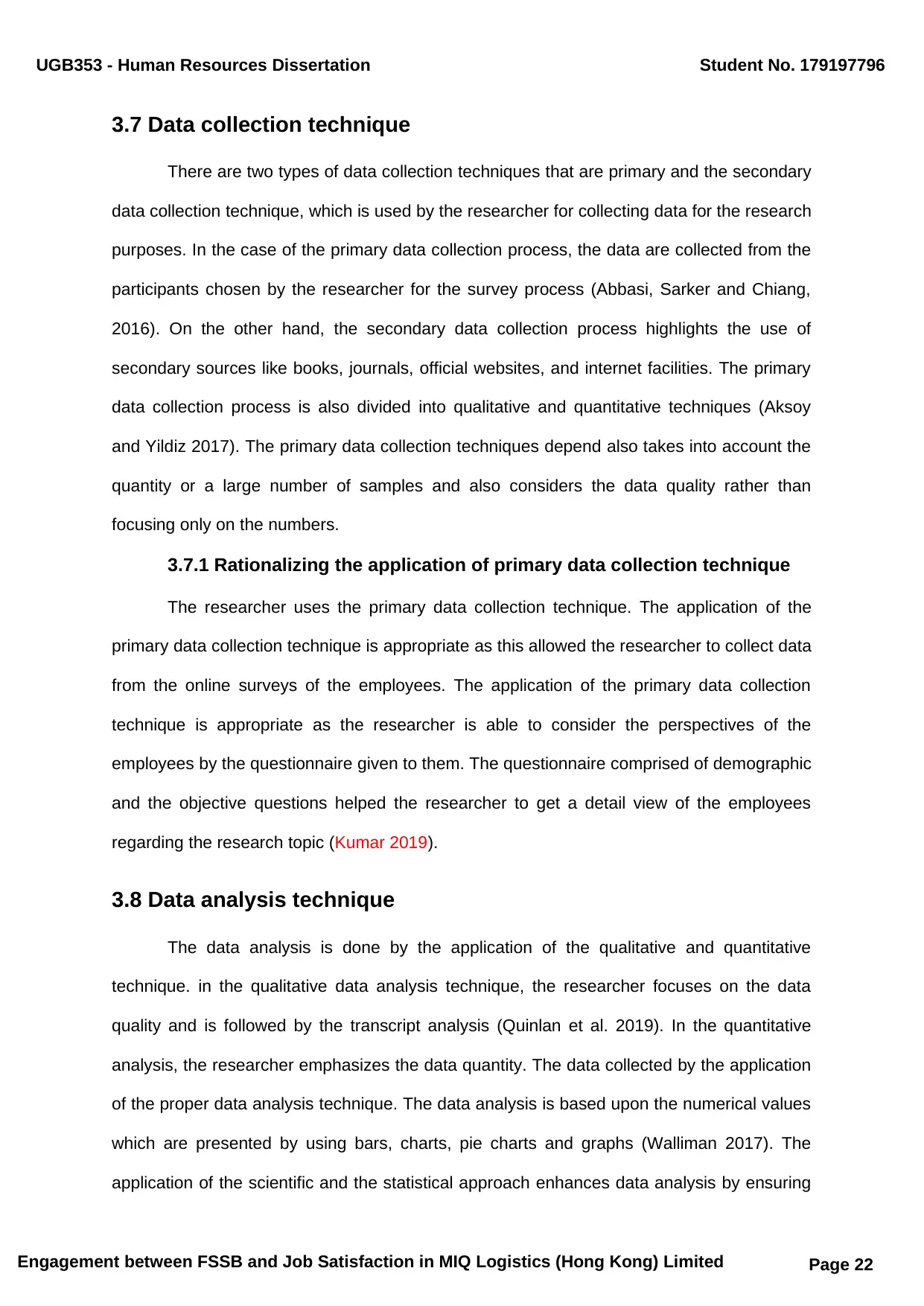
UGB353 - Human Resources Dissertation Student No. 179197796
3.7 Data collection technique
There are two types of data collection techniques that are primary and the secondary
data collection technique, which is used by the researcher for collecting data for the research
purposes. In the case of the primary data collection process, the data are collected from the
participants chosen by the researcher for the survey process (Abbasi, Sarker and Chiang,
2016). On the other hand, the secondary data collection process highlights the use of
secondary sources like books, journals, official websites, and internet facilities. The primary
data collection process is also divided into qualitative and quantitative techniques (Aksoy
and Yildiz 2017). The primary data collection techniques depend also takes into account the
quantity or a large number of samples and also considers the data quality rather than
focusing only on the numbers.
3.7.1 Rationalizing the application of primary data collection technique
The researcher uses the primary data collection technique. The application of the
primary data collection technique is appropriate as this allowed the researcher to collect data
from the online surveys of the employees. The application of the primary data collection
technique is appropriate as the researcher is able to consider the perspectives of the
employees by the questionnaire given to them. The questionnaire comprised of demographic
and the objective questions helped the researcher to get a detail view of the employees
regarding the research topic (Kumar 2019).
3.8 Data analysis technique
The data analysis is done by the application of the qualitative and quantitative
technique. in the qualitative data analysis technique, the researcher focuses on the data
quality and is followed by the transcript analysis (Quinlan et al. 2019). In the quantitative
analysis, the researcher emphasizes the data quantity. The data collected by the application
of the proper data analysis technique. The data analysis is based upon the numerical values
which are presented by using bars, charts, pie charts and graphs (Walliman 2017). The
application of the scientific and the statistical approach enhances data analysis by ensuring
Engagement between FSSB and Job Satisfaction in MIQ Logistics (Hong Kong) Limited Page 22
3.7 Data collection technique
There are two types of data collection techniques that are primary and the secondary
data collection technique, which is used by the researcher for collecting data for the research
purposes. In the case of the primary data collection process, the data are collected from the
participants chosen by the researcher for the survey process (Abbasi, Sarker and Chiang,
2016). On the other hand, the secondary data collection process highlights the use of
secondary sources like books, journals, official websites, and internet facilities. The primary
data collection process is also divided into qualitative and quantitative techniques (Aksoy
and Yildiz 2017). The primary data collection techniques depend also takes into account the
quantity or a large number of samples and also considers the data quality rather than
focusing only on the numbers.
3.7.1 Rationalizing the application of primary data collection technique
The researcher uses the primary data collection technique. The application of the
primary data collection technique is appropriate as this allowed the researcher to collect data
from the online surveys of the employees. The application of the primary data collection
technique is appropriate as the researcher is able to consider the perspectives of the
employees by the questionnaire given to them. The questionnaire comprised of demographic
and the objective questions helped the researcher to get a detail view of the employees
regarding the research topic (Kumar 2019).
3.8 Data analysis technique
The data analysis is done by the application of the qualitative and quantitative
technique. in the qualitative data analysis technique, the researcher focuses on the data
quality and is followed by the transcript analysis (Quinlan et al. 2019). In the quantitative
analysis, the researcher emphasizes the data quantity. The data collected by the application
of the proper data analysis technique. The data analysis is based upon the numerical values
which are presented by using bars, charts, pie charts and graphs (Walliman 2017). The
application of the scientific and the statistical approach enhances data analysis by ensuring
Engagement between FSSB and Job Satisfaction in MIQ Logistics (Hong Kong) Limited Page 22
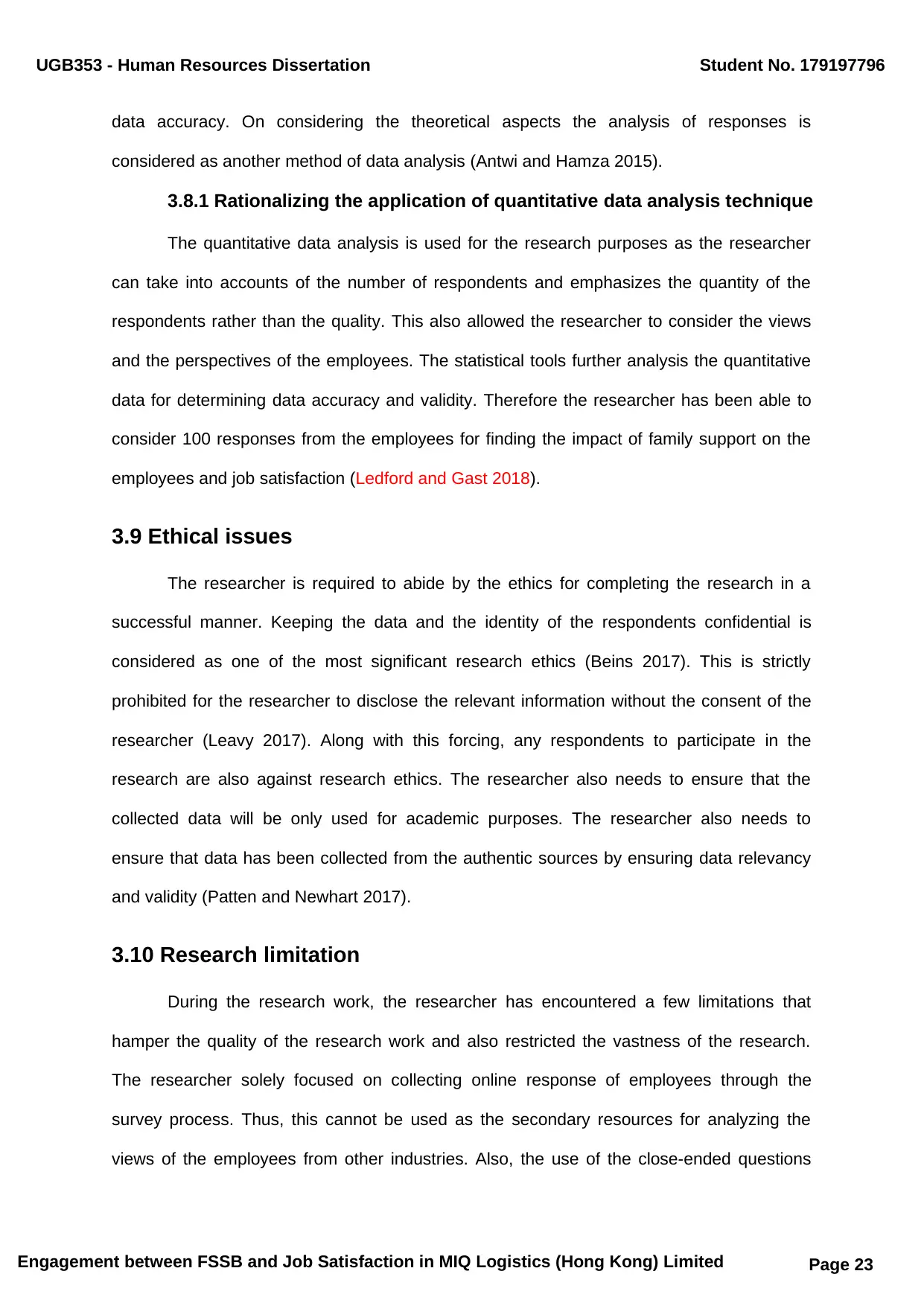
UGB353 - Human Resources Dissertation Student No. 179197796
data accuracy. On considering the theoretical aspects the analysis of responses is
considered as another method of data analysis (Antwi and Hamza 2015).
3.8.1 Rationalizing the application of quantitative data analysis technique
The quantitative data analysis is used for the research purposes as the researcher
can take into accounts of the number of respondents and emphasizes the quantity of the
respondents rather than the quality. This also allowed the researcher to consider the views
and the perspectives of the employees. The statistical tools further analysis the quantitative
data for determining data accuracy and validity. Therefore the researcher has been able to
consider 100 responses from the employees for finding the impact of family support on the
employees and job satisfaction (Ledford and Gast 2018).
3.9 Ethical issues
The researcher is required to abide by the ethics for completing the research in a
successful manner. Keeping the data and the identity of the respondents confidential is
considered as one of the most significant research ethics (Beins 2017). This is strictly
prohibited for the researcher to disclose the relevant information without the consent of the
researcher (Leavy 2017). Along with this forcing, any respondents to participate in the
research are also against research ethics. The researcher also needs to ensure that the
collected data will be only used for academic purposes. The researcher also needs to
ensure that data has been collected from the authentic sources by ensuring data relevancy
and validity (Patten and Newhart 2017).
3.10 Research limitation
During the research work, the researcher has encountered a few limitations that
hamper the quality of the research work and also restricted the vastness of the research.
The researcher solely focused on collecting online response of employees through the
survey process. Thus, this cannot be used as the secondary resources for analyzing the
views of the employees from other industries. Also, the use of the close-ended questions
Engagement between FSSB and Job Satisfaction in MIQ Logistics (Hong Kong) Limited Page 23
data accuracy. On considering the theoretical aspects the analysis of responses is
considered as another method of data analysis (Antwi and Hamza 2015).
3.8.1 Rationalizing the application of quantitative data analysis technique
The quantitative data analysis is used for the research purposes as the researcher
can take into accounts of the number of respondents and emphasizes the quantity of the
respondents rather than the quality. This also allowed the researcher to consider the views
and the perspectives of the employees. The statistical tools further analysis the quantitative
data for determining data accuracy and validity. Therefore the researcher has been able to
consider 100 responses from the employees for finding the impact of family support on the
employees and job satisfaction (Ledford and Gast 2018).
3.9 Ethical issues
The researcher is required to abide by the ethics for completing the research in a
successful manner. Keeping the data and the identity of the respondents confidential is
considered as one of the most significant research ethics (Beins 2017). This is strictly
prohibited for the researcher to disclose the relevant information without the consent of the
researcher (Leavy 2017). Along with this forcing, any respondents to participate in the
research are also against research ethics. The researcher also needs to ensure that the
collected data will be only used for academic purposes. The researcher also needs to
ensure that data has been collected from the authentic sources by ensuring data relevancy
and validity (Patten and Newhart 2017).
3.10 Research limitation
During the research work, the researcher has encountered a few limitations that
hamper the quality of the research work and also restricted the vastness of the research.
The researcher solely focused on collecting online response of employees through the
survey process. Thus, this cannot be used as the secondary resources for analyzing the
views of the employees from other industries. Also, the use of the close-ended questions
Engagement between FSSB and Job Satisfaction in MIQ Logistics (Hong Kong) Limited Page 23
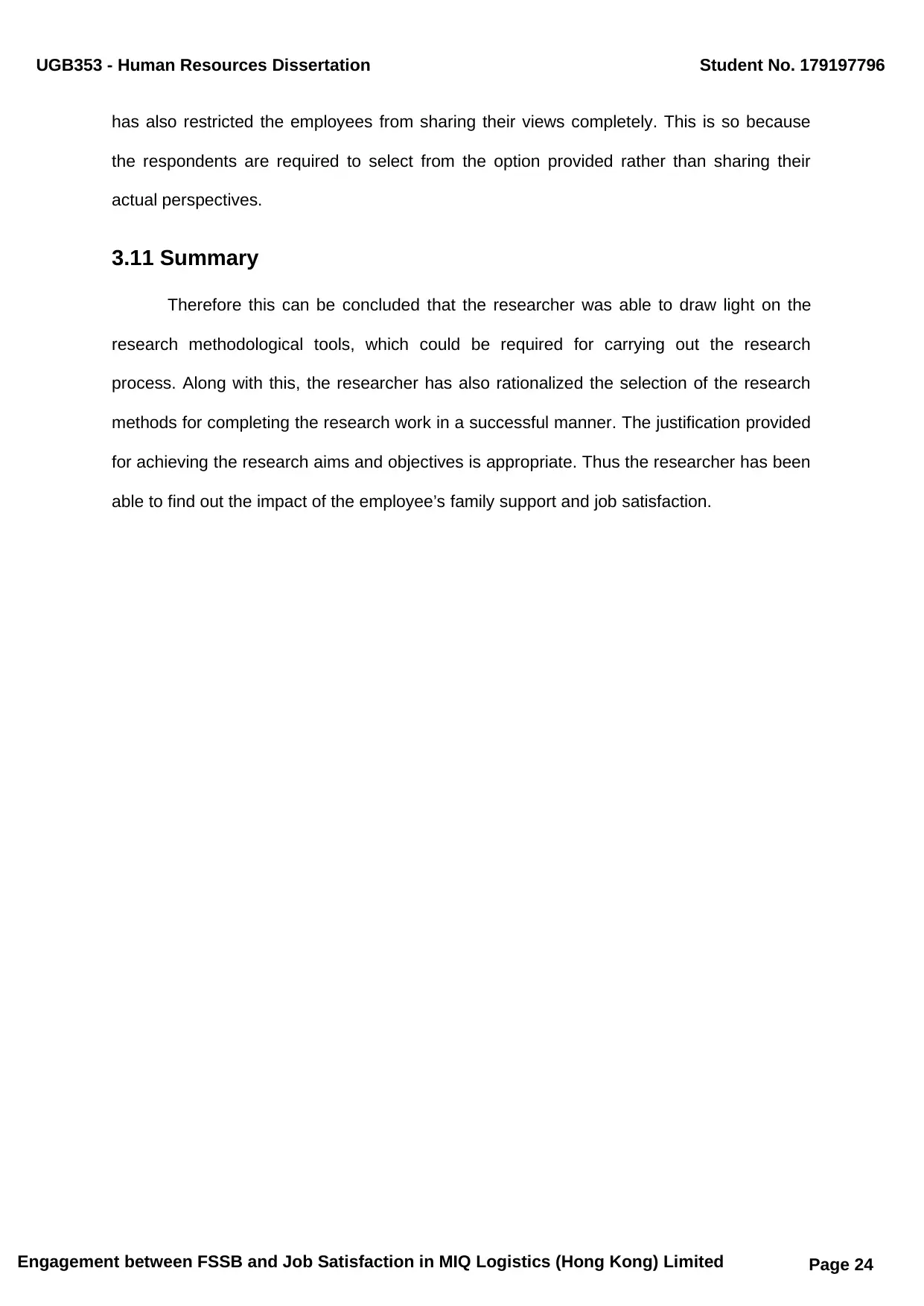
UGB353 - Human Resources Dissertation Student No. 179197796
has also restricted the employees from sharing their views completely. This is so because
the respondents are required to select from the option provided rather than sharing their
actual perspectives.
3.11 Summary
Therefore this can be concluded that the researcher was able to draw light on the
research methodological tools, which could be required for carrying out the research
process. Along with this, the researcher has also rationalized the selection of the research
methods for completing the research work in a successful manner. The justification provided
for achieving the research aims and objectives is appropriate. Thus the researcher has been
able to find out the impact of the employee’s family support and job satisfaction.
Engagement between FSSB and Job Satisfaction in MIQ Logistics (Hong Kong) Limited Page 24
has also restricted the employees from sharing their views completely. This is so because
the respondents are required to select from the option provided rather than sharing their
actual perspectives.
3.11 Summary
Therefore this can be concluded that the researcher was able to draw light on the
research methodological tools, which could be required for carrying out the research
process. Along with this, the researcher has also rationalized the selection of the research
methods for completing the research work in a successful manner. The justification provided
for achieving the research aims and objectives is appropriate. Thus the researcher has been
able to find out the impact of the employee’s family support and job satisfaction.
Engagement between FSSB and Job Satisfaction in MIQ Logistics (Hong Kong) Limited Page 24
Paraphrase This Document
Need a fresh take? Get an instant paraphrase of this document with our AI Paraphraser
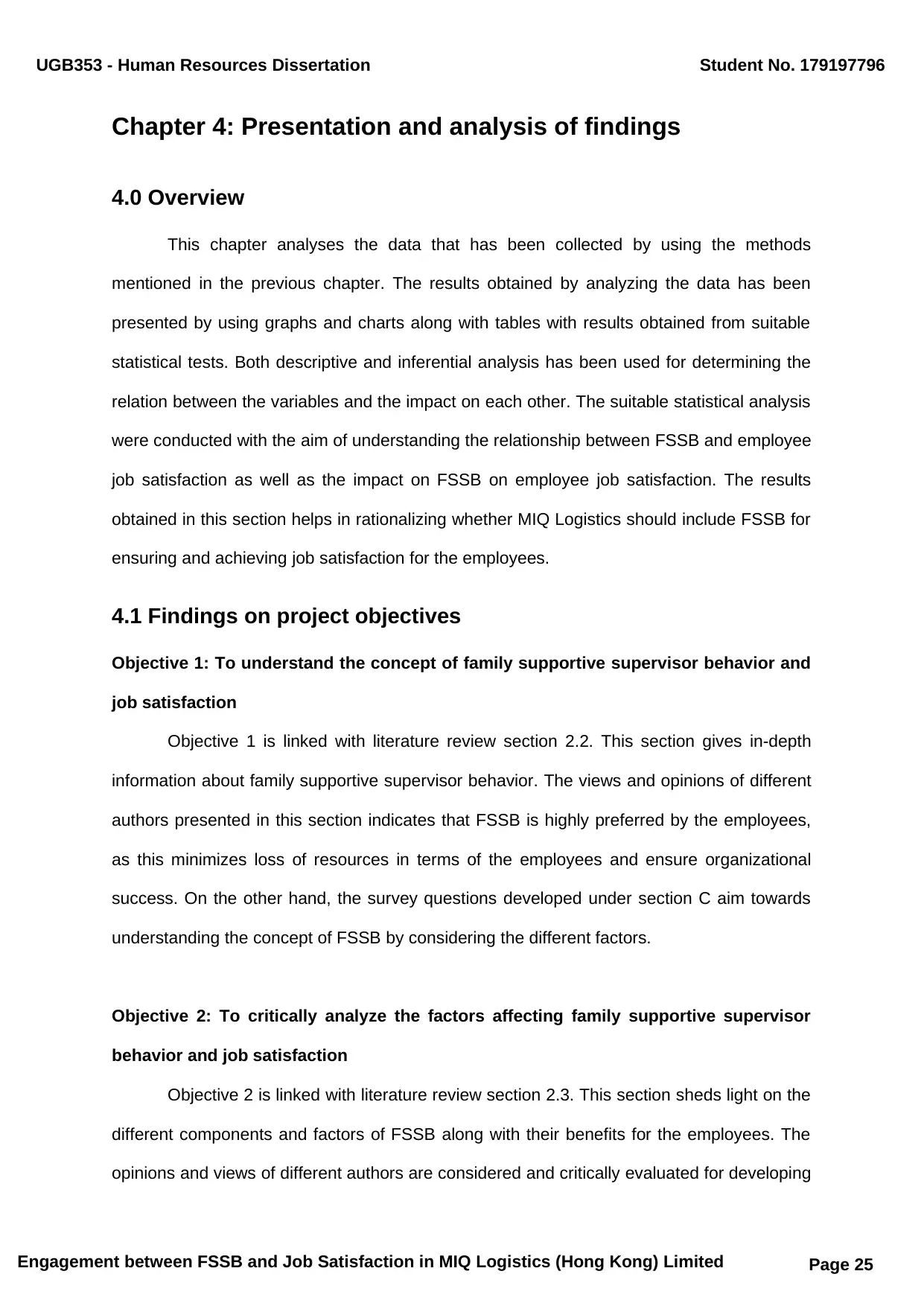
UGB353 - Human Resources Dissertation Student No. 179197796
Chapter 4: Presentation and analysis of findings
4.0 Overview
This chapter analyses the data that has been collected by using the methods
mentioned in the previous chapter. The results obtained by analyzing the data has been
presented by using graphs and charts along with tables with results obtained from suitable
statistical tests. Both descriptive and inferential analysis has been used for determining the
relation between the variables and the impact on each other. The suitable statistical analysis
were conducted with the aim of understanding the relationship between FSSB and employee
job satisfaction as well as the impact on FSSB on employee job satisfaction. The results
obtained in this section helps in rationalizing whether MIQ Logistics should include FSSB for
ensuring and achieving job satisfaction for the employees.
4.1 Findings on project objectives
Objective 1: To understand the concept of family supportive supervisor behavior and
job satisfaction
Objective 1 is linked with literature review section 2.2. This section gives in-depth
information about family supportive supervisor behavior. The views and opinions of different
authors presented in this section indicates that FSSB is highly preferred by the employees,
as this minimizes loss of resources in terms of the employees and ensure organizational
success. On the other hand, the survey questions developed under section C aim towards
understanding the concept of FSSB by considering the different factors.
Objective 2: To critically analyze the factors affecting family supportive supervisor
behavior and job satisfaction
Objective 2 is linked with literature review section 2.3. This section sheds light on the
different components and factors of FSSB along with their benefits for the employees. The
opinions and views of different authors are considered and critically evaluated for developing
Engagement between FSSB and Job Satisfaction in MIQ Logistics (Hong Kong) Limited Page 25
Chapter 4: Presentation and analysis of findings
4.0 Overview
This chapter analyses the data that has been collected by using the methods
mentioned in the previous chapter. The results obtained by analyzing the data has been
presented by using graphs and charts along with tables with results obtained from suitable
statistical tests. Both descriptive and inferential analysis has been used for determining the
relation between the variables and the impact on each other. The suitable statistical analysis
were conducted with the aim of understanding the relationship between FSSB and employee
job satisfaction as well as the impact on FSSB on employee job satisfaction. The results
obtained in this section helps in rationalizing whether MIQ Logistics should include FSSB for
ensuring and achieving job satisfaction for the employees.
4.1 Findings on project objectives
Objective 1: To understand the concept of family supportive supervisor behavior and
job satisfaction
Objective 1 is linked with literature review section 2.2. This section gives in-depth
information about family supportive supervisor behavior. The views and opinions of different
authors presented in this section indicates that FSSB is highly preferred by the employees,
as this minimizes loss of resources in terms of the employees and ensure organizational
success. On the other hand, the survey questions developed under section C aim towards
understanding the concept of FSSB by considering the different factors.
Objective 2: To critically analyze the factors affecting family supportive supervisor
behavior and job satisfaction
Objective 2 is linked with literature review section 2.3. This section sheds light on the
different components and factors of FSSB along with their benefits for the employees. The
opinions and views of different authors are considered and critically evaluated for developing
Engagement between FSSB and Job Satisfaction in MIQ Logistics (Hong Kong) Limited Page 25
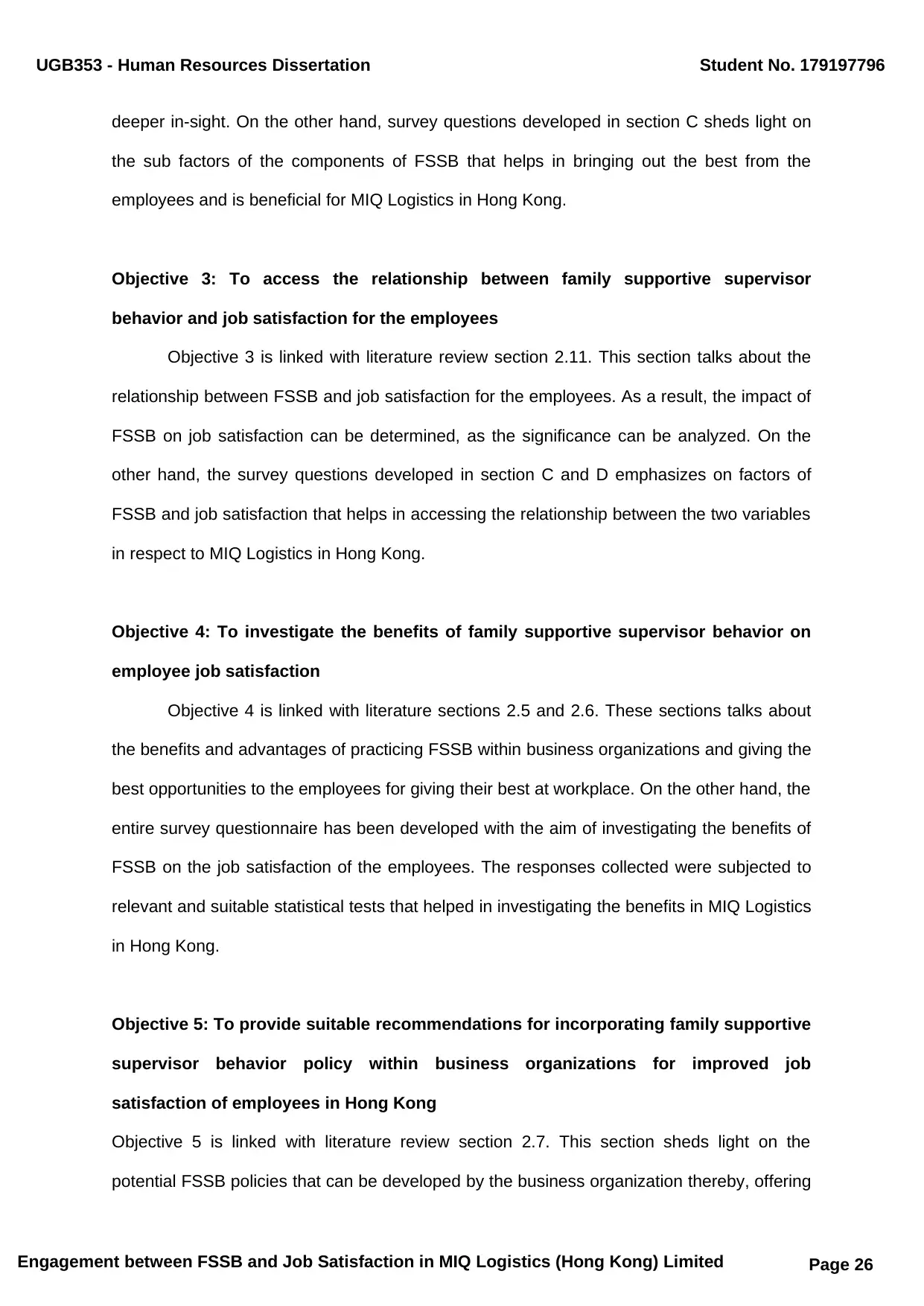
UGB353 - Human Resources Dissertation Student No. 179197796
deeper in-sight. On the other hand, survey questions developed in section C sheds light on
the sub factors of the components of FSSB that helps in bringing out the best from the
employees and is beneficial for MIQ Logistics in Hong Kong.
Objective 3: To access the relationship between family supportive supervisor
behavior and job satisfaction for the employees
Objective 3 is linked with literature review section 2.11. This section talks about the
relationship between FSSB and job satisfaction for the employees. As a result, the impact of
FSSB on job satisfaction can be determined, as the significance can be analyzed. On the
other hand, the survey questions developed in section C and D emphasizes on factors of
FSSB and job satisfaction that helps in accessing the relationship between the two variables
in respect to MIQ Logistics in Hong Kong.
Objective 4: To investigate the benefits of family supportive supervisor behavior on
employee job satisfaction
Objective 4 is linked with literature sections 2.5 and 2.6. These sections talks about
the benefits and advantages of practicing FSSB within business organizations and giving the
best opportunities to the employees for giving their best at workplace. On the other hand, the
entire survey questionnaire has been developed with the aim of investigating the benefits of
FSSB on the job satisfaction of the employees. The responses collected were subjected to
relevant and suitable statistical tests that helped in investigating the benefits in MIQ Logistics
in Hong Kong.
Objective 5: To provide suitable recommendations for incorporating family supportive
supervisor behavior policy within business organizations for improved job
satisfaction of employees in Hong Kong
Objective 5 is linked with literature review section 2.7. This section sheds light on the
potential FSSB policies that can be developed by the business organization thereby, offering
Engagement between FSSB and Job Satisfaction in MIQ Logistics (Hong Kong) Limited Page 26
deeper in-sight. On the other hand, survey questions developed in section C sheds light on
the sub factors of the components of FSSB that helps in bringing out the best from the
employees and is beneficial for MIQ Logistics in Hong Kong.
Objective 3: To access the relationship between family supportive supervisor
behavior and job satisfaction for the employees
Objective 3 is linked with literature review section 2.11. This section talks about the
relationship between FSSB and job satisfaction for the employees. As a result, the impact of
FSSB on job satisfaction can be determined, as the significance can be analyzed. On the
other hand, the survey questions developed in section C and D emphasizes on factors of
FSSB and job satisfaction that helps in accessing the relationship between the two variables
in respect to MIQ Logistics in Hong Kong.
Objective 4: To investigate the benefits of family supportive supervisor behavior on
employee job satisfaction
Objective 4 is linked with literature sections 2.5 and 2.6. These sections talks about
the benefits and advantages of practicing FSSB within business organizations and giving the
best opportunities to the employees for giving their best at workplace. On the other hand, the
entire survey questionnaire has been developed with the aim of investigating the benefits of
FSSB on the job satisfaction of the employees. The responses collected were subjected to
relevant and suitable statistical tests that helped in investigating the benefits in MIQ Logistics
in Hong Kong.
Objective 5: To provide suitable recommendations for incorporating family supportive
supervisor behavior policy within business organizations for improved job
satisfaction of employees in Hong Kong
Objective 5 is linked with literature review section 2.7. This section sheds light on the
potential FSSB policies that can be developed by the business organization thereby, offering
Engagement between FSSB and Job Satisfaction in MIQ Logistics (Hong Kong) Limited Page 26
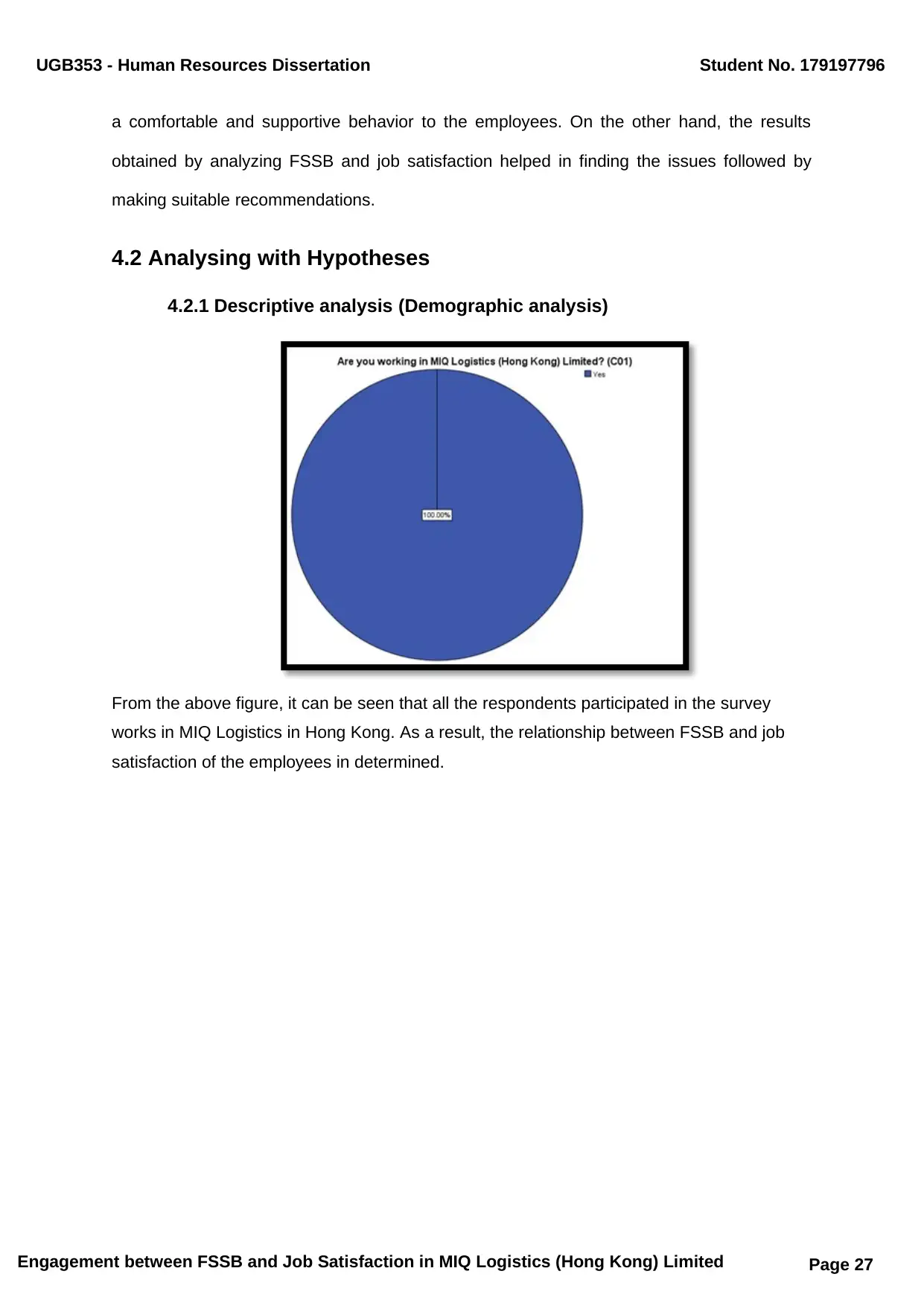
UGB353 - Human Resources Dissertation Student No. 179197796
a comfortable and supportive behavior to the employees. On the other hand, the results
obtained by analyzing FSSB and job satisfaction helped in finding the issues followed by
making suitable recommendations.
4.2 Analysing with Hypotheses
4.2.1 Descriptive analysis (Demographic analysis)
From the above figure, it can be seen that all the respondents participated in the survey
works in MIQ Logistics in Hong Kong. As a result, the relationship between FSSB and job
satisfaction of the employees in determined.
Engagement between FSSB and Job Satisfaction in MIQ Logistics (Hong Kong) Limited Page 27
a comfortable and supportive behavior to the employees. On the other hand, the results
obtained by analyzing FSSB and job satisfaction helped in finding the issues followed by
making suitable recommendations.
4.2 Analysing with Hypotheses
4.2.1 Descriptive analysis (Demographic analysis)
From the above figure, it can be seen that all the respondents participated in the survey
works in MIQ Logistics in Hong Kong. As a result, the relationship between FSSB and job
satisfaction of the employees in determined.
Engagement between FSSB and Job Satisfaction in MIQ Logistics (Hong Kong) Limited Page 27
Secure Best Marks with AI Grader
Need help grading? Try our AI Grader for instant feedback on your assignments.
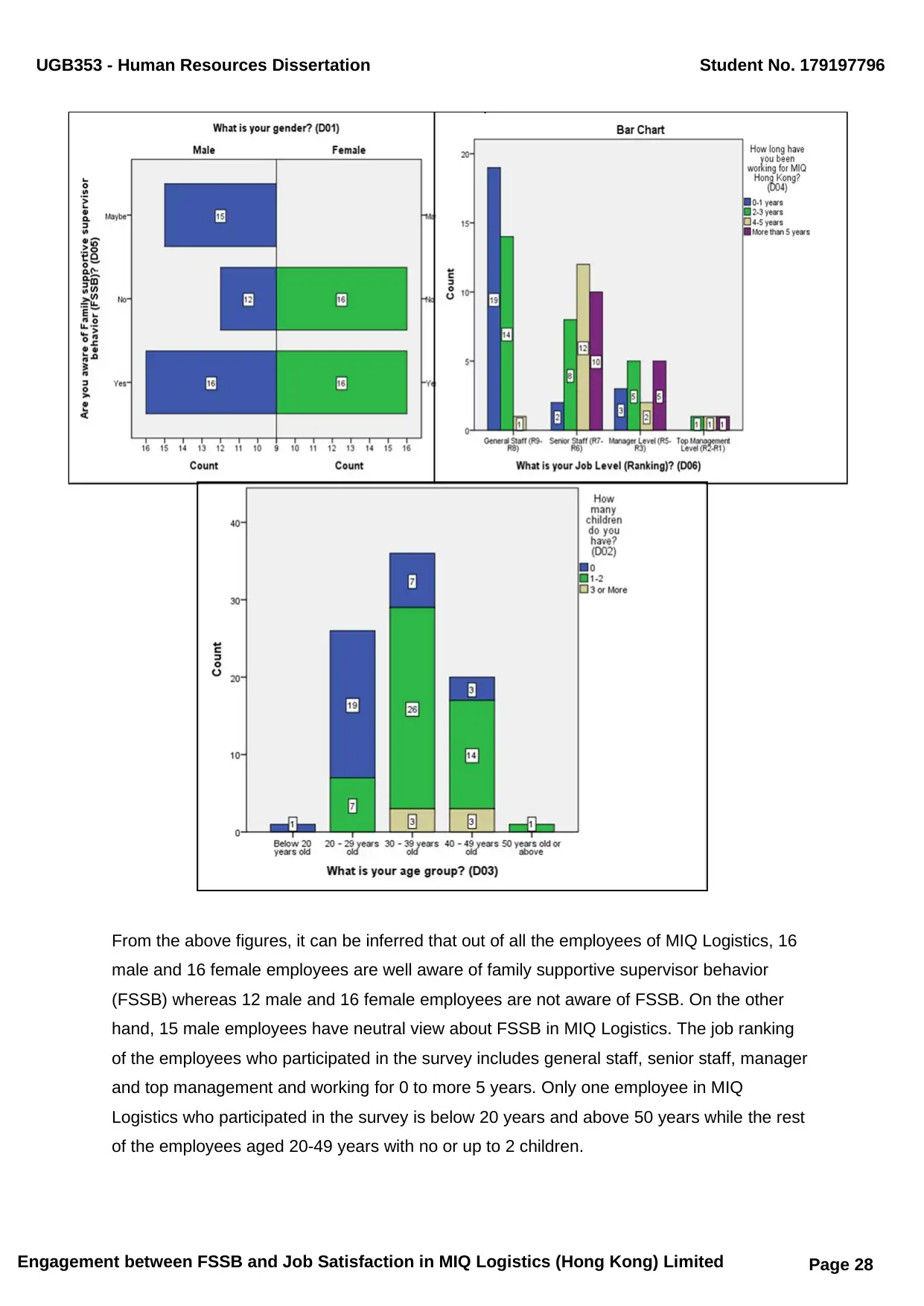
UGB353 - Human Resources Dissertation Student No. 179197796
From the above figures, it can be inferred that out of all the employees of MIQ Logistics, 16
male and 16 female employees are well aware of family supportive supervisor behavior
(FSSB) whereas 12 male and 16 female employees are not aware of FSSB. On the other
hand, 15 male employees have neutral view about FSSB in MIQ Logistics. The job ranking
of the employees who participated in the survey includes general staff, senior staff, manager
and top management and working for 0 to more 5 years. Only one employee in MIQ
Logistics who participated in the survey is below 20 years and above 50 years while the rest
of the employees aged 20-49 years with no or up to 2 children.
Engagement between FSSB and Job Satisfaction in MIQ Logistics (Hong Kong) Limited Page 28
From the above figures, it can be inferred that out of all the employees of MIQ Logistics, 16
male and 16 female employees are well aware of family supportive supervisor behavior
(FSSB) whereas 12 male and 16 female employees are not aware of FSSB. On the other
hand, 15 male employees have neutral view about FSSB in MIQ Logistics. The job ranking
of the employees who participated in the survey includes general staff, senior staff, manager
and top management and working for 0 to more 5 years. Only one employee in MIQ
Logistics who participated in the survey is below 20 years and above 50 years while the rest
of the employees aged 20-49 years with no or up to 2 children.
Engagement between FSSB and Job Satisfaction in MIQ Logistics (Hong Kong) Limited Page 28
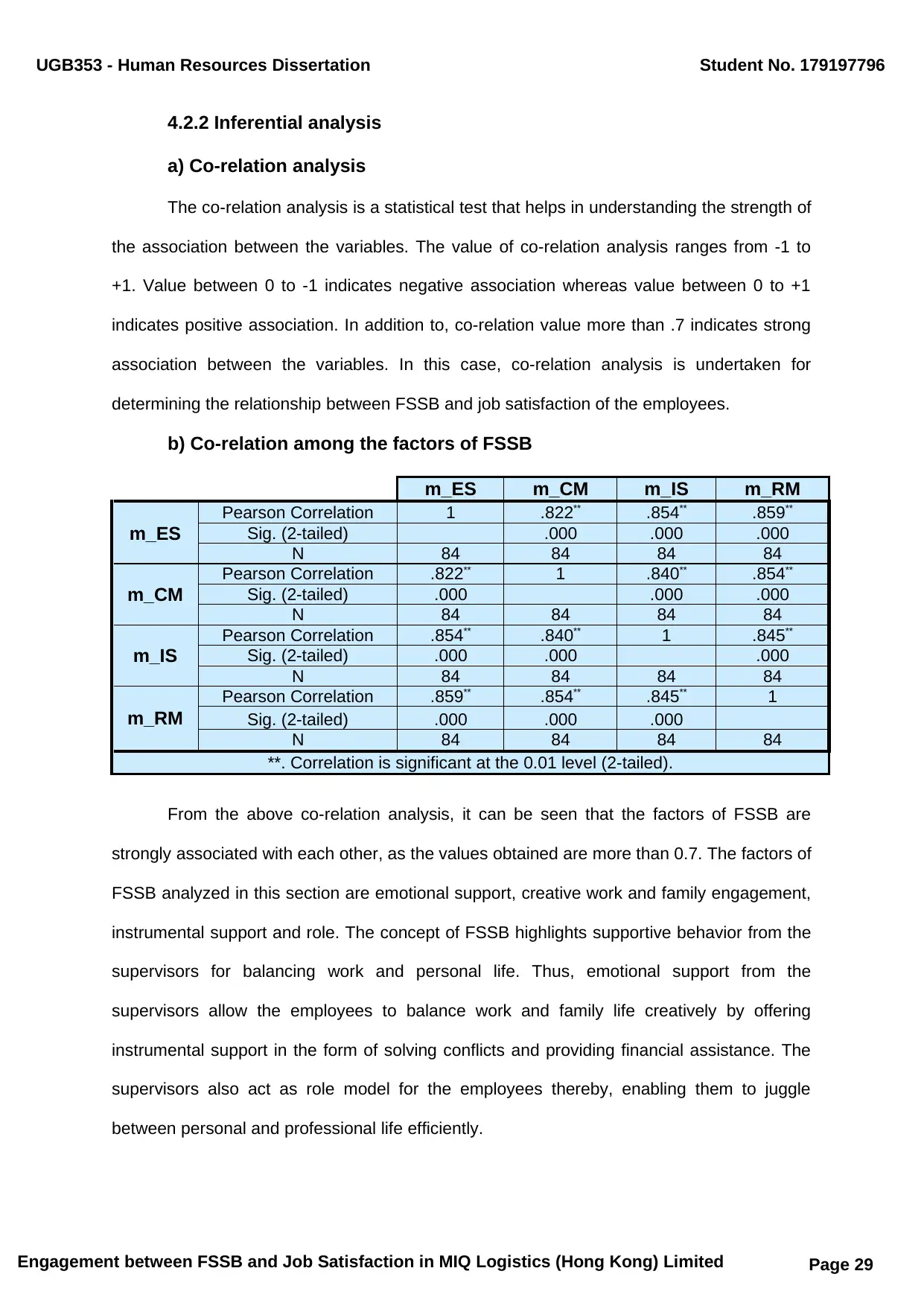
UGB353 - Human Resources Dissertation Student No. 179197796
4.2.2 Inferential analysis
a) Co-relation analysis
The co-relation analysis is a statistical test that helps in understanding the strength of
the association between the variables. The value of co-relation analysis ranges from -1 to
+1. Value between 0 to -1 indicates negative association whereas value between 0 to +1
indicates positive association. In addition to, co-relation value more than .7 indicates strong
association between the variables. In this case, co-relation analysis is undertaken for
determining the relationship between FSSB and job satisfaction of the employees.
b) Co-relation among the factors of FSSB
m_ES m_CM m_IS m_RM
m_ES
Pearson Correlation 1 .822** .854** .859**
Sig. (2-tailed) .000 .000 .000
N 84 84 84 84
m_CM
Pearson Correlation .822** 1 .840** .854**
Sig. (2-tailed) .000 .000 .000
N 84 84 84 84
m_IS
Pearson Correlation .854** .840** 1 .845**
Sig. (2-tailed) .000 .000 .000
N 84 84 84 84
m_RM
Pearson Correlation .859** .854** .845** 1
Sig. (2-tailed) .000 .000 .000
N 84 84 84 84
**. Correlation is significant at the 0.01 level (2-tailed).
From the above co-relation analysis, it can be seen that the factors of FSSB are
strongly associated with each other, as the values obtained are more than 0.7. The factors of
FSSB analyzed in this section are emotional support, creative work and family engagement,
instrumental support and role. The concept of FSSB highlights supportive behavior from the
supervisors for balancing work and personal life. Thus, emotional support from the
supervisors allow the employees to balance work and family life creatively by offering
instrumental support in the form of solving conflicts and providing financial assistance. The
supervisors also act as role model for the employees thereby, enabling them to juggle
between personal and professional life efficiently.
Engagement between FSSB and Job Satisfaction in MIQ Logistics (Hong Kong) Limited Page 29
4.2.2 Inferential analysis
a) Co-relation analysis
The co-relation analysis is a statistical test that helps in understanding the strength of
the association between the variables. The value of co-relation analysis ranges from -1 to
+1. Value between 0 to -1 indicates negative association whereas value between 0 to +1
indicates positive association. In addition to, co-relation value more than .7 indicates strong
association between the variables. In this case, co-relation analysis is undertaken for
determining the relationship between FSSB and job satisfaction of the employees.
b) Co-relation among the factors of FSSB
m_ES m_CM m_IS m_RM
m_ES
Pearson Correlation 1 .822** .854** .859**
Sig. (2-tailed) .000 .000 .000
N 84 84 84 84
m_CM
Pearson Correlation .822** 1 .840** .854**
Sig. (2-tailed) .000 .000 .000
N 84 84 84 84
m_IS
Pearson Correlation .854** .840** 1 .845**
Sig. (2-tailed) .000 .000 .000
N 84 84 84 84
m_RM
Pearson Correlation .859** .854** .845** 1
Sig. (2-tailed) .000 .000 .000
N 84 84 84 84
**. Correlation is significant at the 0.01 level (2-tailed).
From the above co-relation analysis, it can be seen that the factors of FSSB are
strongly associated with each other, as the values obtained are more than 0.7. The factors of
FSSB analyzed in this section are emotional support, creative work and family engagement,
instrumental support and role. The concept of FSSB highlights supportive behavior from the
supervisors for balancing work and personal life. Thus, emotional support from the
supervisors allow the employees to balance work and family life creatively by offering
instrumental support in the form of solving conflicts and providing financial assistance. The
supervisors also act as role model for the employees thereby, enabling them to juggle
between personal and professional life efficiently.
Engagement between FSSB and Job Satisfaction in MIQ Logistics (Hong Kong) Limited Page 29
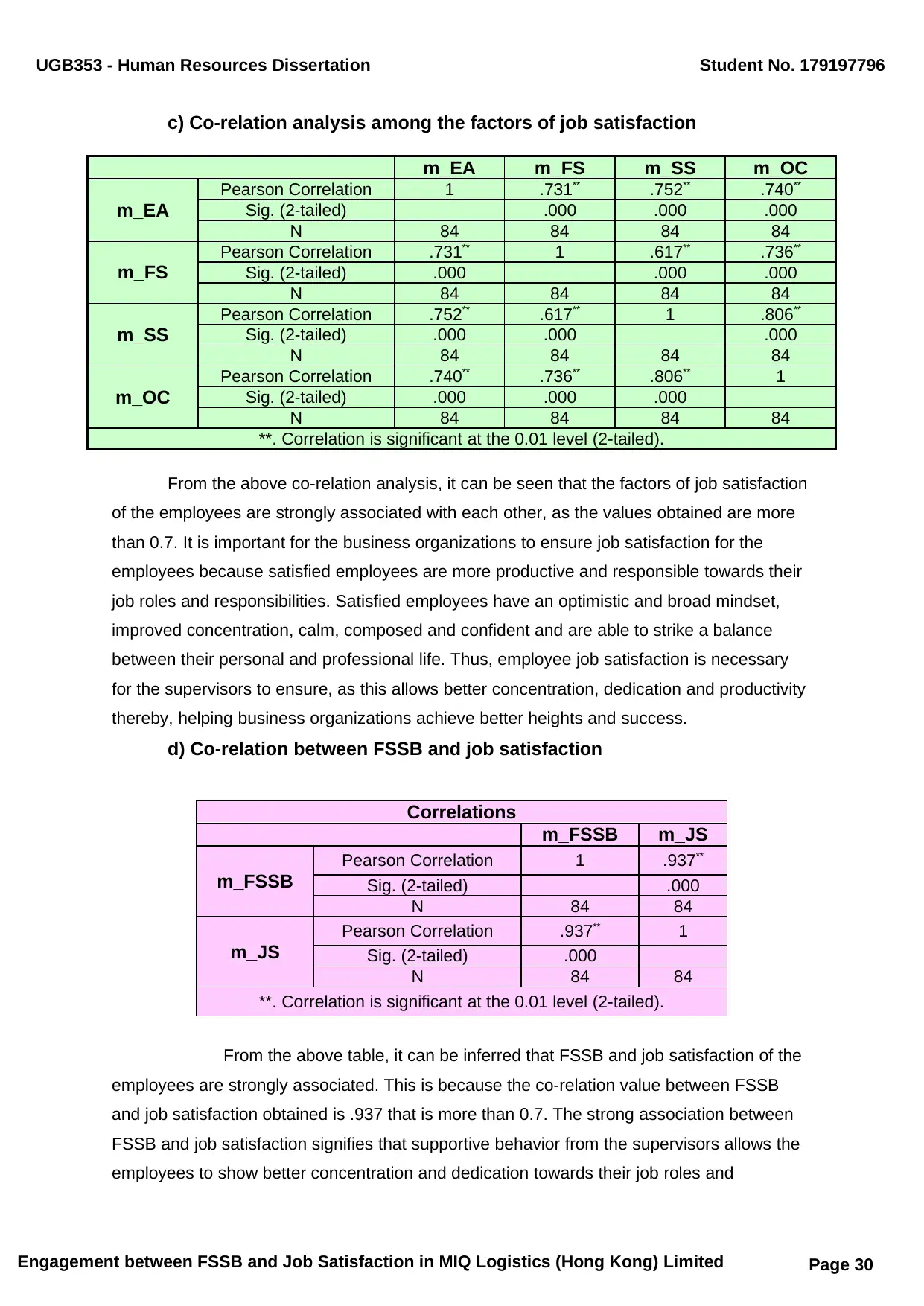
UGB353 - Human Resources Dissertation Student No. 179197796
c) Co-relation analysis among the factors of job satisfaction
m_EA m_FS m_SS m_OC
m_EA
Pearson Correlation 1 .731** .752** .740**
Sig. (2-tailed) .000 .000 .000
N 84 84 84 84
m_FS
Pearson Correlation .731** 1 .617** .736**
Sig. (2-tailed) .000 .000 .000
N 84 84 84 84
m_SS
Pearson Correlation .752** .617** 1 .806**
Sig. (2-tailed) .000 .000 .000
N 84 84 84 84
m_OC
Pearson Correlation .740** .736** .806** 1
Sig. (2-tailed) .000 .000 .000
N 84 84 84 84
**. Correlation is significant at the 0.01 level (2-tailed).
From the above co-relation analysis, it can be seen that the factors of job satisfaction
of the employees are strongly associated with each other, as the values obtained are more
than 0.7. It is important for the business organizations to ensure job satisfaction for the
employees because satisfied employees are more productive and responsible towards their
job roles and responsibilities. Satisfied employees have an optimistic and broad mindset,
improved concentration, calm, composed and confident and are able to strike a balance
between their personal and professional life. Thus, employee job satisfaction is necessary
for the supervisors to ensure, as this allows better concentration, dedication and productivity
thereby, helping business organizations achieve better heights and success.
d) Co-relation between FSSB and job satisfaction
Correlations
m_FSSB m_JS
m_FSSB
Pearson Correlation 1 .937**
Sig. (2-tailed) .000
N 84 84
m_JS
Pearson Correlation .937** 1
Sig. (2-tailed) .000
N 84 84
**. Correlation is significant at the 0.01 level (2-tailed).
From the above table, it can be inferred that FSSB and job satisfaction of the
employees are strongly associated. This is because the co-relation value between FSSB
and job satisfaction obtained is .937 that is more than 0.7. The strong association between
FSSB and job satisfaction signifies that supportive behavior from the supervisors allows the
employees to show better concentration and dedication towards their job roles and
Engagement between FSSB and Job Satisfaction in MIQ Logistics (Hong Kong) Limited Page 30
c) Co-relation analysis among the factors of job satisfaction
m_EA m_FS m_SS m_OC
m_EA
Pearson Correlation 1 .731** .752** .740**
Sig. (2-tailed) .000 .000 .000
N 84 84 84 84
m_FS
Pearson Correlation .731** 1 .617** .736**
Sig. (2-tailed) .000 .000 .000
N 84 84 84 84
m_SS
Pearson Correlation .752** .617** 1 .806**
Sig. (2-tailed) .000 .000 .000
N 84 84 84 84
m_OC
Pearson Correlation .740** .736** .806** 1
Sig. (2-tailed) .000 .000 .000
N 84 84 84 84
**. Correlation is significant at the 0.01 level (2-tailed).
From the above co-relation analysis, it can be seen that the factors of job satisfaction
of the employees are strongly associated with each other, as the values obtained are more
than 0.7. It is important for the business organizations to ensure job satisfaction for the
employees because satisfied employees are more productive and responsible towards their
job roles and responsibilities. Satisfied employees have an optimistic and broad mindset,
improved concentration, calm, composed and confident and are able to strike a balance
between their personal and professional life. Thus, employee job satisfaction is necessary
for the supervisors to ensure, as this allows better concentration, dedication and productivity
thereby, helping business organizations achieve better heights and success.
d) Co-relation between FSSB and job satisfaction
Correlations
m_FSSB m_JS
m_FSSB
Pearson Correlation 1 .937**
Sig. (2-tailed) .000
N 84 84
m_JS
Pearson Correlation .937** 1
Sig. (2-tailed) .000
N 84 84
**. Correlation is significant at the 0.01 level (2-tailed).
From the above table, it can be inferred that FSSB and job satisfaction of the
employees are strongly associated. This is because the co-relation value between FSSB
and job satisfaction obtained is .937 that is more than 0.7. The strong association between
FSSB and job satisfaction signifies that supportive behavior from the supervisors allows the
employees to show better concentration and dedication towards their job roles and
Engagement between FSSB and Job Satisfaction in MIQ Logistics (Hong Kong) Limited Page 30
Paraphrase This Document
Need a fresh take? Get an instant paraphrase of this document with our AI Paraphraser
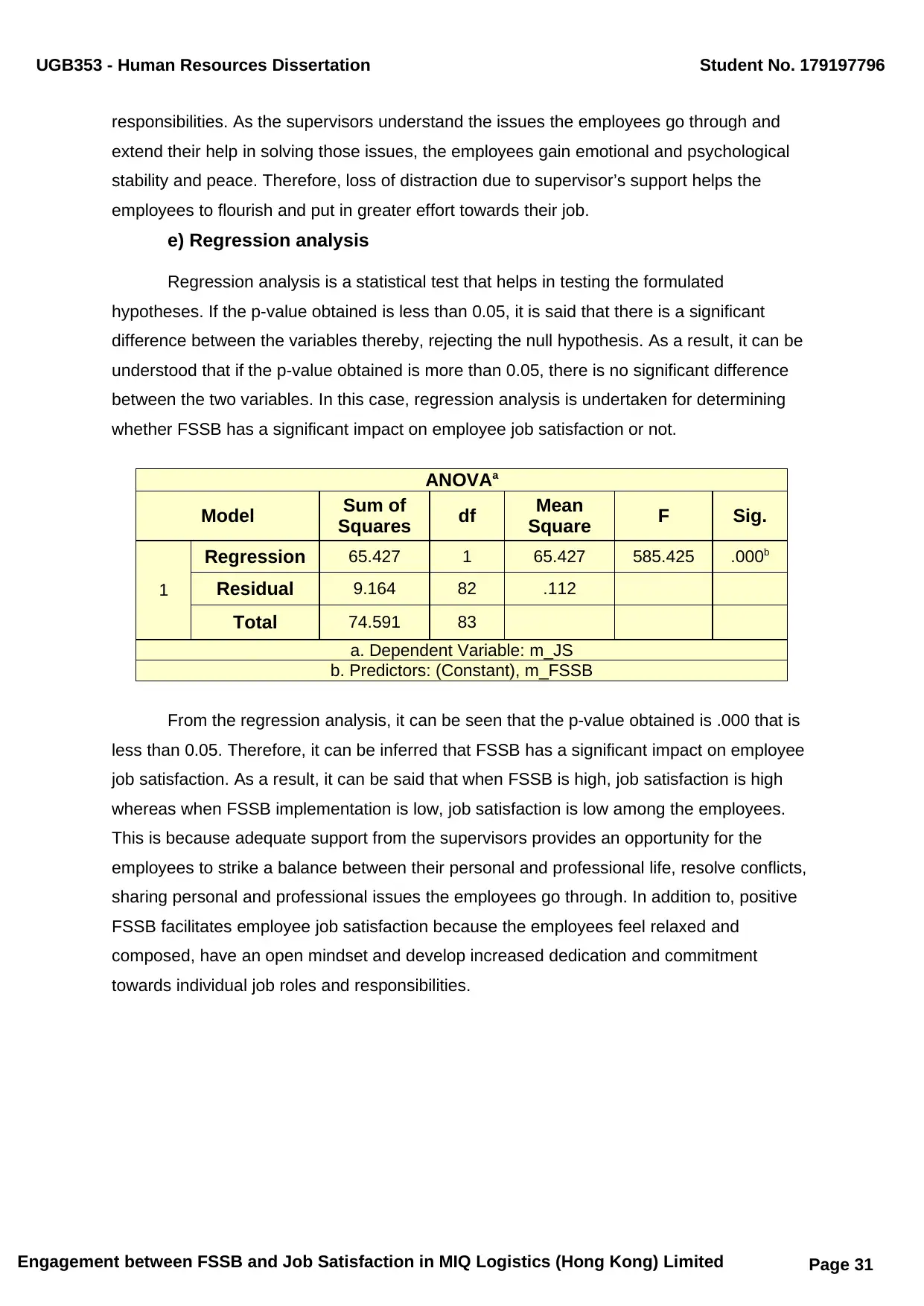
UGB353 - Human Resources Dissertation Student No. 179197796
responsibilities. As the supervisors understand the issues the employees go through and
extend their help in solving those issues, the employees gain emotional and psychological
stability and peace. Therefore, loss of distraction due to supervisor’s support helps the
employees to flourish and put in greater effort towards their job.
e) Regression analysis
Regression analysis is a statistical test that helps in testing the formulated
hypotheses. If the p-value obtained is less than 0.05, it is said that there is a significant
difference between the variables thereby, rejecting the null hypothesis. As a result, it can be
understood that if the p-value obtained is more than 0.05, there is no significant difference
between the two variables. In this case, regression analysis is undertaken for determining
whether FSSB has a significant impact on employee job satisfaction or not.
ANOVAa
Model Sum of
Squares df Mean
Square F Sig.
1
Regression 65.427 1 65.427 585.425 .000b
Residual 9.164 82 .112
Total 74.591 83
a. Dependent Variable: m_JS
b. Predictors: (Constant), m_FSSB
From the regression analysis, it can be seen that the p-value obtained is .000 that is
less than 0.05. Therefore, it can be inferred that FSSB has a significant impact on employee
job satisfaction. As a result, it can be said that when FSSB is high, job satisfaction is high
whereas when FSSB implementation is low, job satisfaction is low among the employees.
This is because adequate support from the supervisors provides an opportunity for the
employees to strike a balance between their personal and professional life, resolve conflicts,
sharing personal and professional issues the employees go through. In addition to, positive
FSSB facilitates employee job satisfaction because the employees feel relaxed and
composed, have an open mindset and develop increased dedication and commitment
towards individual job roles and responsibilities.
Engagement between FSSB and Job Satisfaction in MIQ Logistics (Hong Kong) Limited Page 31
responsibilities. As the supervisors understand the issues the employees go through and
extend their help in solving those issues, the employees gain emotional and psychological
stability and peace. Therefore, loss of distraction due to supervisor’s support helps the
employees to flourish and put in greater effort towards their job.
e) Regression analysis
Regression analysis is a statistical test that helps in testing the formulated
hypotheses. If the p-value obtained is less than 0.05, it is said that there is a significant
difference between the variables thereby, rejecting the null hypothesis. As a result, it can be
understood that if the p-value obtained is more than 0.05, there is no significant difference
between the two variables. In this case, regression analysis is undertaken for determining
whether FSSB has a significant impact on employee job satisfaction or not.
ANOVAa
Model Sum of
Squares df Mean
Square F Sig.
1
Regression 65.427 1 65.427 585.425 .000b
Residual 9.164 82 .112
Total 74.591 83
a. Dependent Variable: m_JS
b. Predictors: (Constant), m_FSSB
From the regression analysis, it can be seen that the p-value obtained is .000 that is
less than 0.05. Therefore, it can be inferred that FSSB has a significant impact on employee
job satisfaction. As a result, it can be said that when FSSB is high, job satisfaction is high
whereas when FSSB implementation is low, job satisfaction is low among the employees.
This is because adequate support from the supervisors provides an opportunity for the
employees to strike a balance between their personal and professional life, resolve conflicts,
sharing personal and professional issues the employees go through. In addition to, positive
FSSB facilitates employee job satisfaction because the employees feel relaxed and
composed, have an open mindset and develop increased dedication and commitment
towards individual job roles and responsibilities.
Engagement between FSSB and Job Satisfaction in MIQ Logistics (Hong Kong) Limited Page 31
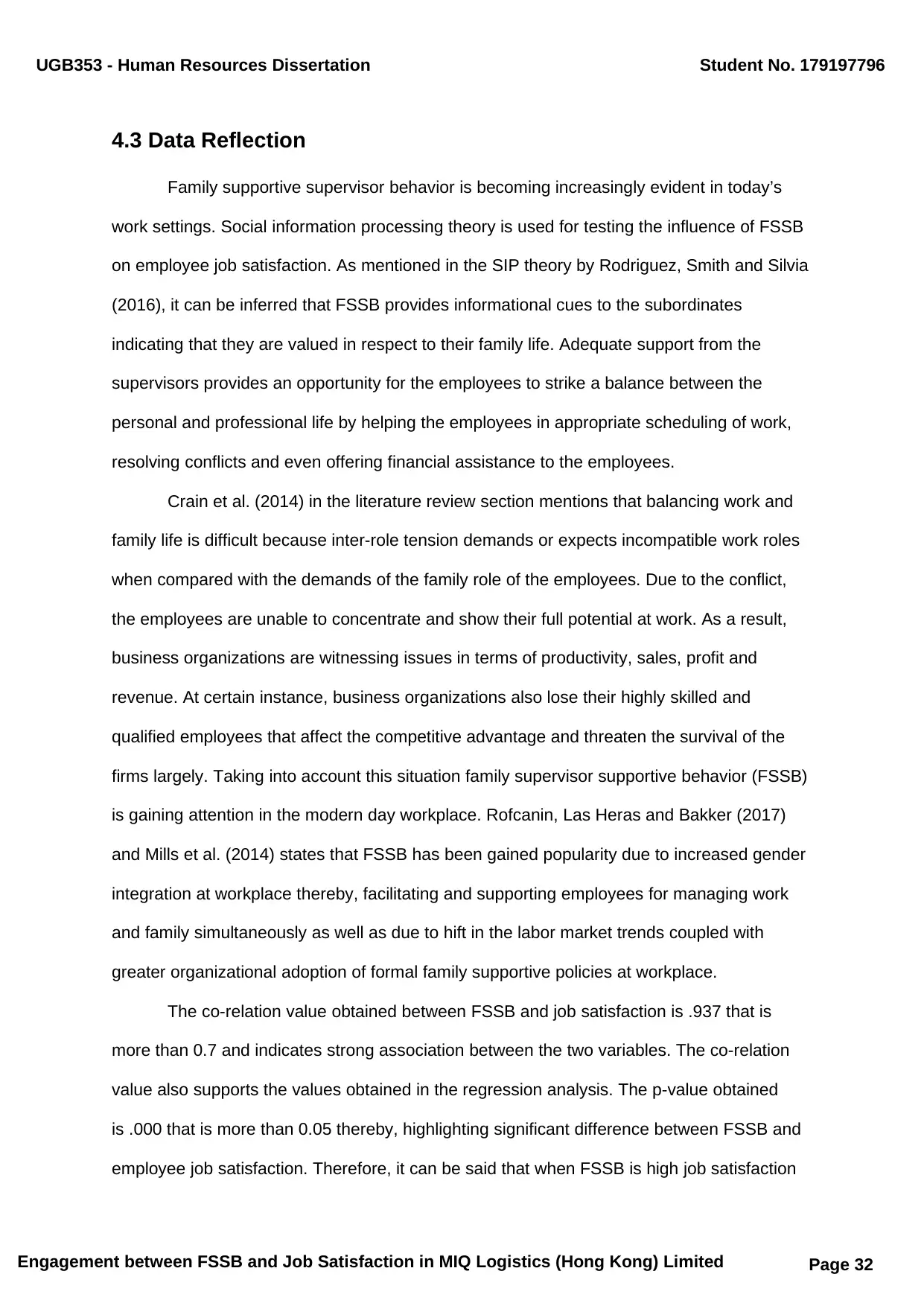
UGB353 - Human Resources Dissertation Student No. 179197796
4.3 Data Reflection
Family supportive supervisor behavior is becoming increasingly evident in today’s
work settings. Social information processing theory is used for testing the influence of FSSB
on employee job satisfaction. As mentioned in the SIP theory by Rodriguez, Smith and Silvia
(2016), it can be inferred that FSSB provides informational cues to the subordinates
indicating that they are valued in respect to their family life. Adequate support from the
supervisors provides an opportunity for the employees to strike a balance between the
personal and professional life by helping the employees in appropriate scheduling of work,
resolving conflicts and even offering financial assistance to the employees.
Crain et al. (2014) in the literature review section mentions that balancing work and
family life is difficult because inter-role tension demands or expects incompatible work roles
when compared with the demands of the family role of the employees. Due to the conflict,
the employees are unable to concentrate and show their full potential at work. As a result,
business organizations are witnessing issues in terms of productivity, sales, profit and
revenue. At certain instance, business organizations also lose their highly skilled and
qualified employees that affect the competitive advantage and threaten the survival of the
firms largely. Taking into account this situation family supervisor supportive behavior (FSSB)
is gaining attention in the modern day workplace. Rofcanin, Las Heras and Bakker (2017)
and Mills et al. (2014) states that FSSB has been gained popularity due to increased gender
integration at workplace thereby, facilitating and supporting employees for managing work
and family simultaneously as well as due to hift in the labor market trends coupled with
greater organizational adoption of formal family supportive policies at workplace.
The co-relation value obtained between FSSB and job satisfaction is .937 that is
more than 0.7 and indicates strong association between the two variables. The co-relation
value also supports the values obtained in the regression analysis. The p-value obtained
is .000 that is more than 0.05 thereby, highlighting significant difference between FSSB and
employee job satisfaction. Therefore, it can be said that when FSSB is high job satisfaction
Engagement between FSSB and Job Satisfaction in MIQ Logistics (Hong Kong) Limited Page 32
4.3 Data Reflection
Family supportive supervisor behavior is becoming increasingly evident in today’s
work settings. Social information processing theory is used for testing the influence of FSSB
on employee job satisfaction. As mentioned in the SIP theory by Rodriguez, Smith and Silvia
(2016), it can be inferred that FSSB provides informational cues to the subordinates
indicating that they are valued in respect to their family life. Adequate support from the
supervisors provides an opportunity for the employees to strike a balance between the
personal and professional life by helping the employees in appropriate scheduling of work,
resolving conflicts and even offering financial assistance to the employees.
Crain et al. (2014) in the literature review section mentions that balancing work and
family life is difficult because inter-role tension demands or expects incompatible work roles
when compared with the demands of the family role of the employees. Due to the conflict,
the employees are unable to concentrate and show their full potential at work. As a result,
business organizations are witnessing issues in terms of productivity, sales, profit and
revenue. At certain instance, business organizations also lose their highly skilled and
qualified employees that affect the competitive advantage and threaten the survival of the
firms largely. Taking into account this situation family supervisor supportive behavior (FSSB)
is gaining attention in the modern day workplace. Rofcanin, Las Heras and Bakker (2017)
and Mills et al. (2014) states that FSSB has been gained popularity due to increased gender
integration at workplace thereby, facilitating and supporting employees for managing work
and family simultaneously as well as due to hift in the labor market trends coupled with
greater organizational adoption of formal family supportive policies at workplace.
The co-relation value obtained between FSSB and job satisfaction is .937 that is
more than 0.7 and indicates strong association between the two variables. The co-relation
value also supports the values obtained in the regression analysis. The p-value obtained
is .000 that is more than 0.05 thereby, highlighting significant difference between FSSB and
employee job satisfaction. Therefore, it can be said that when FSSB is high job satisfaction
Engagement between FSSB and Job Satisfaction in MIQ Logistics (Hong Kong) Limited Page 32
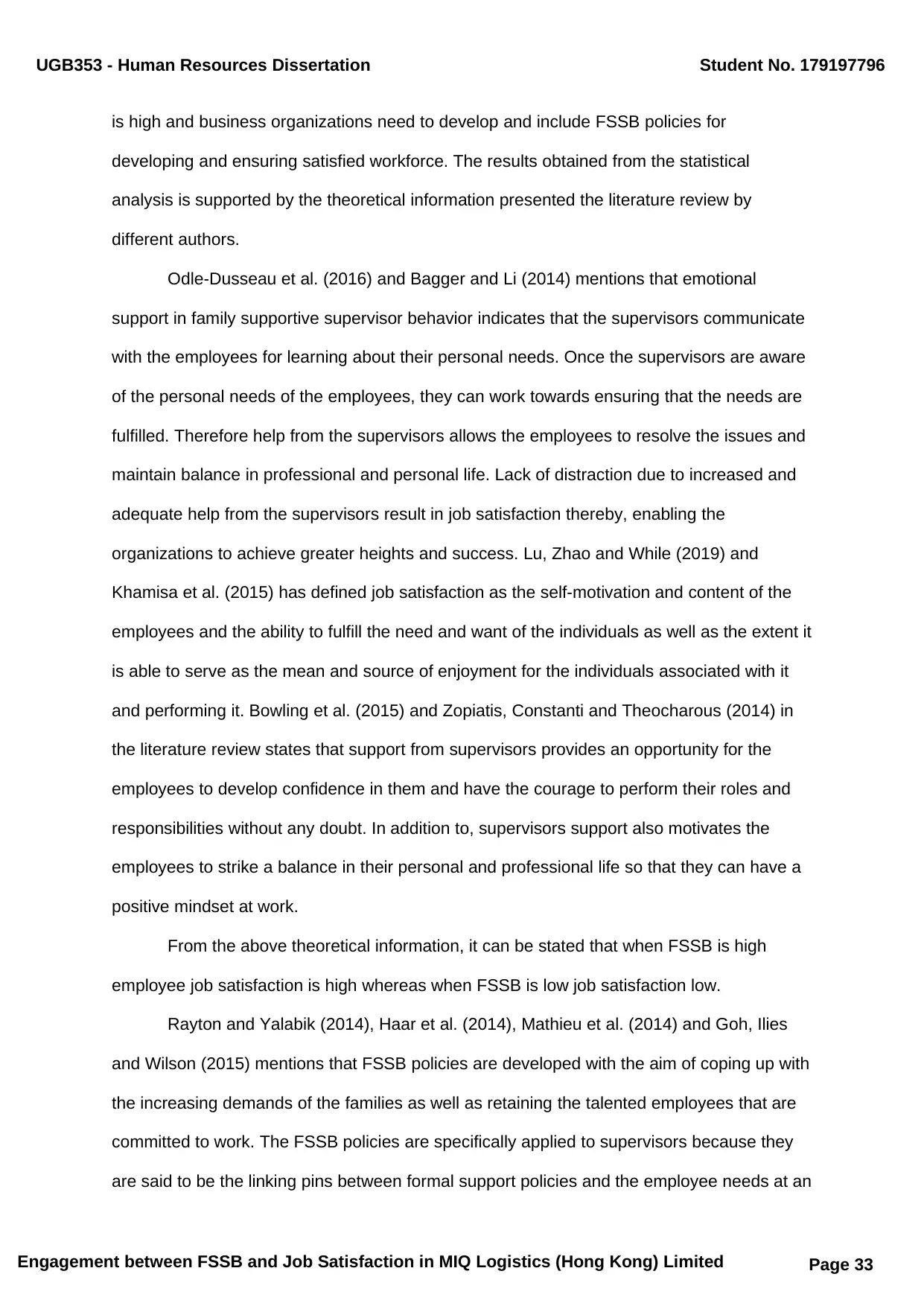
UGB353 - Human Resources Dissertation Student No. 179197796
is high and business organizations need to develop and include FSSB policies for
developing and ensuring satisfied workforce. The results obtained from the statistical
analysis is supported by the theoretical information presented the literature review by
different authors.
Odle-Dusseau et al. (2016) and Bagger and Li (2014) mentions that emotional
support in family supportive supervisor behavior indicates that the supervisors communicate
with the employees for learning about their personal needs. Once the supervisors are aware
of the personal needs of the employees, they can work towards ensuring that the needs are
fulfilled. Therefore help from the supervisors allows the employees to resolve the issues and
maintain balance in professional and personal life. Lack of distraction due to increased and
adequate help from the supervisors result in job satisfaction thereby, enabling the
organizations to achieve greater heights and success. Lu, Zhao and While (2019) and
Khamisa et al. (2015) has defined job satisfaction as the self-motivation and content of the
employees and the ability to fulfill the need and want of the individuals as well as the extent it
is able to serve as the mean and source of enjoyment for the individuals associated with it
and performing it. Bowling et al. (2015) and Zopiatis, Constanti and Theocharous (2014) in
the literature review states that support from supervisors provides an opportunity for the
employees to develop confidence in them and have the courage to perform their roles and
responsibilities without any doubt. In addition to, supervisors support also motivates the
employees to strike a balance in their personal and professional life so that they can have a
positive mindset at work.
From the above theoretical information, it can be stated that when FSSB is high
employee job satisfaction is high whereas when FSSB is low job satisfaction low.
Rayton and Yalabik (2014), Haar et al. (2014), Mathieu et al. (2014) and Goh, Ilies
and Wilson (2015) mentions that FSSB policies are developed with the aim of coping up with
the increasing demands of the families as well as retaining the talented employees that are
committed to work. The FSSB policies are specifically applied to supervisors because they
are said to be the linking pins between formal support policies and the employee needs at an
Engagement between FSSB and Job Satisfaction in MIQ Logistics (Hong Kong) Limited Page 33
is high and business organizations need to develop and include FSSB policies for
developing and ensuring satisfied workforce. The results obtained from the statistical
analysis is supported by the theoretical information presented the literature review by
different authors.
Odle-Dusseau et al. (2016) and Bagger and Li (2014) mentions that emotional
support in family supportive supervisor behavior indicates that the supervisors communicate
with the employees for learning about their personal needs. Once the supervisors are aware
of the personal needs of the employees, they can work towards ensuring that the needs are
fulfilled. Therefore help from the supervisors allows the employees to resolve the issues and
maintain balance in professional and personal life. Lack of distraction due to increased and
adequate help from the supervisors result in job satisfaction thereby, enabling the
organizations to achieve greater heights and success. Lu, Zhao and While (2019) and
Khamisa et al. (2015) has defined job satisfaction as the self-motivation and content of the
employees and the ability to fulfill the need and want of the individuals as well as the extent it
is able to serve as the mean and source of enjoyment for the individuals associated with it
and performing it. Bowling et al. (2015) and Zopiatis, Constanti and Theocharous (2014) in
the literature review states that support from supervisors provides an opportunity for the
employees to develop confidence in them and have the courage to perform their roles and
responsibilities without any doubt. In addition to, supervisors support also motivates the
employees to strike a balance in their personal and professional life so that they can have a
positive mindset at work.
From the above theoretical information, it can be stated that when FSSB is high
employee job satisfaction is high whereas when FSSB is low job satisfaction low.
Rayton and Yalabik (2014), Haar et al. (2014), Mathieu et al. (2014) and Goh, Ilies
and Wilson (2015) mentions that FSSB policies are developed with the aim of coping up with
the increasing demands of the families as well as retaining the talented employees that are
committed to work. The FSSB policies are specifically applied to supervisors because they
are said to be the linking pins between formal support policies and the employee needs at an
Engagement between FSSB and Job Satisfaction in MIQ Logistics (Hong Kong) Limited Page 33
Secure Best Marks with AI Grader
Need help grading? Try our AI Grader for instant feedback on your assignments.
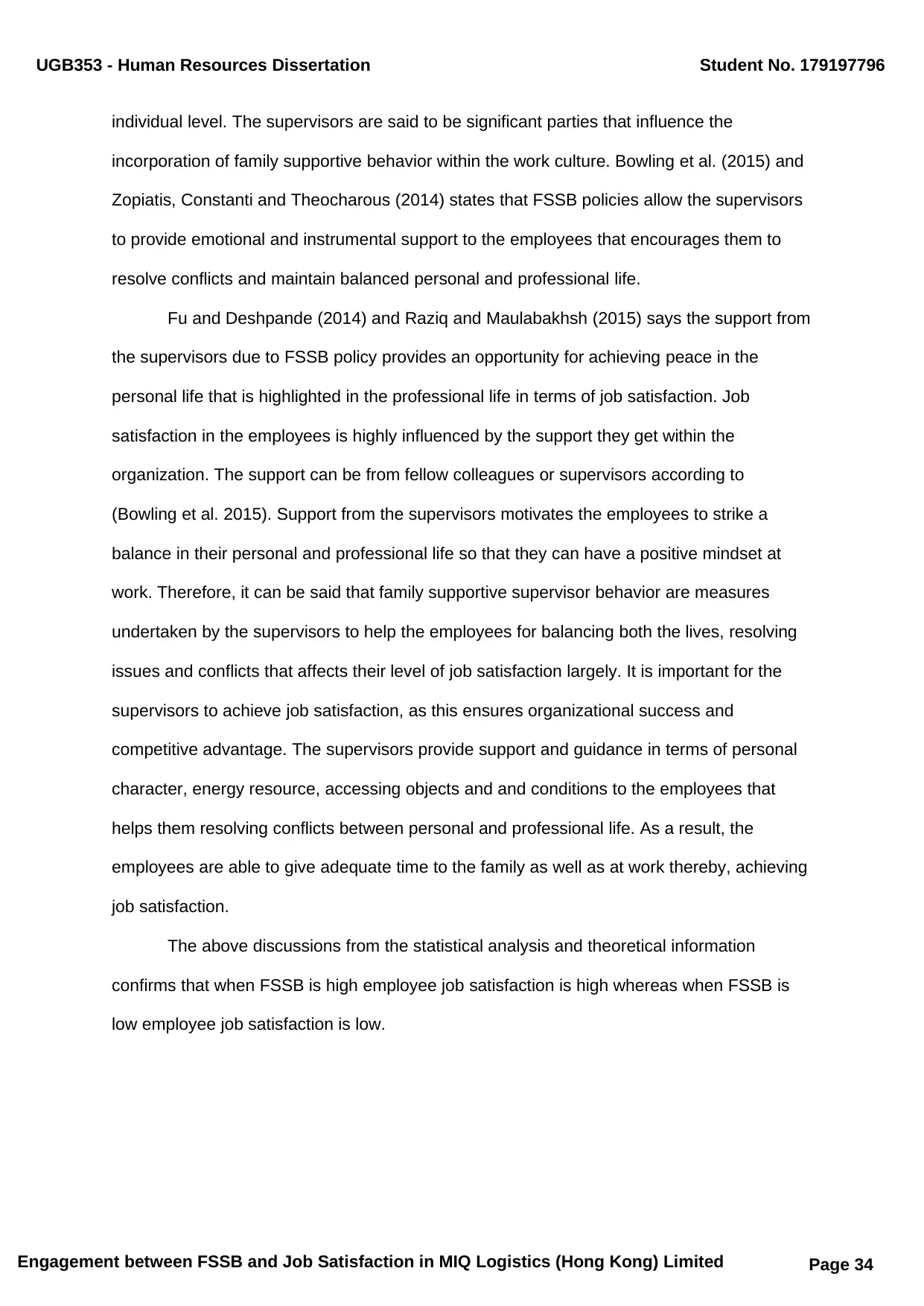
UGB353 - Human Resources Dissertation Student No. 179197796
individual level. The supervisors are said to be significant parties that influence the
incorporation of family supportive behavior within the work culture. Bowling et al. (2015) and
Zopiatis, Constanti and Theocharous (2014) states that FSSB policies allow the supervisors
to provide emotional and instrumental support to the employees that encourages them to
resolve conflicts and maintain balanced personal and professional life.
Fu and Deshpande (2014) and Raziq and Maulabakhsh (2015) says the support from
the supervisors due to FSSB policy provides an opportunity for achieving peace in the
personal life that is highlighted in the professional life in terms of job satisfaction. Job
satisfaction in the employees is highly influenced by the support they get within the
organization. The support can be from fellow colleagues or supervisors according to
(Bowling et al. 2015). Support from the supervisors motivates the employees to strike a
balance in their personal and professional life so that they can have a positive mindset at
work. Therefore, it can be said that family supportive supervisor behavior are measures
undertaken by the supervisors to help the employees for balancing both the lives, resolving
issues and conflicts that affects their level of job satisfaction largely. It is important for the
supervisors to achieve job satisfaction, as this ensures organizational success and
competitive advantage. The supervisors provide support and guidance in terms of personal
character, energy resource, accessing objects and and conditions to the employees that
helps them resolving conflicts between personal and professional life. As a result, the
employees are able to give adequate time to the family as well as at work thereby, achieving
job satisfaction.
The above discussions from the statistical analysis and theoretical information
confirms that when FSSB is high employee job satisfaction is high whereas when FSSB is
low employee job satisfaction is low.
Engagement between FSSB and Job Satisfaction in MIQ Logistics (Hong Kong) Limited Page 34
individual level. The supervisors are said to be significant parties that influence the
incorporation of family supportive behavior within the work culture. Bowling et al. (2015) and
Zopiatis, Constanti and Theocharous (2014) states that FSSB policies allow the supervisors
to provide emotional and instrumental support to the employees that encourages them to
resolve conflicts and maintain balanced personal and professional life.
Fu and Deshpande (2014) and Raziq and Maulabakhsh (2015) says the support from
the supervisors due to FSSB policy provides an opportunity for achieving peace in the
personal life that is highlighted in the professional life in terms of job satisfaction. Job
satisfaction in the employees is highly influenced by the support they get within the
organization. The support can be from fellow colleagues or supervisors according to
(Bowling et al. 2015). Support from the supervisors motivates the employees to strike a
balance in their personal and professional life so that they can have a positive mindset at
work. Therefore, it can be said that family supportive supervisor behavior are measures
undertaken by the supervisors to help the employees for balancing both the lives, resolving
issues and conflicts that affects their level of job satisfaction largely. It is important for the
supervisors to achieve job satisfaction, as this ensures organizational success and
competitive advantage. The supervisors provide support and guidance in terms of personal
character, energy resource, accessing objects and and conditions to the employees that
helps them resolving conflicts between personal and professional life. As a result, the
employees are able to give adequate time to the family as well as at work thereby, achieving
job satisfaction.
The above discussions from the statistical analysis and theoretical information
confirms that when FSSB is high employee job satisfaction is high whereas when FSSB is
low employee job satisfaction is low.
Engagement between FSSB and Job Satisfaction in MIQ Logistics (Hong Kong) Limited Page 34
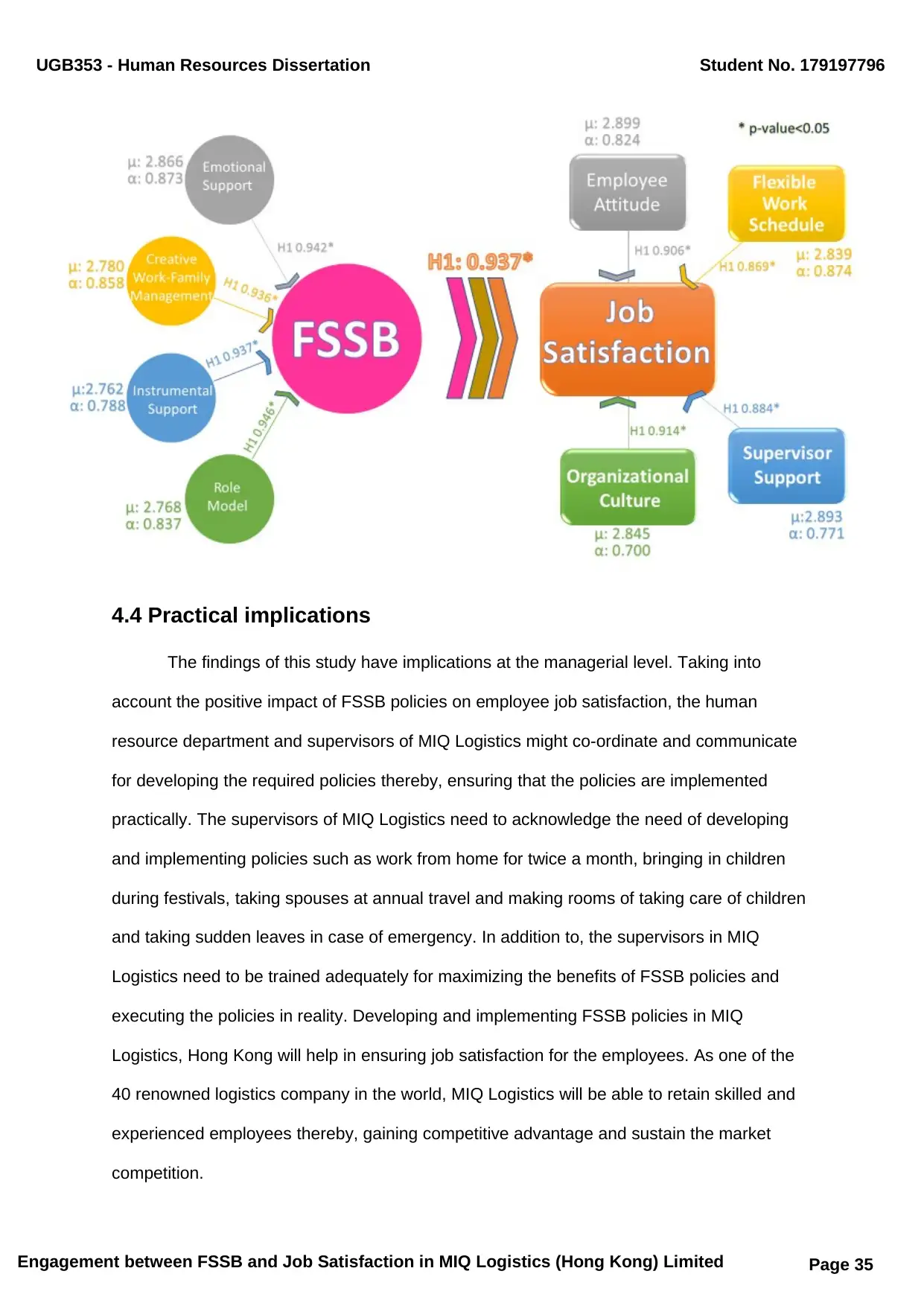
UGB353 - Human Resources Dissertation Student No. 179197796
4.4 Practical implications
The findings of this study have implications at the managerial level. Taking into
account the positive impact of FSSB policies on employee job satisfaction, the human
resource department and supervisors of MIQ Logistics might co-ordinate and communicate
for developing the required policies thereby, ensuring that the policies are implemented
practically. The supervisors of MIQ Logistics need to acknowledge the need of developing
and implementing policies such as work from home for twice a month, bringing in children
during festivals, taking spouses at annual travel and making rooms of taking care of children
and taking sudden leaves in case of emergency. In addition to, the supervisors in MIQ
Logistics need to be trained adequately for maximizing the benefits of FSSB policies and
executing the policies in reality. Developing and implementing FSSB policies in MIQ
Logistics, Hong Kong will help in ensuring job satisfaction for the employees. As one of the
40 renowned logistics company in the world, MIQ Logistics will be able to retain skilled and
experienced employees thereby, gaining competitive advantage and sustain the market
competition.
Engagement between FSSB and Job Satisfaction in MIQ Logistics (Hong Kong) Limited Page 35
4.4 Practical implications
The findings of this study have implications at the managerial level. Taking into
account the positive impact of FSSB policies on employee job satisfaction, the human
resource department and supervisors of MIQ Logistics might co-ordinate and communicate
for developing the required policies thereby, ensuring that the policies are implemented
practically. The supervisors of MIQ Logistics need to acknowledge the need of developing
and implementing policies such as work from home for twice a month, bringing in children
during festivals, taking spouses at annual travel and making rooms of taking care of children
and taking sudden leaves in case of emergency. In addition to, the supervisors in MIQ
Logistics need to be trained adequately for maximizing the benefits of FSSB policies and
executing the policies in reality. Developing and implementing FSSB policies in MIQ
Logistics, Hong Kong will help in ensuring job satisfaction for the employees. As one of the
40 renowned logistics company in the world, MIQ Logistics will be able to retain skilled and
experienced employees thereby, gaining competitive advantage and sustain the market
competition.
Engagement between FSSB and Job Satisfaction in MIQ Logistics (Hong Kong) Limited Page 35
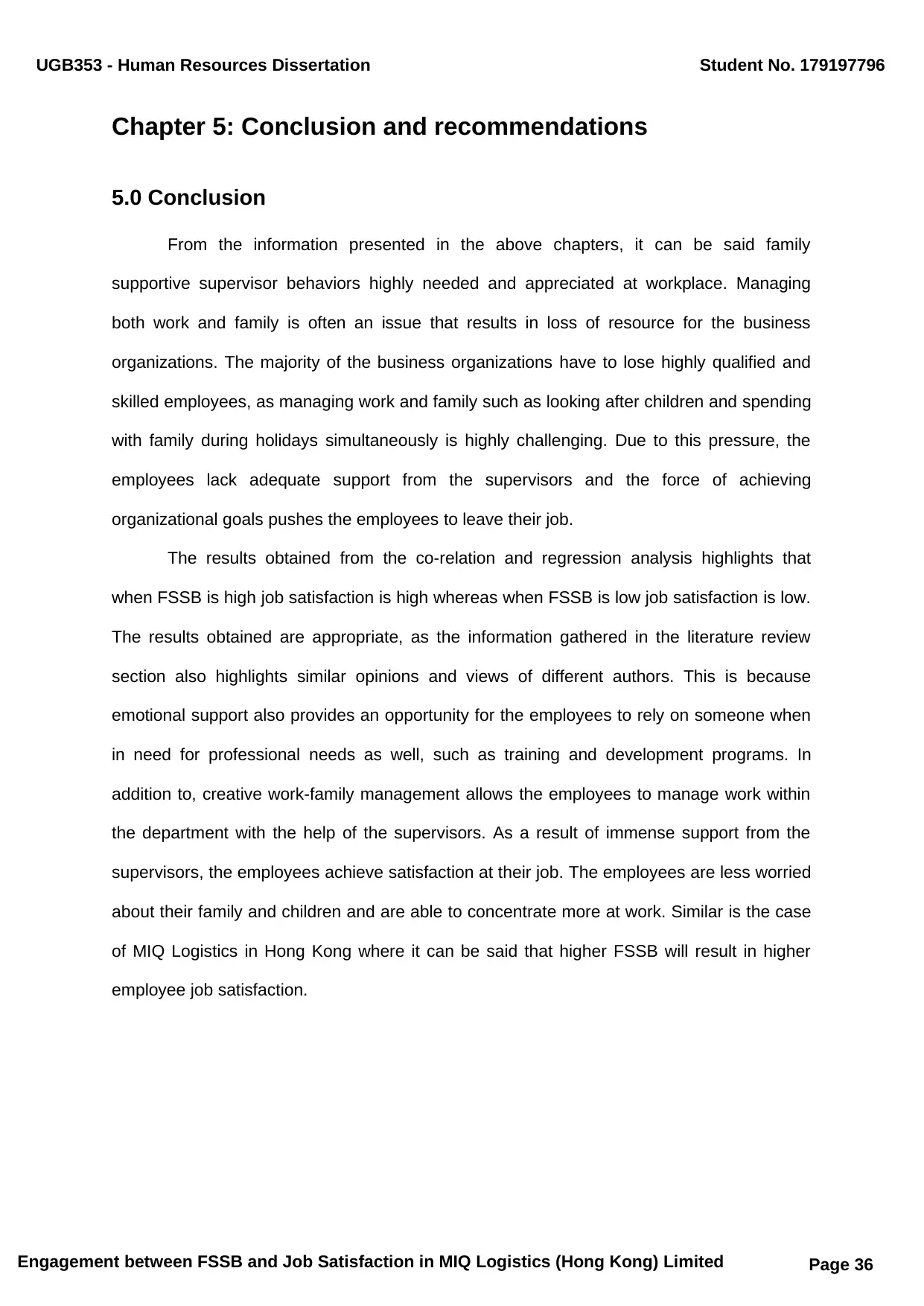
UGB353 - Human Resources Dissertation Student No. 179197796
Chapter 5: Conclusion and recommendations
5.0 Conclusion
From the information presented in the above chapters, it can be said family
supportive supervisor behaviors highly needed and appreciated at workplace. Managing
both work and family is often an issue that results in loss of resource for the business
organizations. The majority of the business organizations have to lose highly qualified and
skilled employees, as managing work and family such as looking after children and spending
with family during holidays simultaneously is highly challenging. Due to this pressure, the
employees lack adequate support from the supervisors and the force of achieving
organizational goals pushes the employees to leave their job.
The results obtained from the co-relation and regression analysis highlights that
when FSSB is high job satisfaction is high whereas when FSSB is low job satisfaction is low.
The results obtained are appropriate, as the information gathered in the literature review
section also highlights similar opinions and views of different authors. This is because
emotional support also provides an opportunity for the employees to rely on someone when
in need for professional needs as well, such as training and development programs. In
addition to, creative work-family management allows the employees to manage work within
the department with the help of the supervisors. As a result of immense support from the
supervisors, the employees achieve satisfaction at their job. The employees are less worried
about their family and children and are able to concentrate more at work. Similar is the case
of MIQ Logistics in Hong Kong where it can be said that higher FSSB will result in higher
employee job satisfaction.
Engagement between FSSB and Job Satisfaction in MIQ Logistics (Hong Kong) Limited Page 36
Chapter 5: Conclusion and recommendations
5.0 Conclusion
From the information presented in the above chapters, it can be said family
supportive supervisor behaviors highly needed and appreciated at workplace. Managing
both work and family is often an issue that results in loss of resource for the business
organizations. The majority of the business organizations have to lose highly qualified and
skilled employees, as managing work and family such as looking after children and spending
with family during holidays simultaneously is highly challenging. Due to this pressure, the
employees lack adequate support from the supervisors and the force of achieving
organizational goals pushes the employees to leave their job.
The results obtained from the co-relation and regression analysis highlights that
when FSSB is high job satisfaction is high whereas when FSSB is low job satisfaction is low.
The results obtained are appropriate, as the information gathered in the literature review
section also highlights similar opinions and views of different authors. This is because
emotional support also provides an opportunity for the employees to rely on someone when
in need for professional needs as well, such as training and development programs. In
addition to, creative work-family management allows the employees to manage work within
the department with the help of the supervisors. As a result of immense support from the
supervisors, the employees achieve satisfaction at their job. The employees are less worried
about their family and children and are able to concentrate more at work. Similar is the case
of MIQ Logistics in Hong Kong where it can be said that higher FSSB will result in higher
employee job satisfaction.
Engagement between FSSB and Job Satisfaction in MIQ Logistics (Hong Kong) Limited Page 36
Paraphrase This Document
Need a fresh take? Get an instant paraphrase of this document with our AI Paraphraser
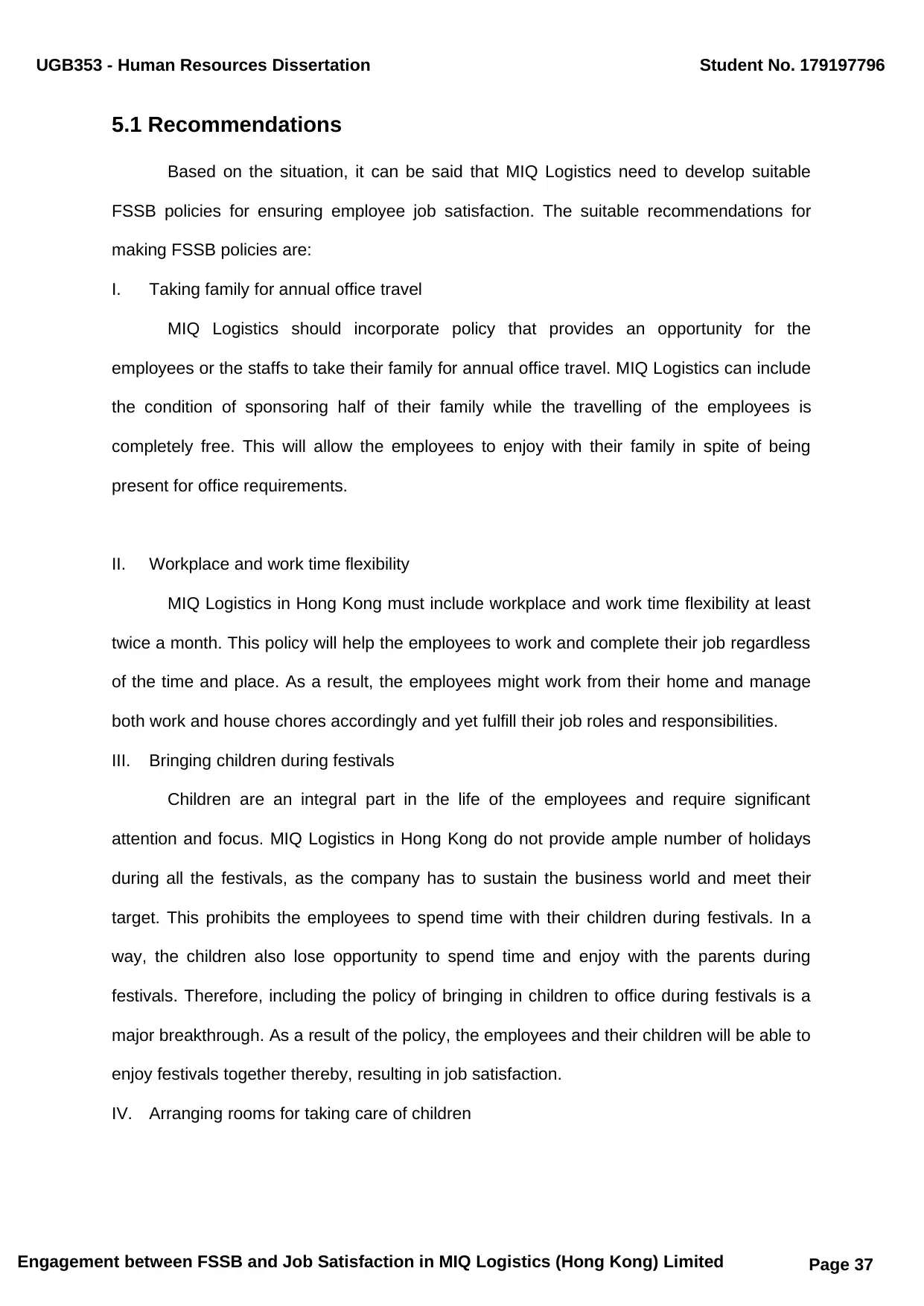
UGB353 - Human Resources Dissertation Student No. 179197796
5.1 Recommendations
Based on the situation, it can be said that MIQ Logistics need to develop suitable
FSSB policies for ensuring employee job satisfaction. The suitable recommendations for
making FSSB policies are:
I. Taking family for annual office travel
MIQ Logistics should incorporate policy that provides an opportunity for the
employees or the staffs to take their family for annual office travel. MIQ Logistics can include
the condition of sponsoring half of their family while the travelling of the employees is
completely free. This will allow the employees to enjoy with their family in spite of being
present for office requirements.
II. Workplace and work time flexibility
MIQ Logistics in Hong Kong must include workplace and work time flexibility at least
twice a month. This policy will help the employees to work and complete their job regardless
of the time and place. As a result, the employees might work from their home and manage
both work and house chores accordingly and yet fulfill their job roles and responsibilities.
III. Bringing children during festivals
Children are an integral part in the life of the employees and require significant
attention and focus. MIQ Logistics in Hong Kong do not provide ample number of holidays
during all the festivals, as the company has to sustain the business world and meet their
target. This prohibits the employees to spend time with their children during festivals. In a
way, the children also lose opportunity to spend time and enjoy with the parents during
festivals. Therefore, including the policy of bringing in children to office during festivals is a
major breakthrough. As a result of the policy, the employees and their children will be able to
enjoy festivals together thereby, resulting in job satisfaction.
IV. Arranging rooms for taking care of children
Engagement between FSSB and Job Satisfaction in MIQ Logistics (Hong Kong) Limited Page 37
5.1 Recommendations
Based on the situation, it can be said that MIQ Logistics need to develop suitable
FSSB policies for ensuring employee job satisfaction. The suitable recommendations for
making FSSB policies are:
I. Taking family for annual office travel
MIQ Logistics should incorporate policy that provides an opportunity for the
employees or the staffs to take their family for annual office travel. MIQ Logistics can include
the condition of sponsoring half of their family while the travelling of the employees is
completely free. This will allow the employees to enjoy with their family in spite of being
present for office requirements.
II. Workplace and work time flexibility
MIQ Logistics in Hong Kong must include workplace and work time flexibility at least
twice a month. This policy will help the employees to work and complete their job regardless
of the time and place. As a result, the employees might work from their home and manage
both work and house chores accordingly and yet fulfill their job roles and responsibilities.
III. Bringing children during festivals
Children are an integral part in the life of the employees and require significant
attention and focus. MIQ Logistics in Hong Kong do not provide ample number of holidays
during all the festivals, as the company has to sustain the business world and meet their
target. This prohibits the employees to spend time with their children during festivals. In a
way, the children also lose opportunity to spend time and enjoy with the parents during
festivals. Therefore, including the policy of bringing in children to office during festivals is a
major breakthrough. As a result of the policy, the employees and their children will be able to
enjoy festivals together thereby, resulting in job satisfaction.
IV. Arranging rooms for taking care of children
Engagement between FSSB and Job Satisfaction in MIQ Logistics (Hong Kong) Limited Page 37
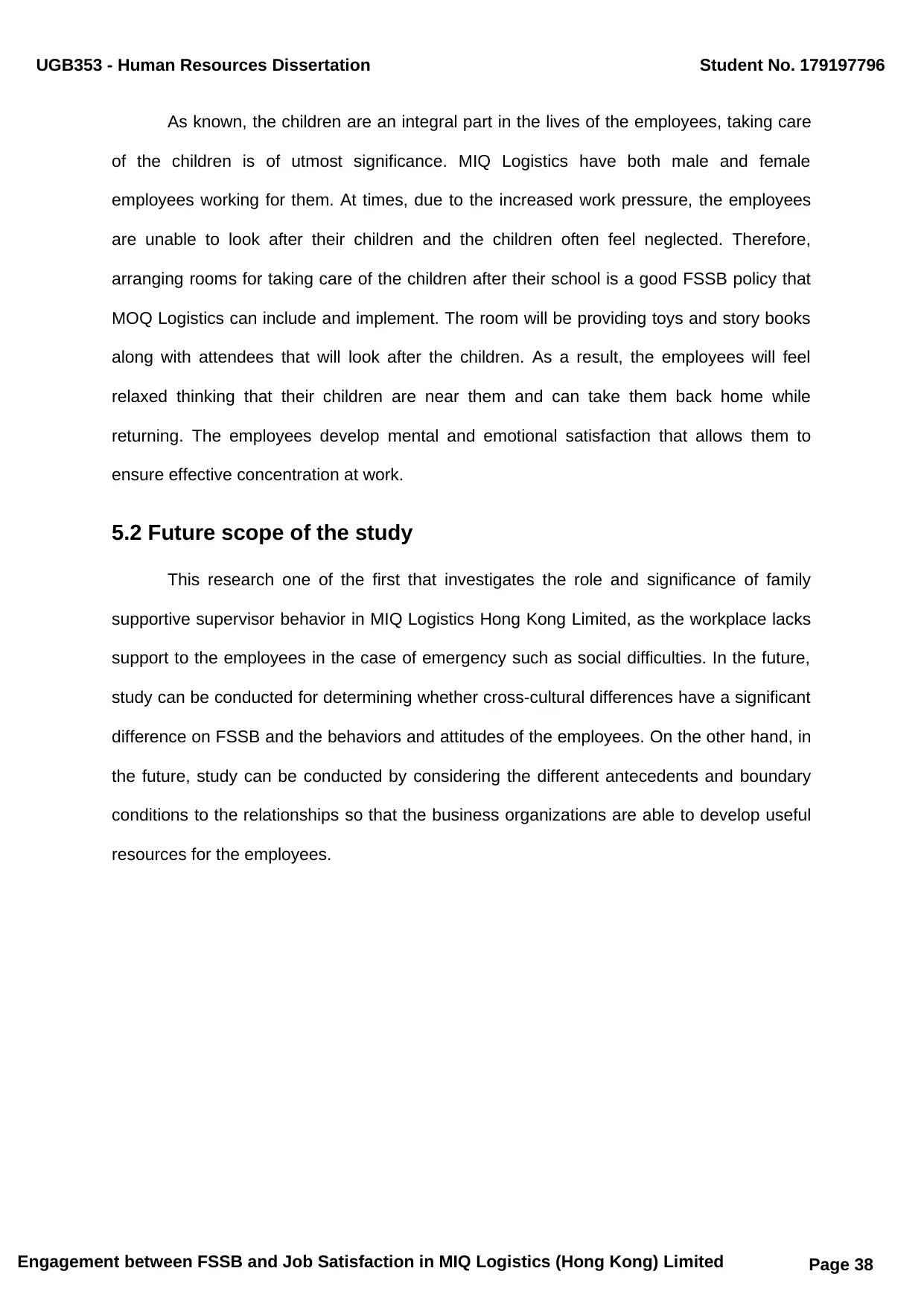
UGB353 - Human Resources Dissertation Student No. 179197796
As known, the children are an integral part in the lives of the employees, taking care
of the children is of utmost significance. MIQ Logistics have both male and female
employees working for them. At times, due to the increased work pressure, the employees
are unable to look after their children and the children often feel neglected. Therefore,
arranging rooms for taking care of the children after their school is a good FSSB policy that
MOQ Logistics can include and implement. The room will be providing toys and story books
along with attendees that will look after the children. As a result, the employees will feel
relaxed thinking that their children are near them and can take them back home while
returning. The employees develop mental and emotional satisfaction that allows them to
ensure effective concentration at work.
5.2 Future scope of the study
This research one of the first that investigates the role and significance of family
supportive supervisor behavior in MIQ Logistics Hong Kong Limited, as the workplace lacks
support to the employees in the case of emergency such as social difficulties. In the future,
study can be conducted for determining whether cross-cultural differences have a significant
difference on FSSB and the behaviors and attitudes of the employees. On the other hand, in
the future, study can be conducted by considering the different antecedents and boundary
conditions to the relationships so that the business organizations are able to develop useful
resources for the employees.
Engagement between FSSB and Job Satisfaction in MIQ Logistics (Hong Kong) Limited Page 38
As known, the children are an integral part in the lives of the employees, taking care
of the children is of utmost significance. MIQ Logistics have both male and female
employees working for them. At times, due to the increased work pressure, the employees
are unable to look after their children and the children often feel neglected. Therefore,
arranging rooms for taking care of the children after their school is a good FSSB policy that
MOQ Logistics can include and implement. The room will be providing toys and story books
along with attendees that will look after the children. As a result, the employees will feel
relaxed thinking that their children are near them and can take them back home while
returning. The employees develop mental and emotional satisfaction that allows them to
ensure effective concentration at work.
5.2 Future scope of the study
This research one of the first that investigates the role and significance of family
supportive supervisor behavior in MIQ Logistics Hong Kong Limited, as the workplace lacks
support to the employees in the case of emergency such as social difficulties. In the future,
study can be conducted for determining whether cross-cultural differences have a significant
difference on FSSB and the behaviors and attitudes of the employees. On the other hand, in
the future, study can be conducted by considering the different antecedents and boundary
conditions to the relationships so that the business organizations are able to develop useful
resources for the employees.
Engagement between FSSB and Job Satisfaction in MIQ Logistics (Hong Kong) Limited Page 38
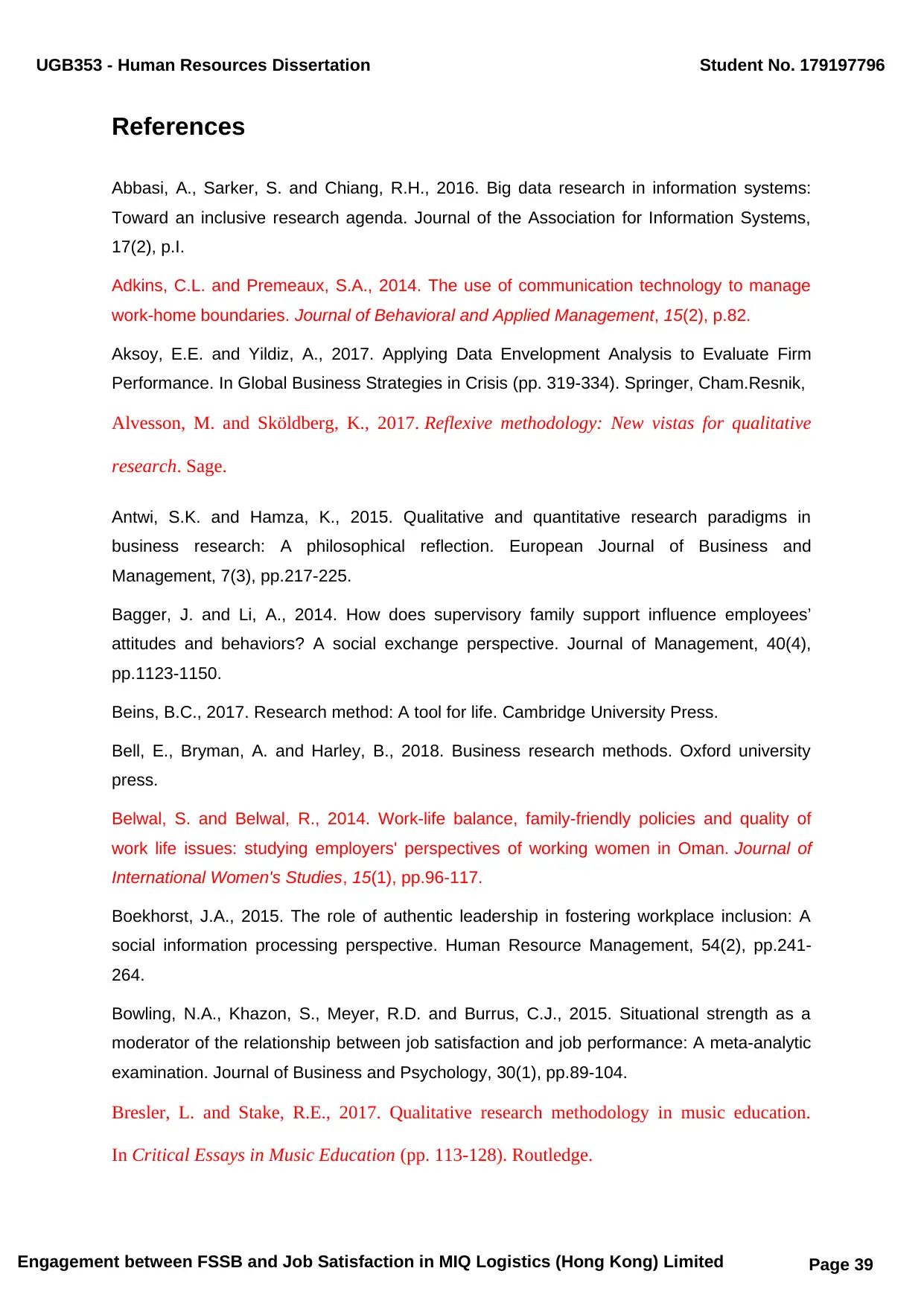
UGB353 - Human Resources Dissertation Student No. 179197796
References
Abbasi, A., Sarker, S. and Chiang, R.H., 2016. Big data research in information systems:
Toward an inclusive research agenda. Journal of the Association for Information Systems,
17(2), p.I.
Adkins, C.L. and Premeaux, S.A., 2014. The use of communication technology to manage
work-home boundaries. Journal of Behavioral and Applied Management, 15(2), p.82.
Aksoy, E.E. and Yildiz, A., 2017. Applying Data Envelopment Analysis to Evaluate Firm
Performance. In Global Business Strategies in Crisis (pp. 319-334). Springer, Cham.Resnik,
Alvesson, M. and Sköldberg, K., 2017. Reflexive methodology: New vistas for qualitative
research. Sage.
Antwi, S.K. and Hamza, K., 2015. Qualitative and quantitative research paradigms in
business research: A philosophical reflection. European Journal of Business and
Management, 7(3), pp.217-225.
Bagger, J. and Li, A., 2014. How does supervisory family support influence employees’
attitudes and behaviors? A social exchange perspective. Journal of Management, 40(4),
pp.1123-1150.
Beins, B.C., 2017. Research method: A tool for life. Cambridge University Press.
Bell, E., Bryman, A. and Harley, B., 2018. Business research methods. Oxford university
press.
Belwal, S. and Belwal, R., 2014. Work-life balance, family-friendly policies and quality of
work life issues: studying employers' perspectives of working women in Oman. Journal of
International Women's Studies, 15(1), pp.96-117.
Boekhorst, J.A., 2015. The role of authentic leadership in fostering workplace inclusion: A
social information processing perspective. Human Resource Management, 54(2), pp.241-
264.
Bowling, N.A., Khazon, S., Meyer, R.D. and Burrus, C.J., 2015. Situational strength as a
moderator of the relationship between job satisfaction and job performance: A meta-analytic
examination. Journal of Business and Psychology, 30(1), pp.89-104.
Bresler, L. and Stake, R.E., 2017. Qualitative research methodology in music education.
In Critical Essays in Music Education (pp. 113-128). Routledge.
Engagement between FSSB and Job Satisfaction in MIQ Logistics (Hong Kong) Limited Page 39
References
Abbasi, A., Sarker, S. and Chiang, R.H., 2016. Big data research in information systems:
Toward an inclusive research agenda. Journal of the Association for Information Systems,
17(2), p.I.
Adkins, C.L. and Premeaux, S.A., 2014. The use of communication technology to manage
work-home boundaries. Journal of Behavioral and Applied Management, 15(2), p.82.
Aksoy, E.E. and Yildiz, A., 2017. Applying Data Envelopment Analysis to Evaluate Firm
Performance. In Global Business Strategies in Crisis (pp. 319-334). Springer, Cham.Resnik,
Alvesson, M. and Sköldberg, K., 2017. Reflexive methodology: New vistas for qualitative
research. Sage.
Antwi, S.K. and Hamza, K., 2015. Qualitative and quantitative research paradigms in
business research: A philosophical reflection. European Journal of Business and
Management, 7(3), pp.217-225.
Bagger, J. and Li, A., 2014. How does supervisory family support influence employees’
attitudes and behaviors? A social exchange perspective. Journal of Management, 40(4),
pp.1123-1150.
Beins, B.C., 2017. Research method: A tool for life. Cambridge University Press.
Bell, E., Bryman, A. and Harley, B., 2018. Business research methods. Oxford university
press.
Belwal, S. and Belwal, R., 2014. Work-life balance, family-friendly policies and quality of
work life issues: studying employers' perspectives of working women in Oman. Journal of
International Women's Studies, 15(1), pp.96-117.
Boekhorst, J.A., 2015. The role of authentic leadership in fostering workplace inclusion: A
social information processing perspective. Human Resource Management, 54(2), pp.241-
264.
Bowling, N.A., Khazon, S., Meyer, R.D. and Burrus, C.J., 2015. Situational strength as a
moderator of the relationship between job satisfaction and job performance: A meta-analytic
examination. Journal of Business and Psychology, 30(1), pp.89-104.
Bresler, L. and Stake, R.E., 2017. Qualitative research methodology in music education.
In Critical Essays in Music Education (pp. 113-128). Routledge.
Engagement between FSSB and Job Satisfaction in MIQ Logistics (Hong Kong) Limited Page 39
Secure Best Marks with AI Grader
Need help grading? Try our AI Grader for instant feedback on your assignments.
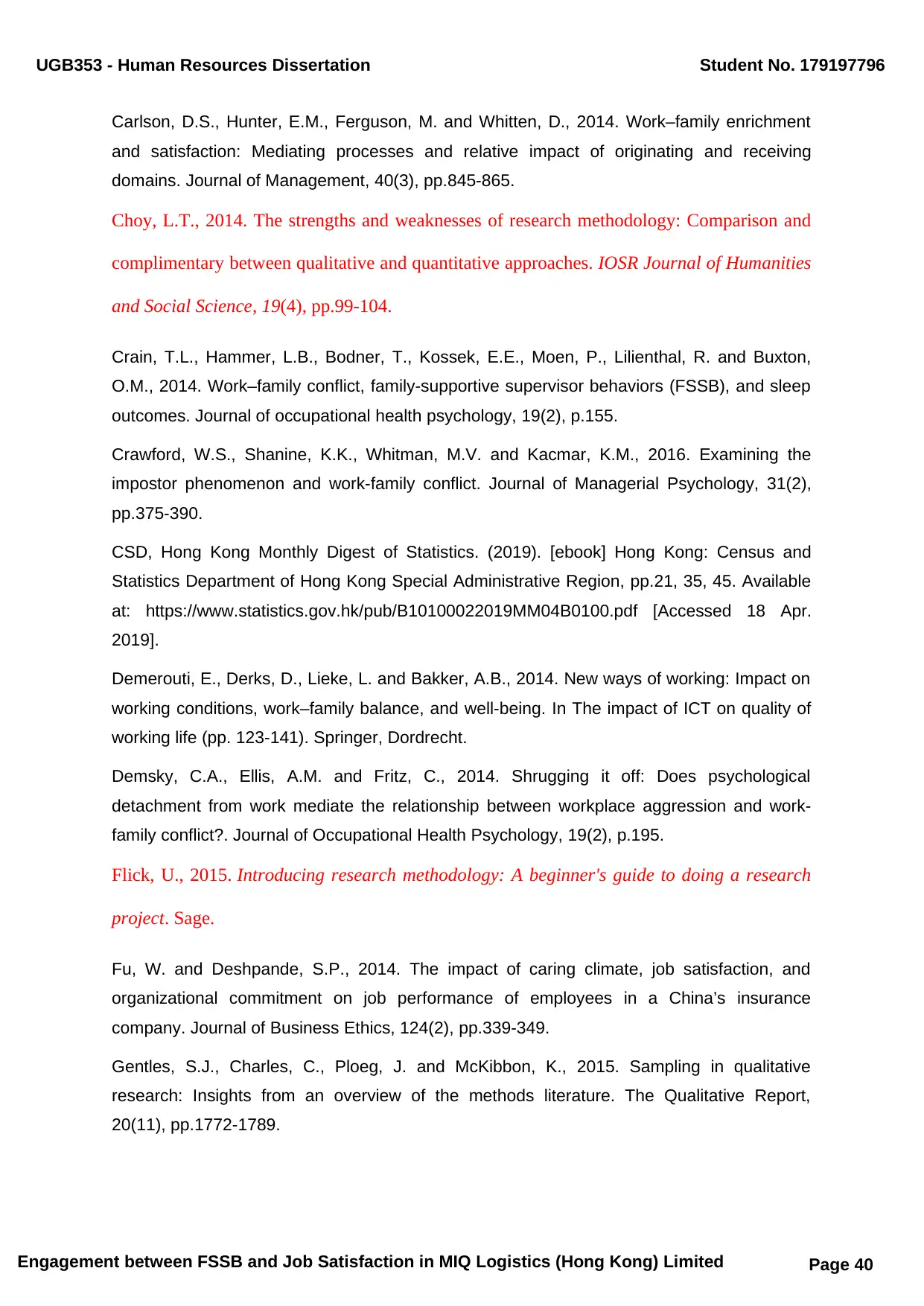
UGB353 - Human Resources Dissertation Student No. 179197796
Carlson, D.S., Hunter, E.M., Ferguson, M. and Whitten, D., 2014. Work–family enrichment
and satisfaction: Mediating processes and relative impact of originating and receiving
domains. Journal of Management, 40(3), pp.845-865.
Choy, L.T., 2014. The strengths and weaknesses of research methodology: Comparison and
complimentary between qualitative and quantitative approaches. IOSR Journal of Humanities
and Social Science, 19(4), pp.99-104.
Crain, T.L., Hammer, L.B., Bodner, T., Kossek, E.E., Moen, P., Lilienthal, R. and Buxton,
O.M., 2014. Work–family conflict, family-supportive supervisor behaviors (FSSB), and sleep
outcomes. Journal of occupational health psychology, 19(2), p.155.
Crawford, W.S., Shanine, K.K., Whitman, M.V. and Kacmar, K.M., 2016. Examining the
impostor phenomenon and work-family conflict. Journal of Managerial Psychology, 31(2),
pp.375-390.
CSD, Hong Kong Monthly Digest of Statistics. (2019). [ebook] Hong Kong: Census and
Statistics Department of Hong Kong Special Administrative Region, pp.21, 35, 45. Available
at: https://www.statistics.gov.hk/pub/B10100022019MM04B0100.pdf [Accessed 18 Apr.
2019].
Demerouti, E., Derks, D., Lieke, L. and Bakker, A.B., 2014. New ways of working: Impact on
working conditions, work–family balance, and well-being. In The impact of ICT on quality of
working life (pp. 123-141). Springer, Dordrecht.
Demsky, C.A., Ellis, A.M. and Fritz, C., 2014. Shrugging it off: Does psychological
detachment from work mediate the relationship between workplace aggression and work-
family conflict?. Journal of Occupational Health Psychology, 19(2), p.195.
Flick, U., 2015. Introducing research methodology: A beginner's guide to doing a research
project. Sage.
Fu, W. and Deshpande, S.P., 2014. The impact of caring climate, job satisfaction, and
organizational commitment on job performance of employees in a China’s insurance
company. Journal of Business Ethics, 124(2), pp.339-349.
Gentles, S.J., Charles, C., Ploeg, J. and McKibbon, K., 2015. Sampling in qualitative
research: Insights from an overview of the methods literature. The Qualitative Report,
20(11), pp.1772-1789.
Engagement between FSSB and Job Satisfaction in MIQ Logistics (Hong Kong) Limited Page 40
Carlson, D.S., Hunter, E.M., Ferguson, M. and Whitten, D., 2014. Work–family enrichment
and satisfaction: Mediating processes and relative impact of originating and receiving
domains. Journal of Management, 40(3), pp.845-865.
Choy, L.T., 2014. The strengths and weaknesses of research methodology: Comparison and
complimentary between qualitative and quantitative approaches. IOSR Journal of Humanities
and Social Science, 19(4), pp.99-104.
Crain, T.L., Hammer, L.B., Bodner, T., Kossek, E.E., Moen, P., Lilienthal, R. and Buxton,
O.M., 2014. Work–family conflict, family-supportive supervisor behaviors (FSSB), and sleep
outcomes. Journal of occupational health psychology, 19(2), p.155.
Crawford, W.S., Shanine, K.K., Whitman, M.V. and Kacmar, K.M., 2016. Examining the
impostor phenomenon and work-family conflict. Journal of Managerial Psychology, 31(2),
pp.375-390.
CSD, Hong Kong Monthly Digest of Statistics. (2019). [ebook] Hong Kong: Census and
Statistics Department of Hong Kong Special Administrative Region, pp.21, 35, 45. Available
at: https://www.statistics.gov.hk/pub/B10100022019MM04B0100.pdf [Accessed 18 Apr.
2019].
Demerouti, E., Derks, D., Lieke, L. and Bakker, A.B., 2014. New ways of working: Impact on
working conditions, work–family balance, and well-being. In The impact of ICT on quality of
working life (pp. 123-141). Springer, Dordrecht.
Demsky, C.A., Ellis, A.M. and Fritz, C., 2014. Shrugging it off: Does psychological
detachment from work mediate the relationship between workplace aggression and work-
family conflict?. Journal of Occupational Health Psychology, 19(2), p.195.
Flick, U., 2015. Introducing research methodology: A beginner's guide to doing a research
project. Sage.
Fu, W. and Deshpande, S.P., 2014. The impact of caring climate, job satisfaction, and
organizational commitment on job performance of employees in a China’s insurance
company. Journal of Business Ethics, 124(2), pp.339-349.
Gentles, S.J., Charles, C., Ploeg, J. and McKibbon, K., 2015. Sampling in qualitative
research: Insights from an overview of the methods literature. The Qualitative Report,
20(11), pp.1772-1789.
Engagement between FSSB and Job Satisfaction in MIQ Logistics (Hong Kong) Limited Page 40
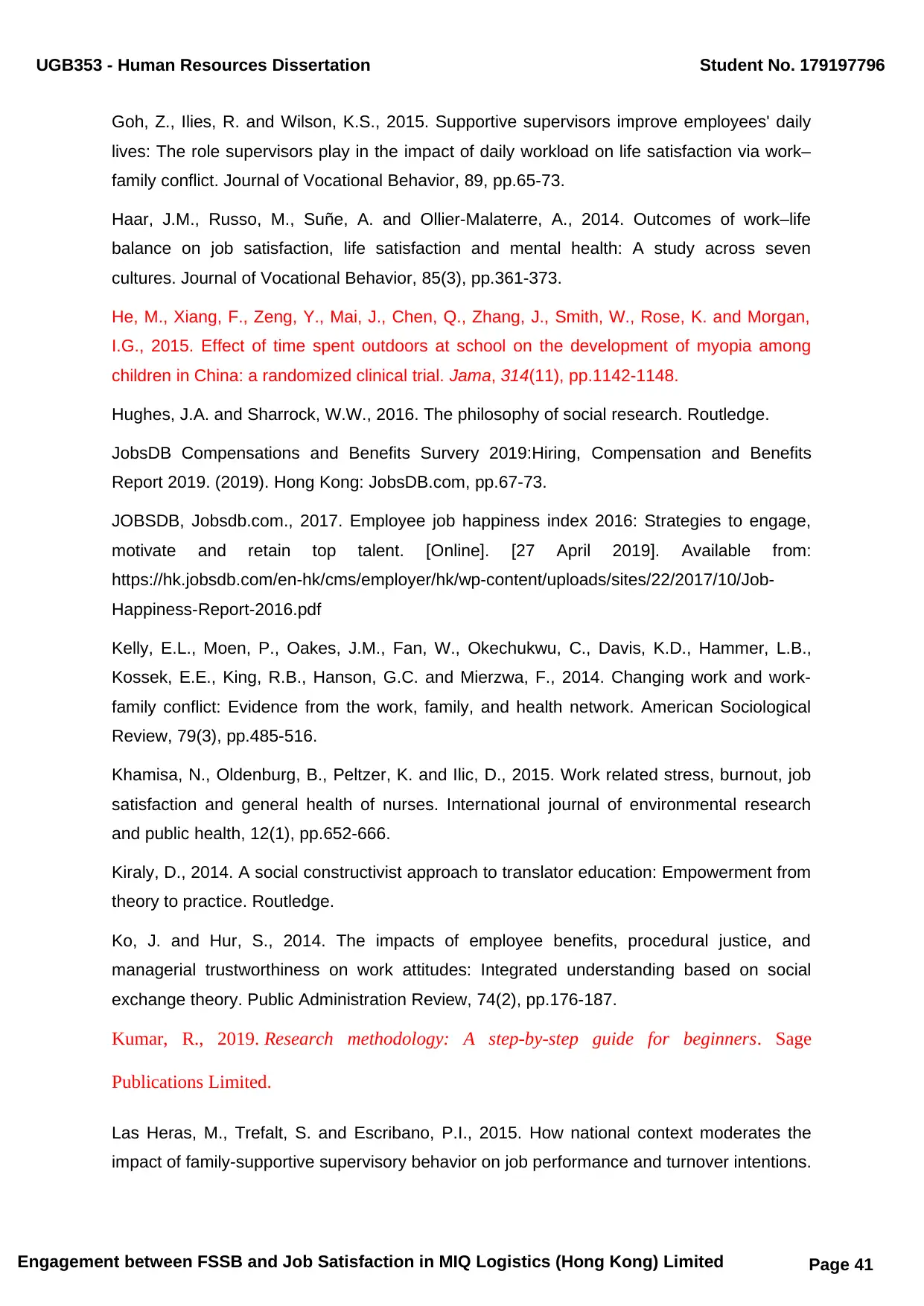
UGB353 - Human Resources Dissertation Student No. 179197796
Goh, Z., Ilies, R. and Wilson, K.S., 2015. Supportive supervisors improve employees' daily
lives: The role supervisors play in the impact of daily workload on life satisfaction via work–
family conflict. Journal of Vocational Behavior, 89, pp.65-73.
Haar, J.M., Russo, M., Suñe, A. and Ollier-Malaterre, A., 2014. Outcomes of work–life
balance on job satisfaction, life satisfaction and mental health: A study across seven
cultures. Journal of Vocational Behavior, 85(3), pp.361-373.
He, M., Xiang, F., Zeng, Y., Mai, J., Chen, Q., Zhang, J., Smith, W., Rose, K. and Morgan,
I.G., 2015. Effect of time spent outdoors at school on the development of myopia among
children in China: a randomized clinical trial. Jama, 314(11), pp.1142-1148.
Hughes, J.A. and Sharrock, W.W., 2016. The philosophy of social research. Routledge.
JobsDB Compensations and Benefits Survery 2019:Hiring, Compensation and Benefits
Report 2019. (2019). Hong Kong: JobsDB.com, pp.67-73.
JOBSDB, Jobsdb.com., 2017. Employee job happiness index 2016: Strategies to engage,
motivate and retain top talent. [Online]. [27 April 2019]. Available from:
https://hk.jobsdb.com/en-hk/cms/employer/hk/wp-content/uploads/sites/22/2017/10/Job-
Happiness-Report-2016.pdf
Kelly, E.L., Moen, P., Oakes, J.M., Fan, W., Okechukwu, C., Davis, K.D., Hammer, L.B.,
Kossek, E.E., King, R.B., Hanson, G.C. and Mierzwa, F., 2014. Changing work and work-
family conflict: Evidence from the work, family, and health network. American Sociological
Review, 79(3), pp.485-516.
Khamisa, N., Oldenburg, B., Peltzer, K. and Ilic, D., 2015. Work related stress, burnout, job
satisfaction and general health of nurses. International journal of environmental research
and public health, 12(1), pp.652-666.
Kiraly, D., 2014. A social constructivist approach to translator education: Empowerment from
theory to practice. Routledge.
Ko, J. and Hur, S., 2014. The impacts of employee benefits, procedural justice, and
managerial trustworthiness on work attitudes: Integrated understanding based on social
exchange theory. Public Administration Review, 74(2), pp.176-187.
Kumar, R., 2019. Research methodology: A step-by-step guide for beginners. Sage
Publications Limited.
Las Heras, M., Trefalt, S. and Escribano, P.I., 2015. How national context moderates the
impact of family-supportive supervisory behavior on job performance and turnover intentions.
Engagement between FSSB and Job Satisfaction in MIQ Logistics (Hong Kong) Limited Page 41
Goh, Z., Ilies, R. and Wilson, K.S., 2015. Supportive supervisors improve employees' daily
lives: The role supervisors play in the impact of daily workload on life satisfaction via work–
family conflict. Journal of Vocational Behavior, 89, pp.65-73.
Haar, J.M., Russo, M., Suñe, A. and Ollier-Malaterre, A., 2014. Outcomes of work–life
balance on job satisfaction, life satisfaction and mental health: A study across seven
cultures. Journal of Vocational Behavior, 85(3), pp.361-373.
He, M., Xiang, F., Zeng, Y., Mai, J., Chen, Q., Zhang, J., Smith, W., Rose, K. and Morgan,
I.G., 2015. Effect of time spent outdoors at school on the development of myopia among
children in China: a randomized clinical trial. Jama, 314(11), pp.1142-1148.
Hughes, J.A. and Sharrock, W.W., 2016. The philosophy of social research. Routledge.
JobsDB Compensations and Benefits Survery 2019:Hiring, Compensation and Benefits
Report 2019. (2019). Hong Kong: JobsDB.com, pp.67-73.
JOBSDB, Jobsdb.com., 2017. Employee job happiness index 2016: Strategies to engage,
motivate and retain top talent. [Online]. [27 April 2019]. Available from:
https://hk.jobsdb.com/en-hk/cms/employer/hk/wp-content/uploads/sites/22/2017/10/Job-
Happiness-Report-2016.pdf
Kelly, E.L., Moen, P., Oakes, J.M., Fan, W., Okechukwu, C., Davis, K.D., Hammer, L.B.,
Kossek, E.E., King, R.B., Hanson, G.C. and Mierzwa, F., 2014. Changing work and work-
family conflict: Evidence from the work, family, and health network. American Sociological
Review, 79(3), pp.485-516.
Khamisa, N., Oldenburg, B., Peltzer, K. and Ilic, D., 2015. Work related stress, burnout, job
satisfaction and general health of nurses. International journal of environmental research
and public health, 12(1), pp.652-666.
Kiraly, D., 2014. A social constructivist approach to translator education: Empowerment from
theory to practice. Routledge.
Ko, J. and Hur, S., 2014. The impacts of employee benefits, procedural justice, and
managerial trustworthiness on work attitudes: Integrated understanding based on social
exchange theory. Public Administration Review, 74(2), pp.176-187.
Kumar, R., 2019. Research methodology: A step-by-step guide for beginners. Sage
Publications Limited.
Las Heras, M., Trefalt, S. and Escribano, P.I., 2015. How national context moderates the
impact of family-supportive supervisory behavior on job performance and turnover intentions.
Engagement between FSSB and Job Satisfaction in MIQ Logistics (Hong Kong) Limited Page 41
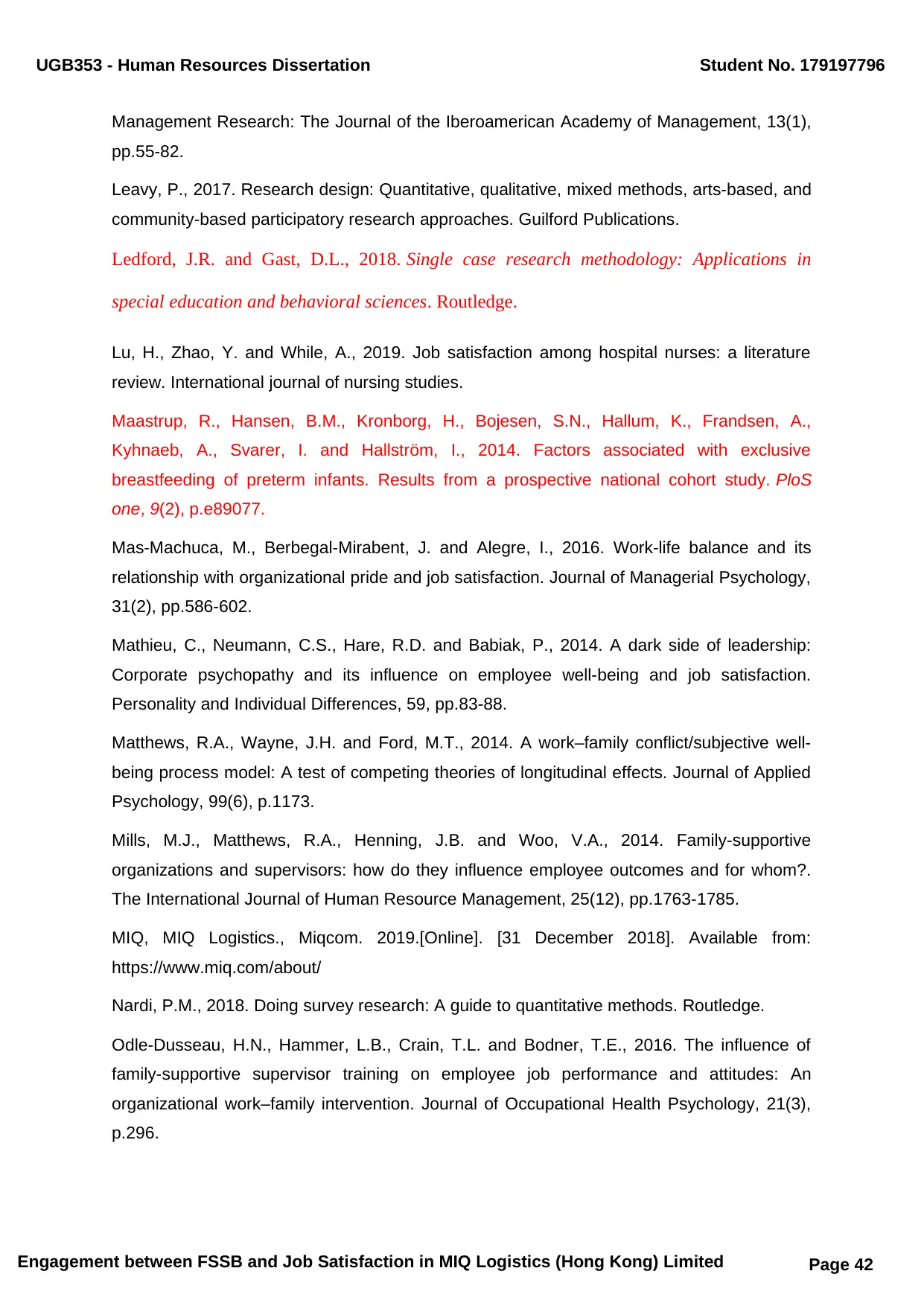
UGB353 - Human Resources Dissertation Student No. 179197796
Management Research: The Journal of the Iberoamerican Academy of Management, 13(1),
pp.55-82.
Leavy, P., 2017. Research design: Quantitative, qualitative, mixed methods, arts-based, and
community-based participatory research approaches. Guilford Publications.
Ledford, J.R. and Gast, D.L., 2018. Single case research methodology: Applications in
special education and behavioral sciences. Routledge.
Lu, H., Zhao, Y. and While, A., 2019. Job satisfaction among hospital nurses: a literature
review. International journal of nursing studies.
Maastrup, R., Hansen, B.M., Kronborg, H., Bojesen, S.N., Hallum, K., Frandsen, A.,
Kyhnaeb, A., Svarer, I. and Hallström, I., 2014. Factors associated with exclusive
breastfeeding of preterm infants. Results from a prospective national cohort study. PloS
one, 9(2), p.e89077.
Mas-Machuca, M., Berbegal-Mirabent, J. and Alegre, I., 2016. Work-life balance and its
relationship with organizational pride and job satisfaction. Journal of Managerial Psychology,
31(2), pp.586-602.
Mathieu, C., Neumann, C.S., Hare, R.D. and Babiak, P., 2014. A dark side of leadership:
Corporate psychopathy and its influence on employee well-being and job satisfaction.
Personality and Individual Differences, 59, pp.83-88.
Matthews, R.A., Wayne, J.H. and Ford, M.T., 2014. A work–family conflict/subjective well-
being process model: A test of competing theories of longitudinal effects. Journal of Applied
Psychology, 99(6), p.1173.
Mills, M.J., Matthews, R.A., Henning, J.B. and Woo, V.A., 2014. Family-supportive
organizations and supervisors: how do they influence employee outcomes and for whom?.
The International Journal of Human Resource Management, 25(12), pp.1763-1785.
MIQ, MIQ Logistics., Miqcom. 2019.[Online]. [31 December 2018]. Available from:
https://www.miq.com/about/
Nardi, P.M., 2018. Doing survey research: A guide to quantitative methods. Routledge.
Odle-Dusseau, H.N., Hammer, L.B., Crain, T.L. and Bodner, T.E., 2016. The influence of
family-supportive supervisor training on employee job performance and attitudes: An
organizational work–family intervention. Journal of Occupational Health Psychology, 21(3),
p.296.
Engagement between FSSB and Job Satisfaction in MIQ Logistics (Hong Kong) Limited Page 42
Management Research: The Journal of the Iberoamerican Academy of Management, 13(1),
pp.55-82.
Leavy, P., 2017. Research design: Quantitative, qualitative, mixed methods, arts-based, and
community-based participatory research approaches. Guilford Publications.
Ledford, J.R. and Gast, D.L., 2018. Single case research methodology: Applications in
special education and behavioral sciences. Routledge.
Lu, H., Zhao, Y. and While, A., 2019. Job satisfaction among hospital nurses: a literature
review. International journal of nursing studies.
Maastrup, R., Hansen, B.M., Kronborg, H., Bojesen, S.N., Hallum, K., Frandsen, A.,
Kyhnaeb, A., Svarer, I. and Hallström, I., 2014. Factors associated with exclusive
breastfeeding of preterm infants. Results from a prospective national cohort study. PloS
one, 9(2), p.e89077.
Mas-Machuca, M., Berbegal-Mirabent, J. and Alegre, I., 2016. Work-life balance and its
relationship with organizational pride and job satisfaction. Journal of Managerial Psychology,
31(2), pp.586-602.
Mathieu, C., Neumann, C.S., Hare, R.D. and Babiak, P., 2014. A dark side of leadership:
Corporate psychopathy and its influence on employee well-being and job satisfaction.
Personality and Individual Differences, 59, pp.83-88.
Matthews, R.A., Wayne, J.H. and Ford, M.T., 2014. A work–family conflict/subjective well-
being process model: A test of competing theories of longitudinal effects. Journal of Applied
Psychology, 99(6), p.1173.
Mills, M.J., Matthews, R.A., Henning, J.B. and Woo, V.A., 2014. Family-supportive
organizations and supervisors: how do they influence employee outcomes and for whom?.
The International Journal of Human Resource Management, 25(12), pp.1763-1785.
MIQ, MIQ Logistics., Miqcom. 2019.[Online]. [31 December 2018]. Available from:
https://www.miq.com/about/
Nardi, P.M., 2018. Doing survey research: A guide to quantitative methods. Routledge.
Odle-Dusseau, H.N., Hammer, L.B., Crain, T.L. and Bodner, T.E., 2016. The influence of
family-supportive supervisor training on employee job performance and attitudes: An
organizational work–family intervention. Journal of Occupational Health Psychology, 21(3),
p.296.
Engagement between FSSB and Job Satisfaction in MIQ Logistics (Hong Kong) Limited Page 42
Paraphrase This Document
Need a fresh take? Get an instant paraphrase of this document with our AI Paraphraser
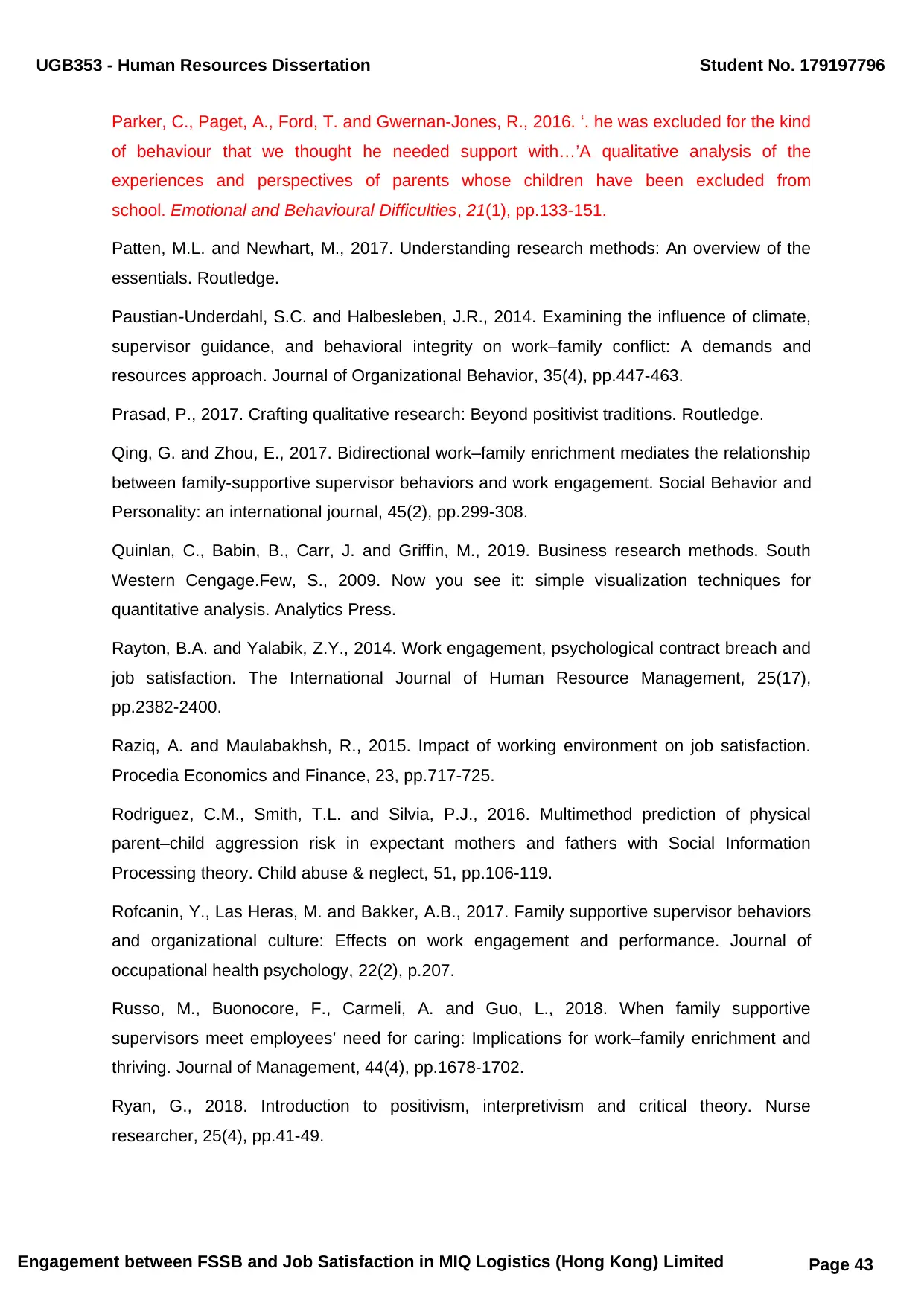
UGB353 - Human Resources Dissertation Student No. 179197796
Parker, C., Paget, A., Ford, T. and Gwernan-Jones, R., 2016. ‘. he was excluded for the kind
of behaviour that we thought he needed support with…’A qualitative analysis of the
experiences and perspectives of parents whose children have been excluded from
school. Emotional and Behavioural Difficulties, 21(1), pp.133-151.
Patten, M.L. and Newhart, M., 2017. Understanding research methods: An overview of the
essentials. Routledge.
Paustian‐Underdahl, S.C. and Halbesleben, J.R., 2014. Examining the influence of climate,
supervisor guidance, and behavioral integrity on work–family conflict: A demands and
resources approach. Journal of Organizational Behavior, 35(4), pp.447-463.
Prasad, P., 2017. Crafting qualitative research: Beyond positivist traditions. Routledge.
Qing, G. and Zhou, E., 2017. Bidirectional work–family enrichment mediates the relationship
between family-supportive supervisor behaviors and work engagement. Social Behavior and
Personality: an international journal, 45(2), pp.299-308.
Quinlan, C., Babin, B., Carr, J. and Griffin, M., 2019. Business research methods. South
Western Cengage.Few, S., 2009. Now you see it: simple visualization techniques for
quantitative analysis. Analytics Press.
Rayton, B.A. and Yalabik, Z.Y., 2014. Work engagement, psychological contract breach and
job satisfaction. The International Journal of Human Resource Management, 25(17),
pp.2382-2400.
Raziq, A. and Maulabakhsh, R., 2015. Impact of working environment on job satisfaction.
Procedia Economics and Finance, 23, pp.717-725.
Rodriguez, C.M., Smith, T.L. and Silvia, P.J., 2016. Multimethod prediction of physical
parent–child aggression risk in expectant mothers and fathers with Social Information
Processing theory. Child abuse & neglect, 51, pp.106-119.
Rofcanin, Y., Las Heras, M. and Bakker, A.B., 2017. Family supportive supervisor behaviors
and organizational culture: Effects on work engagement and performance. Journal of
occupational health psychology, 22(2), p.207.
Russo, M., Buonocore, F., Carmeli, A. and Guo, L., 2018. When family supportive
supervisors meet employees’ need for caring: Implications for work–family enrichment and
thriving. Journal of Management, 44(4), pp.1678-1702.
Ryan, G., 2018. Introduction to positivism, interpretivism and critical theory. Nurse
researcher, 25(4), pp.41-49.
Engagement between FSSB and Job Satisfaction in MIQ Logistics (Hong Kong) Limited Page 43
Parker, C., Paget, A., Ford, T. and Gwernan-Jones, R., 2016. ‘. he was excluded for the kind
of behaviour that we thought he needed support with…’A qualitative analysis of the
experiences and perspectives of parents whose children have been excluded from
school. Emotional and Behavioural Difficulties, 21(1), pp.133-151.
Patten, M.L. and Newhart, M., 2017. Understanding research methods: An overview of the
essentials. Routledge.
Paustian‐Underdahl, S.C. and Halbesleben, J.R., 2014. Examining the influence of climate,
supervisor guidance, and behavioral integrity on work–family conflict: A demands and
resources approach. Journal of Organizational Behavior, 35(4), pp.447-463.
Prasad, P., 2017. Crafting qualitative research: Beyond positivist traditions. Routledge.
Qing, G. and Zhou, E., 2017. Bidirectional work–family enrichment mediates the relationship
between family-supportive supervisor behaviors and work engagement. Social Behavior and
Personality: an international journal, 45(2), pp.299-308.
Quinlan, C., Babin, B., Carr, J. and Griffin, M., 2019. Business research methods. South
Western Cengage.Few, S., 2009. Now you see it: simple visualization techniques for
quantitative analysis. Analytics Press.
Rayton, B.A. and Yalabik, Z.Y., 2014. Work engagement, psychological contract breach and
job satisfaction. The International Journal of Human Resource Management, 25(17),
pp.2382-2400.
Raziq, A. and Maulabakhsh, R., 2015. Impact of working environment on job satisfaction.
Procedia Economics and Finance, 23, pp.717-725.
Rodriguez, C.M., Smith, T.L. and Silvia, P.J., 2016. Multimethod prediction of physical
parent–child aggression risk in expectant mothers and fathers with Social Information
Processing theory. Child abuse & neglect, 51, pp.106-119.
Rofcanin, Y., Las Heras, M. and Bakker, A.B., 2017. Family supportive supervisor behaviors
and organizational culture: Effects on work engagement and performance. Journal of
occupational health psychology, 22(2), p.207.
Russo, M., Buonocore, F., Carmeli, A. and Guo, L., 2018. When family supportive
supervisors meet employees’ need for caring: Implications for work–family enrichment and
thriving. Journal of Management, 44(4), pp.1678-1702.
Ryan, G., 2018. Introduction to positivism, interpretivism and critical theory. Nurse
researcher, 25(4), pp.41-49.
Engagement between FSSB and Job Satisfaction in MIQ Logistics (Hong Kong) Limited Page 43
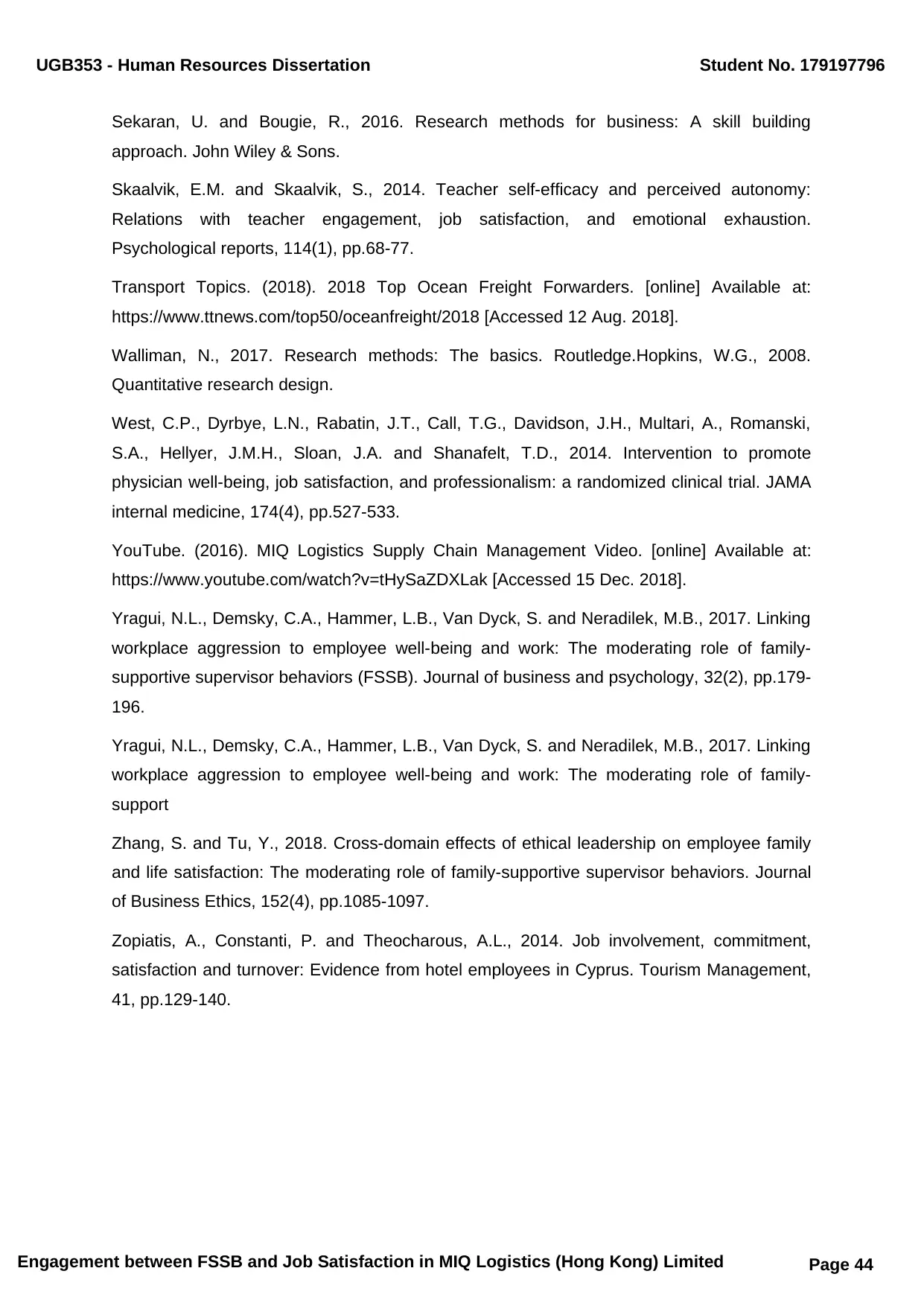
UGB353 - Human Resources Dissertation Student No. 179197796
Sekaran, U. and Bougie, R., 2016. Research methods for business: A skill building
approach. John Wiley & Sons.
Skaalvik, E.M. and Skaalvik, S., 2014. Teacher self-efficacy and perceived autonomy:
Relations with teacher engagement, job satisfaction, and emotional exhaustion.
Psychological reports, 114(1), pp.68-77.
Transport Topics. (2018). 2018 Top Ocean Freight Forwarders. [online] Available at:
https://www.ttnews.com/top50/oceanfreight/2018 [Accessed 12 Aug. 2018].
Walliman, N., 2017. Research methods: The basics. Routledge.Hopkins, W.G., 2008.
Quantitative research design.
West, C.P., Dyrbye, L.N., Rabatin, J.T., Call, T.G., Davidson, J.H., Multari, A., Romanski,
S.A., Hellyer, J.M.H., Sloan, J.A. and Shanafelt, T.D., 2014. Intervention to promote
physician well-being, job satisfaction, and professionalism: a randomized clinical trial. JAMA
internal medicine, 174(4), pp.527-533.
YouTube. (2016). MIQ Logistics Supply Chain Management Video. [online] Available at:
https://www.youtube.com/watch?v=tHySaZDXLak [Accessed 15 Dec. 2018].
Yragui, N.L., Demsky, C.A., Hammer, L.B., Van Dyck, S. and Neradilek, M.B., 2017. Linking
workplace aggression to employee well-being and work: The moderating role of family-
supportive supervisor behaviors (FSSB). Journal of business and psychology, 32(2), pp.179-
196.
Yragui, N.L., Demsky, C.A., Hammer, L.B., Van Dyck, S. and Neradilek, M.B., 2017. Linking
workplace aggression to employee well-being and work: The moderating role of family-
support
Zhang, S. and Tu, Y., 2018. Cross-domain effects of ethical leadership on employee family
and life satisfaction: The moderating role of family-supportive supervisor behaviors. Journal
of Business Ethics, 152(4), pp.1085-1097.
Zopiatis, A., Constanti, P. and Theocharous, A.L., 2014. Job involvement, commitment,
satisfaction and turnover: Evidence from hotel employees in Cyprus. Tourism Management,
41, pp.129-140.
Engagement between FSSB and Job Satisfaction in MIQ Logistics (Hong Kong) Limited Page 44
Sekaran, U. and Bougie, R., 2016. Research methods for business: A skill building
approach. John Wiley & Sons.
Skaalvik, E.M. and Skaalvik, S., 2014. Teacher self-efficacy and perceived autonomy:
Relations with teacher engagement, job satisfaction, and emotional exhaustion.
Psychological reports, 114(1), pp.68-77.
Transport Topics. (2018). 2018 Top Ocean Freight Forwarders. [online] Available at:
https://www.ttnews.com/top50/oceanfreight/2018 [Accessed 12 Aug. 2018].
Walliman, N., 2017. Research methods: The basics. Routledge.Hopkins, W.G., 2008.
Quantitative research design.
West, C.P., Dyrbye, L.N., Rabatin, J.T., Call, T.G., Davidson, J.H., Multari, A., Romanski,
S.A., Hellyer, J.M.H., Sloan, J.A. and Shanafelt, T.D., 2014. Intervention to promote
physician well-being, job satisfaction, and professionalism: a randomized clinical trial. JAMA
internal medicine, 174(4), pp.527-533.
YouTube. (2016). MIQ Logistics Supply Chain Management Video. [online] Available at:
https://www.youtube.com/watch?v=tHySaZDXLak [Accessed 15 Dec. 2018].
Yragui, N.L., Demsky, C.A., Hammer, L.B., Van Dyck, S. and Neradilek, M.B., 2017. Linking
workplace aggression to employee well-being and work: The moderating role of family-
supportive supervisor behaviors (FSSB). Journal of business and psychology, 32(2), pp.179-
196.
Yragui, N.L., Demsky, C.A., Hammer, L.B., Van Dyck, S. and Neradilek, M.B., 2017. Linking
workplace aggression to employee well-being and work: The moderating role of family-
support
Zhang, S. and Tu, Y., 2018. Cross-domain effects of ethical leadership on employee family
and life satisfaction: The moderating role of family-supportive supervisor behaviors. Journal
of Business Ethics, 152(4), pp.1085-1097.
Zopiatis, A., Constanti, P. and Theocharous, A.L., 2014. Job involvement, commitment,
satisfaction and turnover: Evidence from hotel employees in Cyprus. Tourism Management,
41, pp.129-140.
Engagement between FSSB and Job Satisfaction in MIQ Logistics (Hong Kong) Limited Page 44
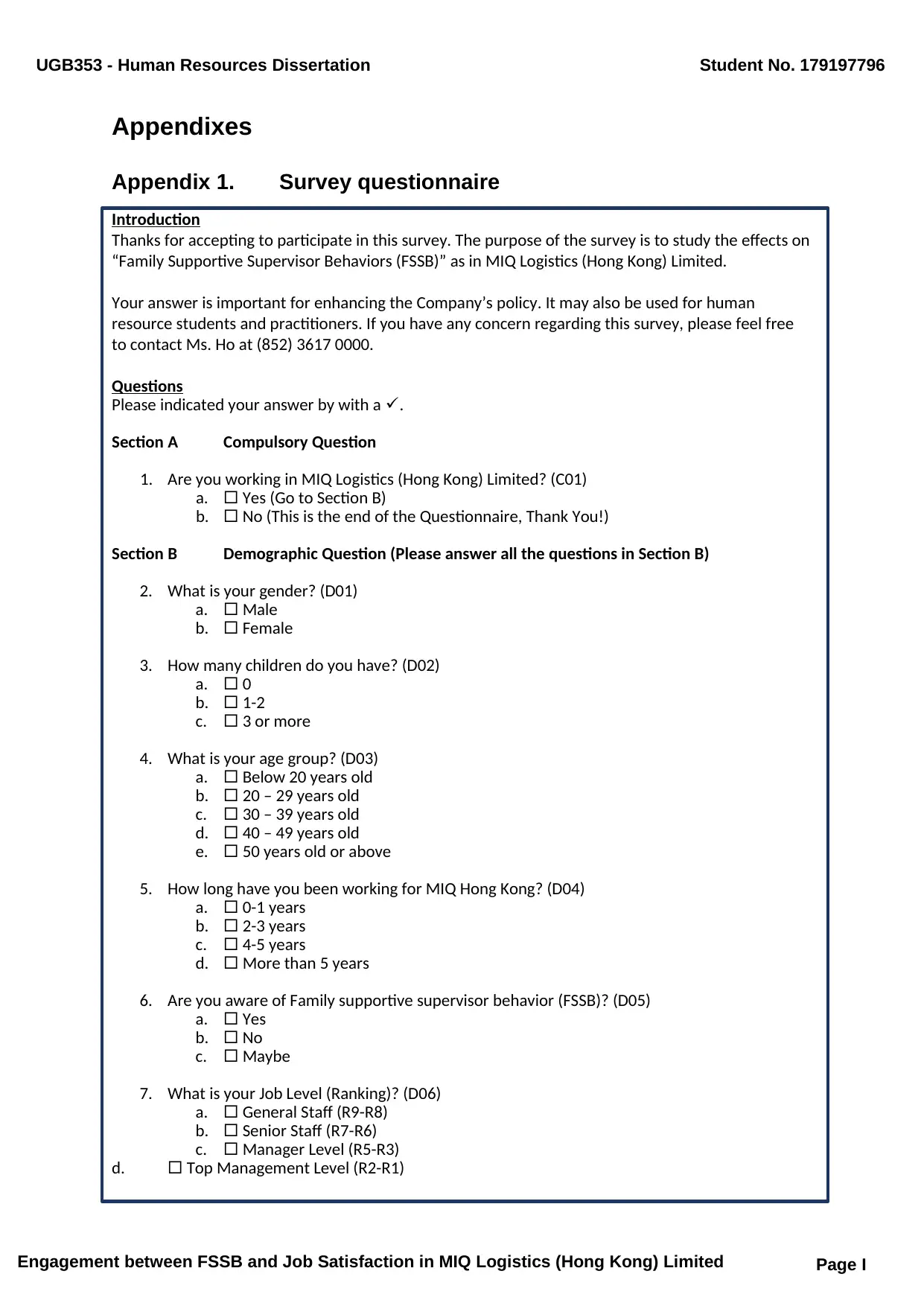
UGB353 - Human Resources Dissertation Student No. 179197796
Appendixes
Appendix 1. Survey questionnaire
Introduction
Thanks for accepting to participate in this survey. The purpose of the survey is to study the effects on
“Family Supportive Supervisor Behaviors (FSSB)” as in MIQ Logistics (Hong Kong) Limited.
Your answer is important for enhancing the Company’s policy. It may also be used for human
resource students and practitioners. If you have any concern regarding this survey, please feel free
to contact Ms. Ho at (852) 3617 0000.
Questions
Please indicated your answer by with a .
Section A Compulsory Question
1. Are you working in MIQ Logistics (Hong Kong) Limited? (C01)
a. Yes (Go to Section B)
b. No (This is the end of the Questionnaire, Thank You!)
Section B Demographic Question (Please answer all the questions in Section B)
2. What is your gender? (D01)
a. Male
b. Female
3. How many children do you have? (D02)
a. 0
b. 1-2
c. 3 or more
4. What is your age group? (D03)
a. Below 20 years old
b. 20 – 29 years old
c. 30 – 39 years old
d. 40 – 49 years old
e. 50 years old or above
5. How long have you been working for MIQ Hong Kong? (D04)
a. 0-1 years
b. 2-3 years
c. 4-5 years
d. More than 5 years
6. Are you aware of Family supportive supervisor behavior (FSSB)? (D05)
a. Yes
b. No
c. Maybe
7. What is your Job Level (Ranking)? (D06)
a. General Staff (R9-R8)
b. Senior Staff (R7-R6)
c. Manager Level (R5-R3)
d. Top Management Level (R2-R1)
Engagement between FSSB and Job Satisfaction in MIQ Logistics (Hong Kong) Limited Page I
Appendixes
Appendix 1. Survey questionnaire
Introduction
Thanks for accepting to participate in this survey. The purpose of the survey is to study the effects on
“Family Supportive Supervisor Behaviors (FSSB)” as in MIQ Logistics (Hong Kong) Limited.
Your answer is important for enhancing the Company’s policy. It may also be used for human
resource students and practitioners. If you have any concern regarding this survey, please feel free
to contact Ms. Ho at (852) 3617 0000.
Questions
Please indicated your answer by with a .
Section A Compulsory Question
1. Are you working in MIQ Logistics (Hong Kong) Limited? (C01)
a. Yes (Go to Section B)
b. No (This is the end of the Questionnaire, Thank You!)
Section B Demographic Question (Please answer all the questions in Section B)
2. What is your gender? (D01)
a. Male
b. Female
3. How many children do you have? (D02)
a. 0
b. 1-2
c. 3 or more
4. What is your age group? (D03)
a. Below 20 years old
b. 20 – 29 years old
c. 30 – 39 years old
d. 40 – 49 years old
e. 50 years old or above
5. How long have you been working for MIQ Hong Kong? (D04)
a. 0-1 years
b. 2-3 years
c. 4-5 years
d. More than 5 years
6. Are you aware of Family supportive supervisor behavior (FSSB)? (D05)
a. Yes
b. No
c. Maybe
7. What is your Job Level (Ranking)? (D06)
a. General Staff (R9-R8)
b. Senior Staff (R7-R6)
c. Manager Level (R5-R3)
d. Top Management Level (R2-R1)
Engagement between FSSB and Job Satisfaction in MIQ Logistics (Hong Kong) Limited Page I
Secure Best Marks with AI Grader
Need help grading? Try our AI Grader for instant feedback on your assignments.
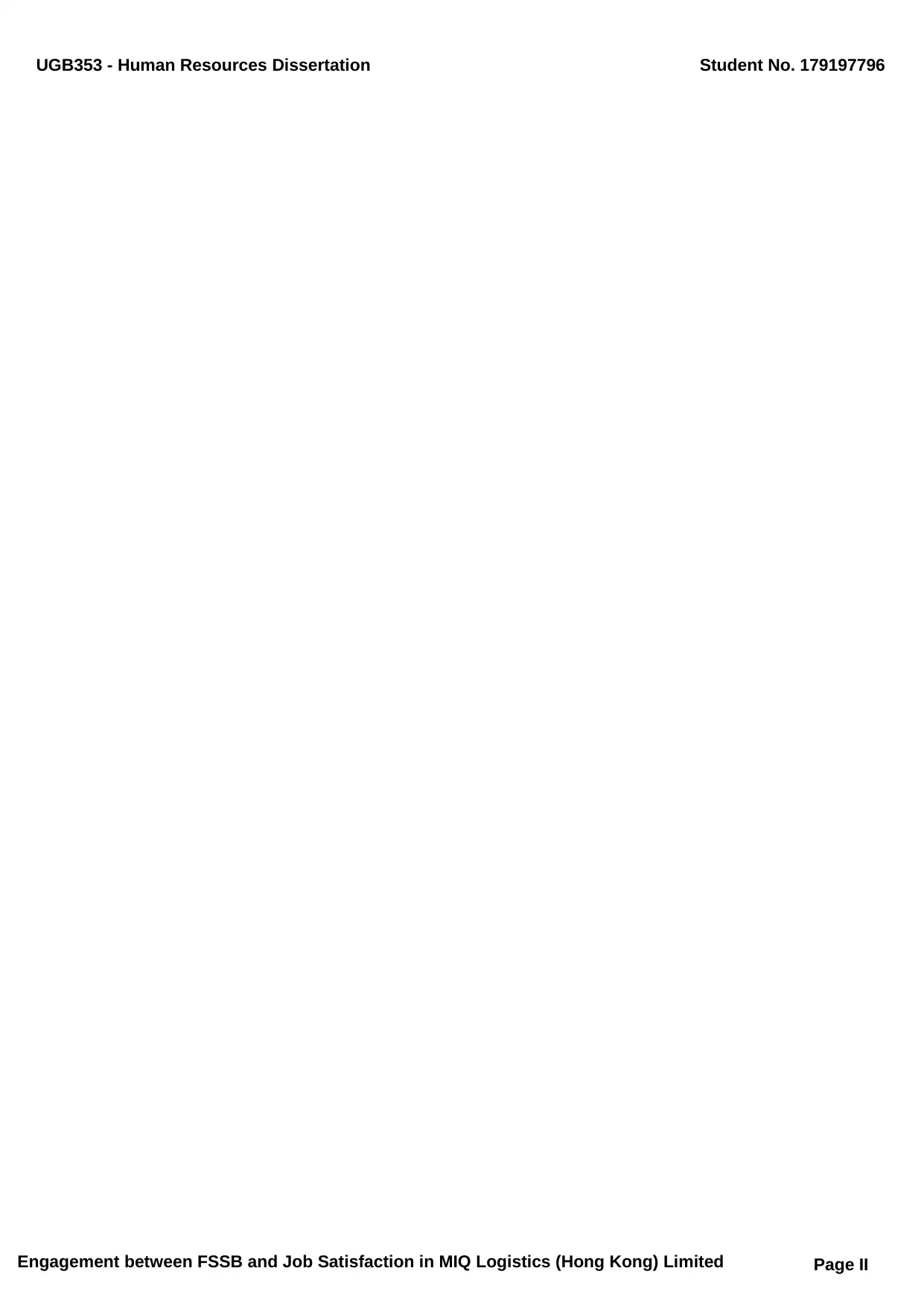
UGB353 - Human Resources Dissertation Student No. 179197796
Engagement between FSSB and Job Satisfaction in MIQ Logistics (Hong Kong) Limited Page II
Engagement between FSSB and Job Satisfaction in MIQ Logistics (Hong Kong) Limited Page II
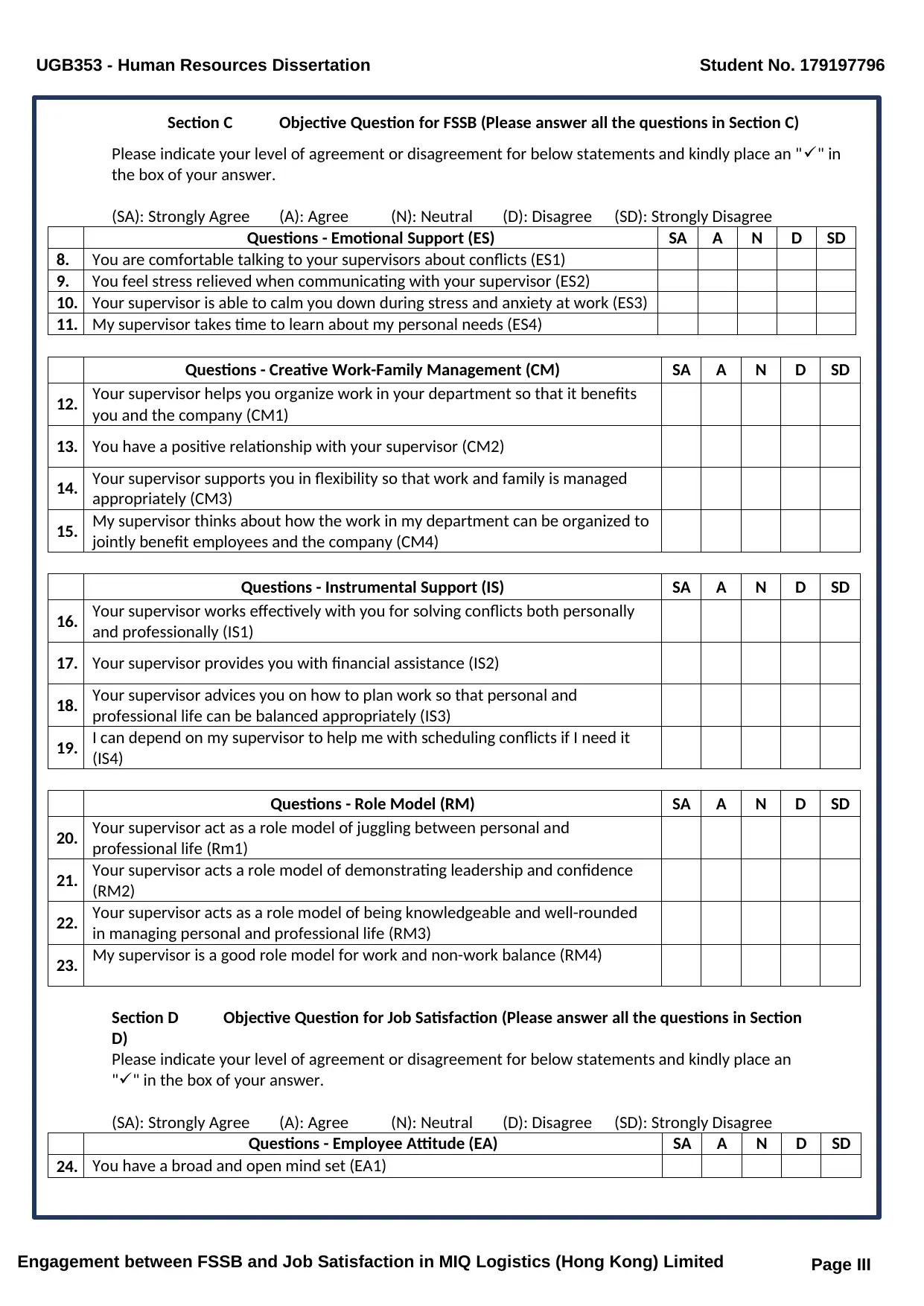
UGB353 - Human Resources Dissertation Student No. 179197796
Section C Objective Question for FSSB (Please answer all the questions in Section C)
Please indicate your level of agreement or disagreement for below statements and kindly place an "" in
the box of your answer.
(SA): Strongly Agree (A): Agree (N): Neutral (D): Disagree (SD): Strongly Disagree
Questions - Emotional Support (ES) SA A N D SD
8. You are comfortable talking to your supervisors about conflicts (ES1)
9. You feel stress relieved when communicating with your supervisor (ES2)
10. Your supervisor is able to calm you down during stress and anxiety at work (ES3)
11. My supervisor takes time to learn about my personal needs (ES4)
Questions - Creative Work-Family Management (CM) SA A N D SD
12. Your supervisor helps you organize work in your department so that it benefits
you and the company (CM1)
13. You have a positive relationship with your supervisor (CM2)
14. Your supervisor supports you in flexibility so that work and family is managed
appropriately (CM3)
15. My supervisor thinks about how the work in my department can be organized to
jointly benefit employees and the company (CM4)
Questions - Instrumental Support (IS) SA A N D SD
16. Your supervisor works effectively with you for solving conflicts both personally
and professionally (IS1)
17. Your supervisor provides you with financial assistance (IS2)
18. Your supervisor advices you on how to plan work so that personal and
professional life can be balanced appropriately (IS3)
19. I can depend on my supervisor to help me with scheduling conflicts if I need it
(IS4)
Questions - Role Model (RM) SA A N D SD
20. Your supervisor act as a role model of juggling between personal and
professional life (Rm1)
21. Your supervisor acts a role model of demonstrating leadership and confidence
(RM2)
22. Your supervisor acts as a role model of being knowledgeable and well-rounded
in managing personal and professional life (RM3)
23. My supervisor is a good role model for work and non-work balance (RM4)
Section D Objective Question for Job Satisfaction (Please answer all the questions in Section
D)
Please indicate your level of agreement or disagreement for below statements and kindly place an
"" in the box of your answer.
(SA): Strongly Agree (A): Agree (N): Neutral (D): Disagree (SD): Strongly Disagree
Questions - Employee Attitude (EA) SA A N D SD
24. You have a broad and open mind set (EA1)
Engagement between FSSB and Job Satisfaction in MIQ Logistics (Hong Kong) Limited Page III
Section C Objective Question for FSSB (Please answer all the questions in Section C)
Please indicate your level of agreement or disagreement for below statements and kindly place an "" in
the box of your answer.
(SA): Strongly Agree (A): Agree (N): Neutral (D): Disagree (SD): Strongly Disagree
Questions - Emotional Support (ES) SA A N D SD
8. You are comfortable talking to your supervisors about conflicts (ES1)
9. You feel stress relieved when communicating with your supervisor (ES2)
10. Your supervisor is able to calm you down during stress and anxiety at work (ES3)
11. My supervisor takes time to learn about my personal needs (ES4)
Questions - Creative Work-Family Management (CM) SA A N D SD
12. Your supervisor helps you organize work in your department so that it benefits
you and the company (CM1)
13. You have a positive relationship with your supervisor (CM2)
14. Your supervisor supports you in flexibility so that work and family is managed
appropriately (CM3)
15. My supervisor thinks about how the work in my department can be organized to
jointly benefit employees and the company (CM4)
Questions - Instrumental Support (IS) SA A N D SD
16. Your supervisor works effectively with you for solving conflicts both personally
and professionally (IS1)
17. Your supervisor provides you with financial assistance (IS2)
18. Your supervisor advices you on how to plan work so that personal and
professional life can be balanced appropriately (IS3)
19. I can depend on my supervisor to help me with scheduling conflicts if I need it
(IS4)
Questions - Role Model (RM) SA A N D SD
20. Your supervisor act as a role model of juggling between personal and
professional life (Rm1)
21. Your supervisor acts a role model of demonstrating leadership and confidence
(RM2)
22. Your supervisor acts as a role model of being knowledgeable and well-rounded
in managing personal and professional life (RM3)
23. My supervisor is a good role model for work and non-work balance (RM4)
Section D Objective Question for Job Satisfaction (Please answer all the questions in Section
D)
Please indicate your level of agreement or disagreement for below statements and kindly place an
"" in the box of your answer.
(SA): Strongly Agree (A): Agree (N): Neutral (D): Disagree (SD): Strongly Disagree
Questions - Employee Attitude (EA) SA A N D SD
24. You have a broad and open mind set (EA1)
Engagement between FSSB and Job Satisfaction in MIQ Logistics (Hong Kong) Limited Page III
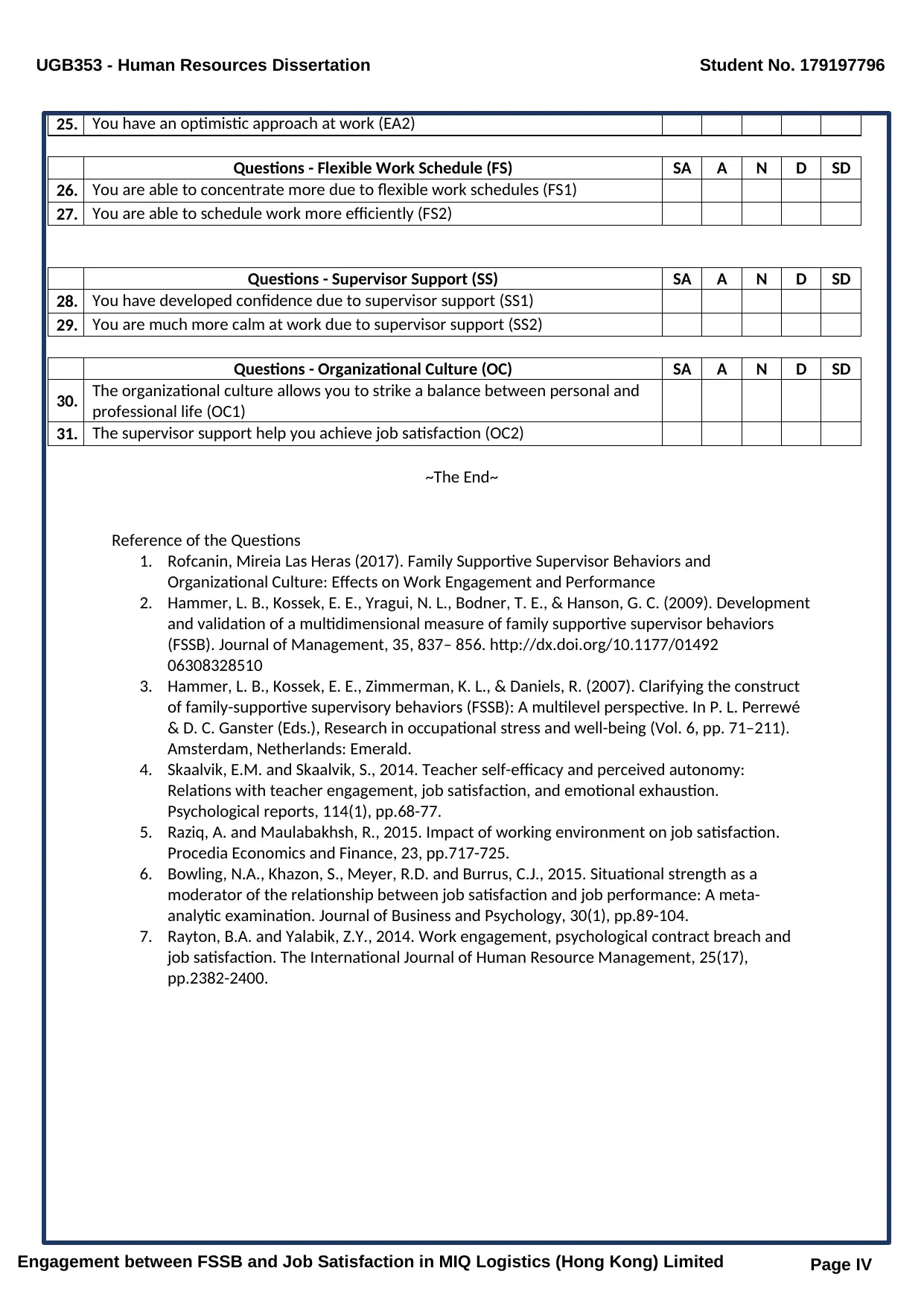
UGB353 - Human Resources Dissertation Student No. 179197796
25. You have an optimistic approach at work (EA2)
Questions - Flexible Work Schedule (FS) SA A N D SD
26. You are able to concentrate more due to flexible work schedules (FS1)
27. You are able to schedule work more efficiently (FS2)
Questions - Supervisor Support (SS) SA A N D SD
28. You have developed confidence due to supervisor support (SS1)
29. You are much more calm at work due to supervisor support (SS2)
Questions - Organizational Culture (OC) SA A N D SD
30. The organizational culture allows you to strike a balance between personal and
professional life (OC1)
31. The supervisor support help you achieve job satisfaction (OC2)
~The End~
Reference of the Questions
1. Rofcanin, Mireia Las Heras (2017). Family Supportive Supervisor Behaviors and
Organizational Culture: Effects on Work Engagement and Performance
2. Hammer, L. B., Kossek, E. E., Yragui, N. L., Bodner, T. E., & Hanson, G. C. (2009). Development
and validation of a multidimensional measure of family supportive supervisor behaviors
(FSSB). Journal of Management, 35, 837– 856. http://dx.doi.org/10.1177/01492
06308328510
3. Hammer, L. B., Kossek, E. E., Zimmerman, K. L., & Daniels, R. (2007). Clarifying the construct
of family-supportive supervisory behaviors (FSSB): A multilevel perspective. In P. L. Perrewé
& D. C. Ganster (Eds.), Research in occupational stress and well-being (Vol. 6, pp. 71–211).
Amsterdam, Netherlands: Emerald.
4. Skaalvik, E.M. and Skaalvik, S., 2014. Teacher self-efficacy and perceived autonomy:
Relations with teacher engagement, job satisfaction, and emotional exhaustion.
Psychological reports, 114(1), pp.68-77.
5. Raziq, A. and Maulabakhsh, R., 2015. Impact of working environment on job satisfaction.
Procedia Economics and Finance, 23, pp.717-725.
6. Bowling, N.A., Khazon, S., Meyer, R.D. and Burrus, C.J., 2015. Situational strength as a
moderator of the relationship between job satisfaction and job performance: A meta-
analytic examination. Journal of Business and Psychology, 30(1), pp.89-104.
7. Rayton, B.A. and Yalabik, Z.Y., 2014. Work engagement, psychological contract breach and
job satisfaction. The International Journal of Human Resource Management, 25(17),
pp.2382-2400.
Engagement between FSSB and Job Satisfaction in MIQ Logistics (Hong Kong) Limited Page IV
25. You have an optimistic approach at work (EA2)
Questions - Flexible Work Schedule (FS) SA A N D SD
26. You are able to concentrate more due to flexible work schedules (FS1)
27. You are able to schedule work more efficiently (FS2)
Questions - Supervisor Support (SS) SA A N D SD
28. You have developed confidence due to supervisor support (SS1)
29. You are much more calm at work due to supervisor support (SS2)
Questions - Organizational Culture (OC) SA A N D SD
30. The organizational culture allows you to strike a balance between personal and
professional life (OC1)
31. The supervisor support help you achieve job satisfaction (OC2)
~The End~
Reference of the Questions
1. Rofcanin, Mireia Las Heras (2017). Family Supportive Supervisor Behaviors and
Organizational Culture: Effects on Work Engagement and Performance
2. Hammer, L. B., Kossek, E. E., Yragui, N. L., Bodner, T. E., & Hanson, G. C. (2009). Development
and validation of a multidimensional measure of family supportive supervisor behaviors
(FSSB). Journal of Management, 35, 837– 856. http://dx.doi.org/10.1177/01492
06308328510
3. Hammer, L. B., Kossek, E. E., Zimmerman, K. L., & Daniels, R. (2007). Clarifying the construct
of family-supportive supervisory behaviors (FSSB): A multilevel perspective. In P. L. Perrewé
& D. C. Ganster (Eds.), Research in occupational stress and well-being (Vol. 6, pp. 71–211).
Amsterdam, Netherlands: Emerald.
4. Skaalvik, E.M. and Skaalvik, S., 2014. Teacher self-efficacy and perceived autonomy:
Relations with teacher engagement, job satisfaction, and emotional exhaustion.
Psychological reports, 114(1), pp.68-77.
5. Raziq, A. and Maulabakhsh, R., 2015. Impact of working environment on job satisfaction.
Procedia Economics and Finance, 23, pp.717-725.
6. Bowling, N.A., Khazon, S., Meyer, R.D. and Burrus, C.J., 2015. Situational strength as a
moderator of the relationship between job satisfaction and job performance: A meta-
analytic examination. Journal of Business and Psychology, 30(1), pp.89-104.
7. Rayton, B.A. and Yalabik, Z.Y., 2014. Work engagement, psychological contract breach and
job satisfaction. The International Journal of Human Resource Management, 25(17),
pp.2382-2400.
Engagement between FSSB and Job Satisfaction in MIQ Logistics (Hong Kong) Limited Page IV
Paraphrase This Document
Need a fresh take? Get an instant paraphrase of this document with our AI Paraphraser
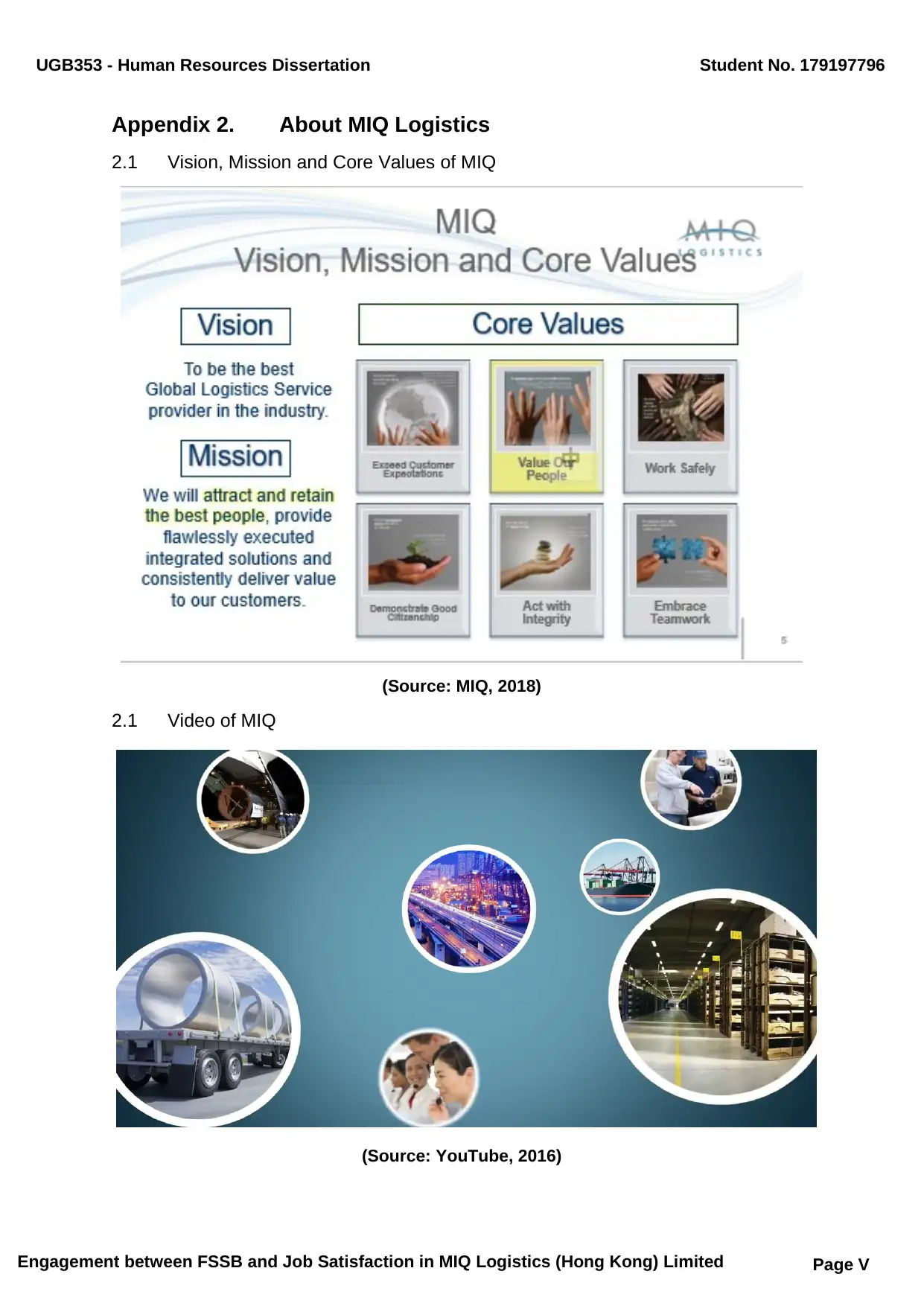
UGB353 - Human Resources Dissertation Student No. 179197796
Appendix 2. About MIQ Logistics
2.1 Vision, Mission and Core Values of MIQ
(Source: MIQ, 2018)
2.1 Video of MIQ
(Source: YouTube, 2016)
Engagement between FSSB and Job Satisfaction in MIQ Logistics (Hong Kong) Limited Page V
Appendix 2. About MIQ Logistics
2.1 Vision, Mission and Core Values of MIQ
(Source: MIQ, 2018)
2.1 Video of MIQ
(Source: YouTube, 2016)
Engagement between FSSB and Job Satisfaction in MIQ Logistics (Hong Kong) Limited Page V
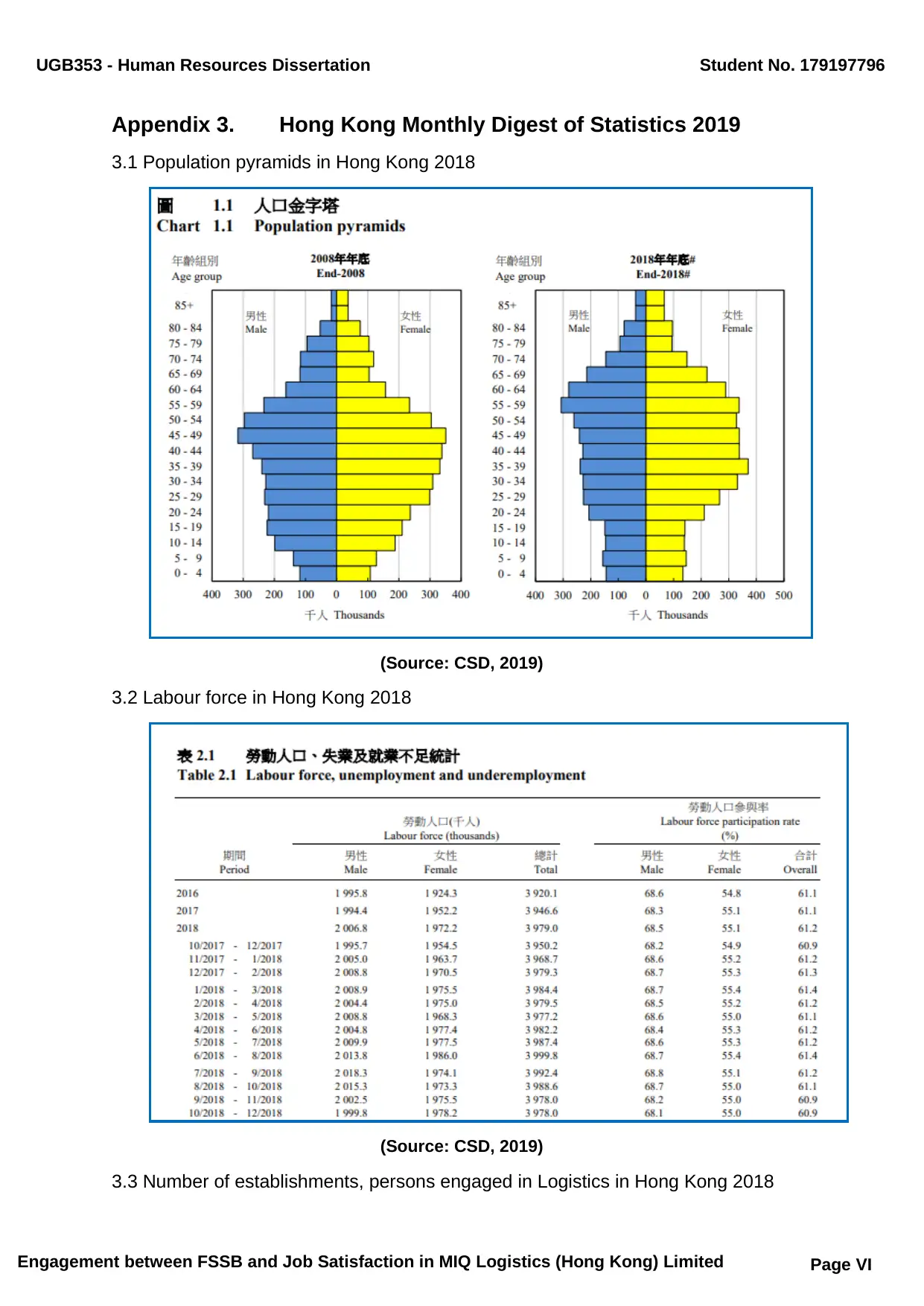
UGB353 - Human Resources Dissertation Student No. 179197796
Appendix 3. Hong Kong Monthly Digest of Statistics 2019
3.1 Population pyramids in Hong Kong 2018
(Source: CSD, 2019)
3.2 Labour force in Hong Kong 2018
(Source: CSD, 2019)
3.3 Number of establishments, persons engaged in Logistics in Hong Kong 2018
Engagement between FSSB and Job Satisfaction in MIQ Logistics (Hong Kong) Limited Page VI
Appendix 3. Hong Kong Monthly Digest of Statistics 2019
3.1 Population pyramids in Hong Kong 2018
(Source: CSD, 2019)
3.2 Labour force in Hong Kong 2018
(Source: CSD, 2019)
3.3 Number of establishments, persons engaged in Logistics in Hong Kong 2018
Engagement between FSSB and Job Satisfaction in MIQ Logistics (Hong Kong) Limited Page VI
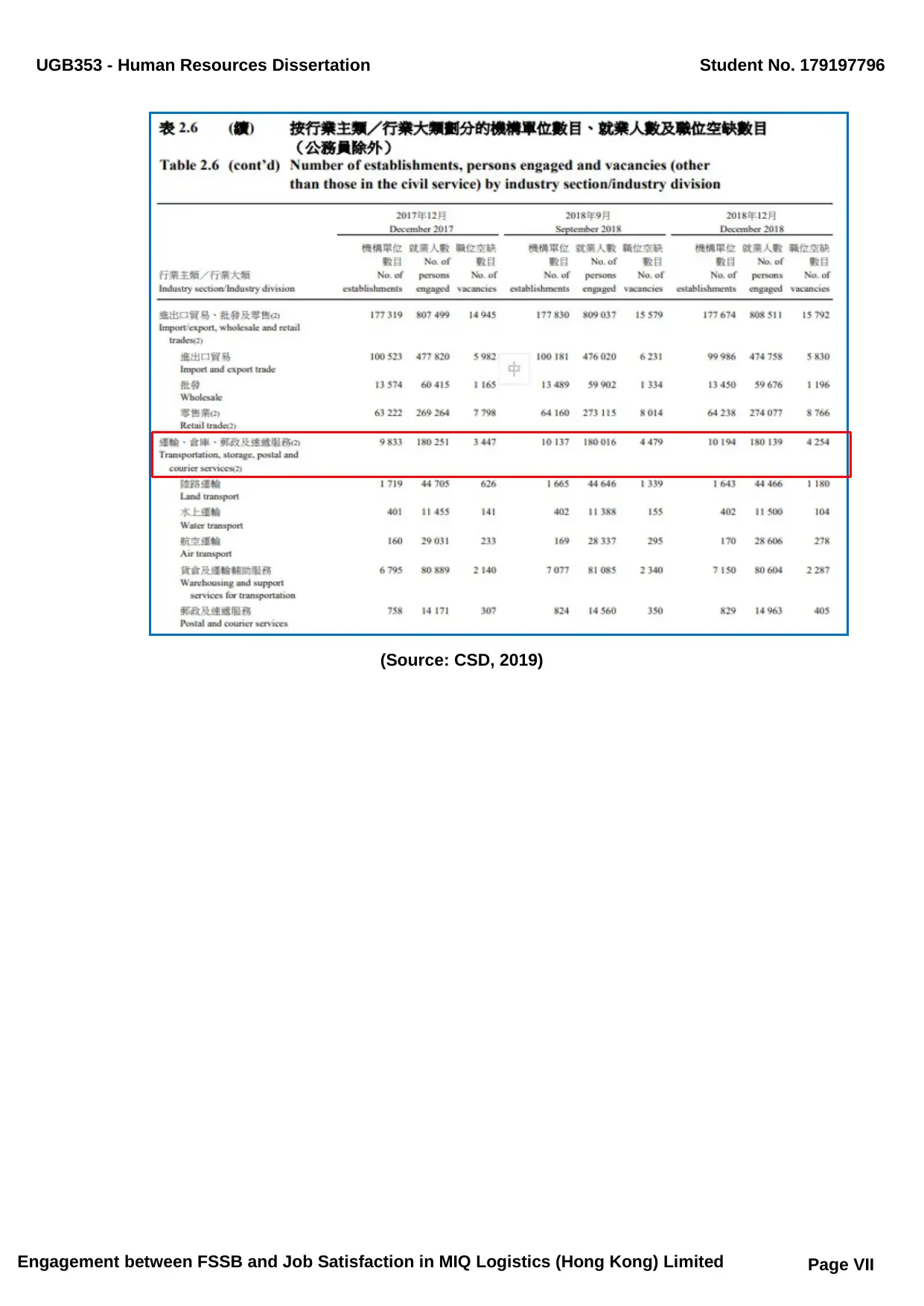
UGB353 - Human Resources Dissertation Student No. 179197796
(Source: CSD, 2019)
Engagement between FSSB and Job Satisfaction in MIQ Logistics (Hong Kong) Limited Page VII
(Source: CSD, 2019)
Engagement between FSSB and Job Satisfaction in MIQ Logistics (Hong Kong) Limited Page VII
Secure Best Marks with AI Grader
Need help grading? Try our AI Grader for instant feedback on your assignments.
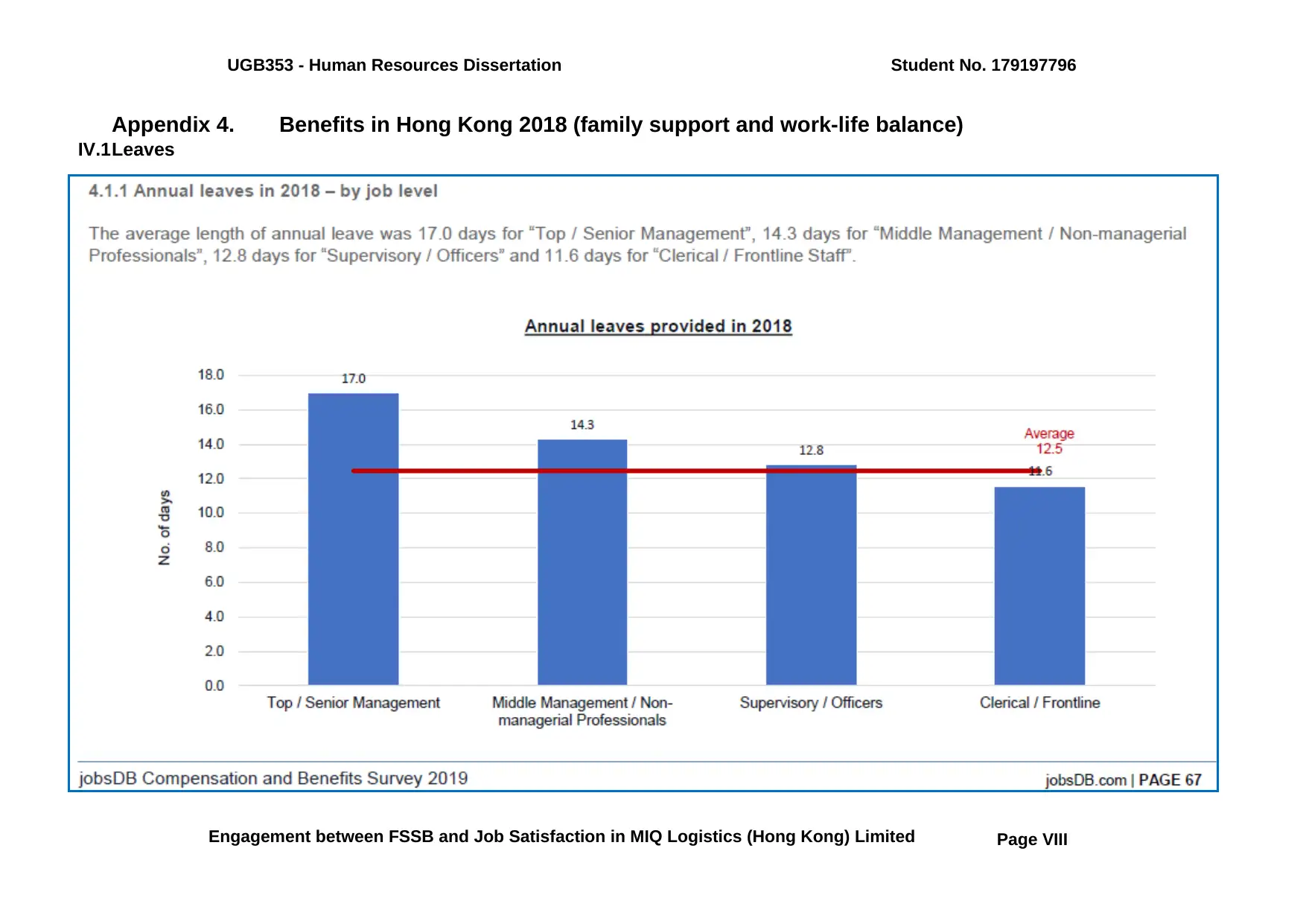
UGB353 - Human Resources Dissertation Student No. 179197796
Appendix 4. Benefits in Hong Kong 2018 (family support and work-life balance)
IV.1Leaves
Engagement between FSSB and Job Satisfaction in MIQ Logistics (Hong Kong) Limited Page VIII
Appendix 4. Benefits in Hong Kong 2018 (family support and work-life balance)
IV.1Leaves
Engagement between FSSB and Job Satisfaction in MIQ Logistics (Hong Kong) Limited Page VIII
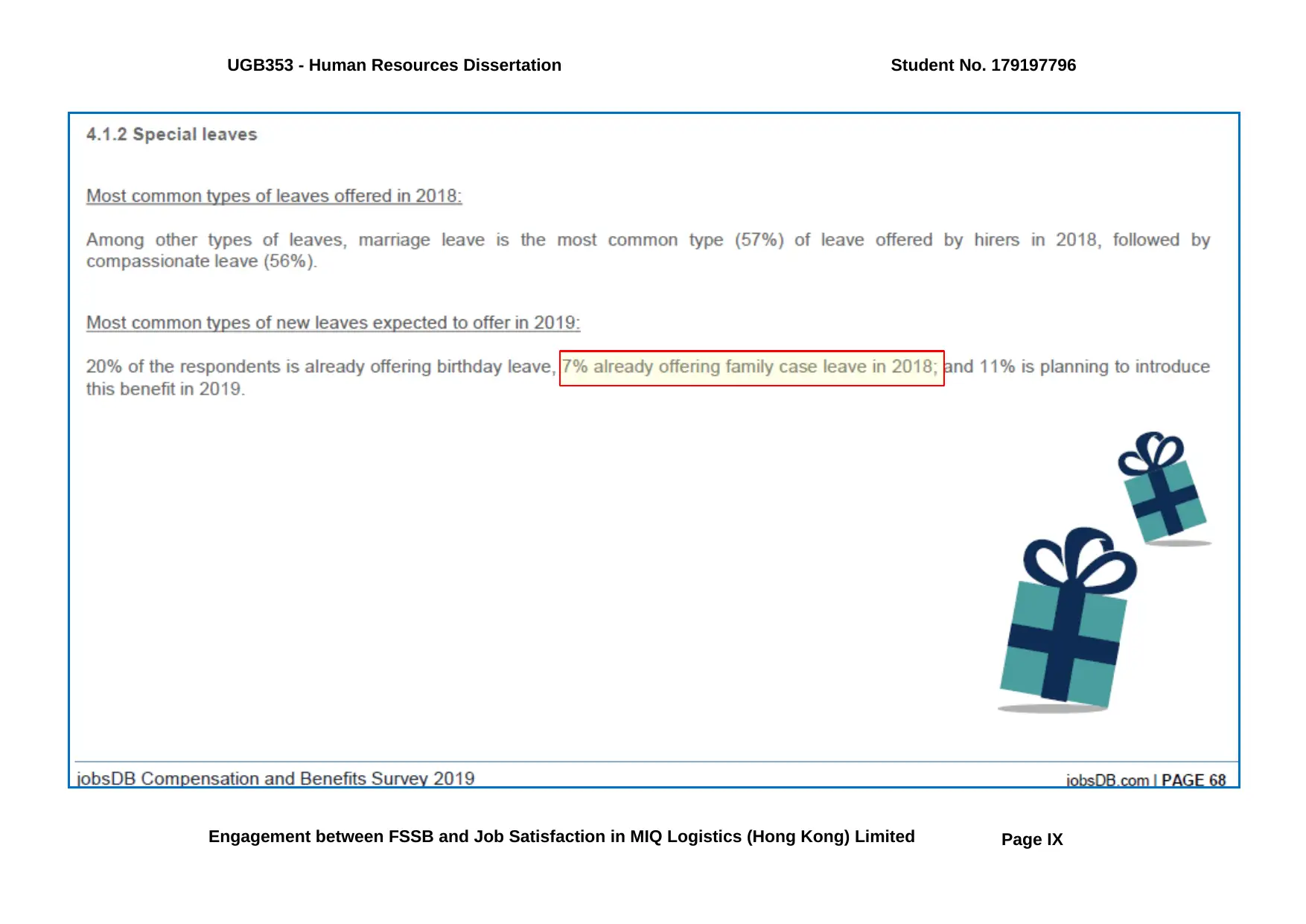
UGB353 - Human Resources Dissertation Student No. 179197796
Engagement between FSSB and Job Satisfaction in MIQ Logistics (Hong Kong) Limited Page IX
Engagement between FSSB and Job Satisfaction in MIQ Logistics (Hong Kong) Limited Page IX
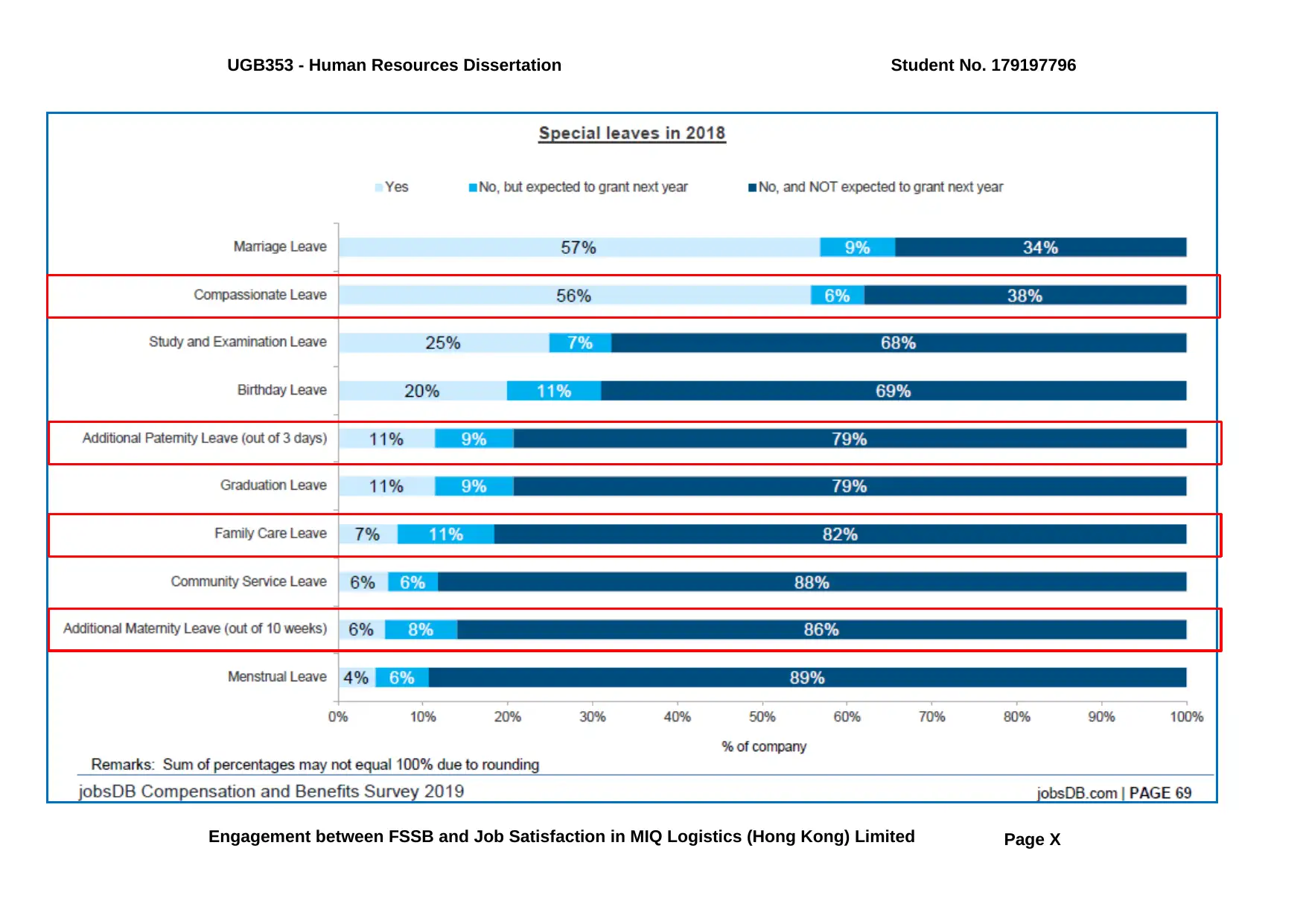
UGB353 - Human Resources Dissertation Student No. 179197796
Engagement between FSSB and Job Satisfaction in MIQ Logistics (Hong Kong) Limited Page X
Engagement between FSSB and Job Satisfaction in MIQ Logistics (Hong Kong) Limited Page X
Paraphrase This Document
Need a fresh take? Get an instant paraphrase of this document with our AI Paraphraser
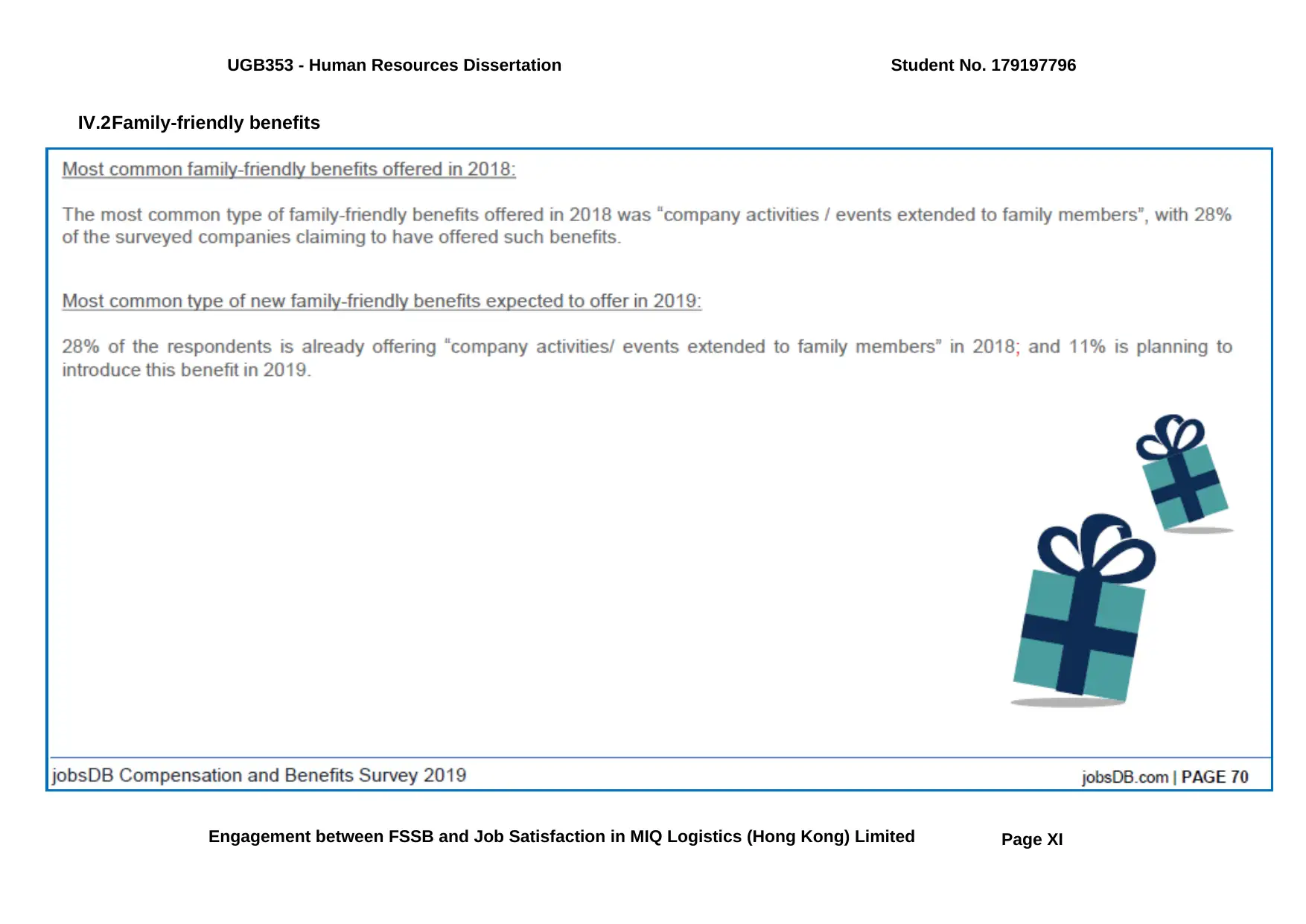
UGB353 - Human Resources Dissertation Student No. 179197796
IV.2Family-friendly benefits
Engagement between FSSB and Job Satisfaction in MIQ Logistics (Hong Kong) Limited Page XI
IV.2Family-friendly benefits
Engagement between FSSB and Job Satisfaction in MIQ Logistics (Hong Kong) Limited Page XI
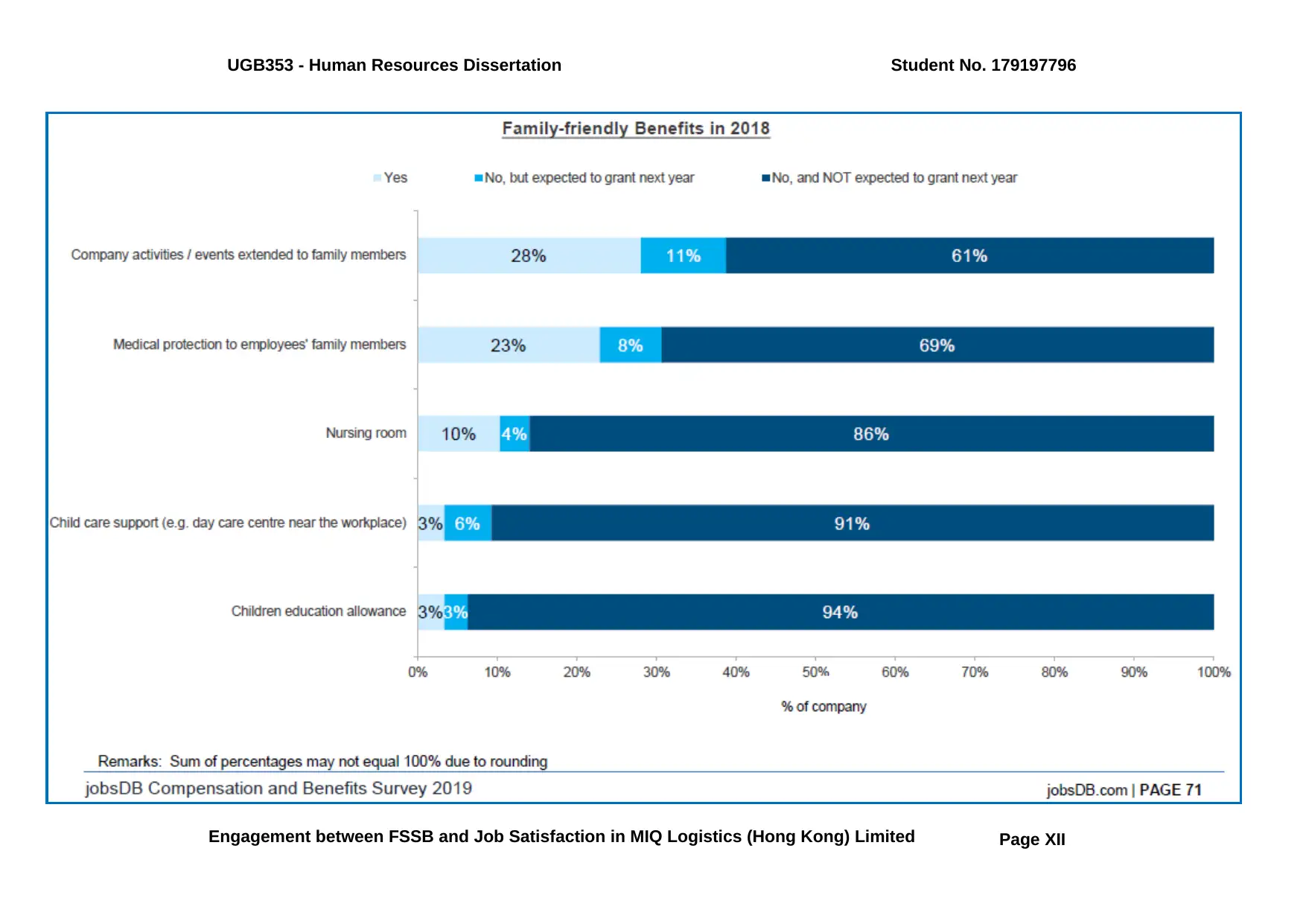
UGB353 - Human Resources Dissertation Student No. 179197796
Engagement between FSSB and Job Satisfaction in MIQ Logistics (Hong Kong) Limited Page XII
Engagement between FSSB and Job Satisfaction in MIQ Logistics (Hong Kong) Limited Page XII
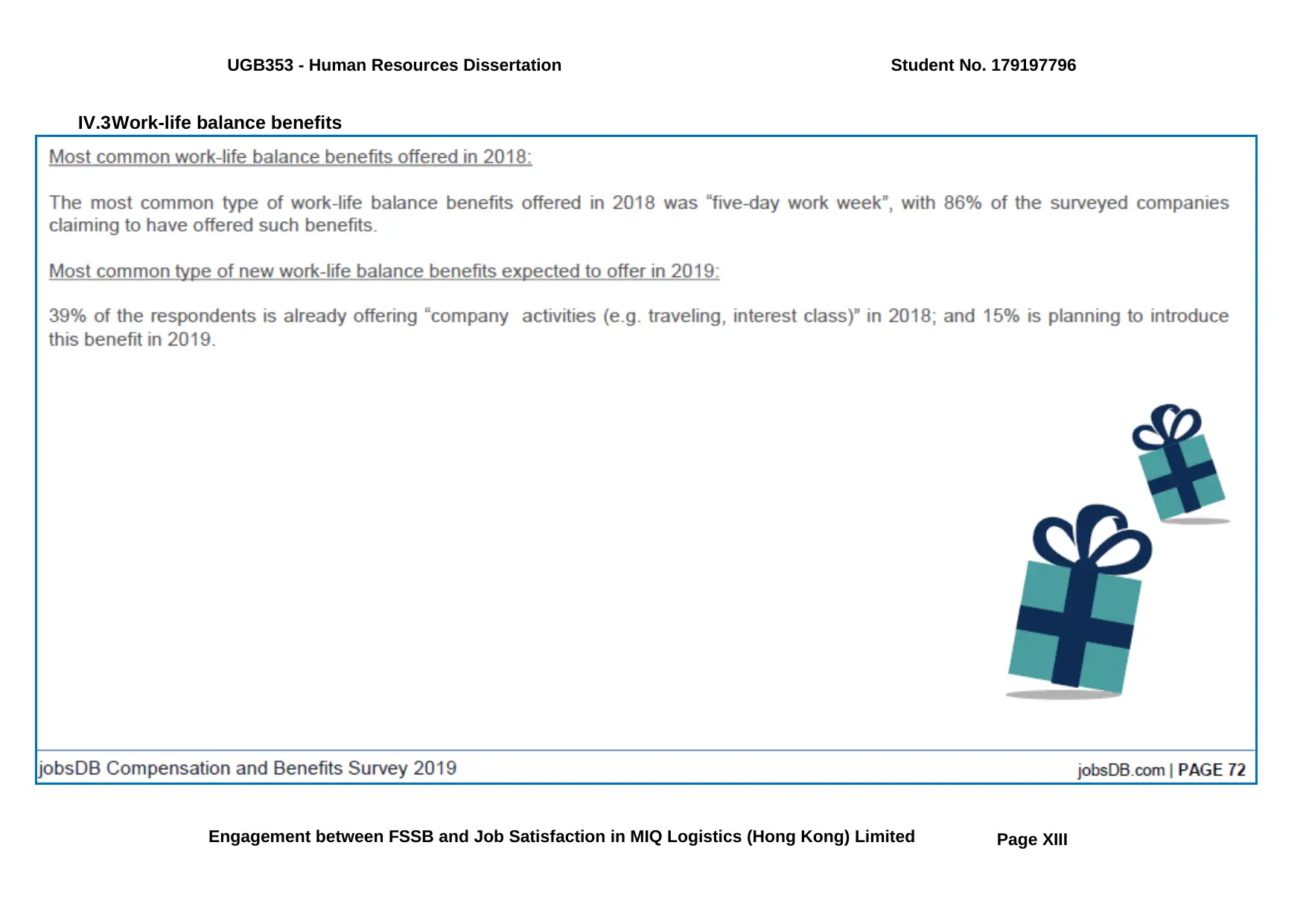
UGB353 - Human Resources Dissertation Student No. 179197796
IV.3Work-life balance benefits
Engagement between FSSB and Job Satisfaction in MIQ Logistics (Hong Kong) Limited Page XIII
IV.3Work-life balance benefits
Engagement between FSSB and Job Satisfaction in MIQ Logistics (Hong Kong) Limited Page XIII
Secure Best Marks with AI Grader
Need help grading? Try our AI Grader for instant feedback on your assignments.
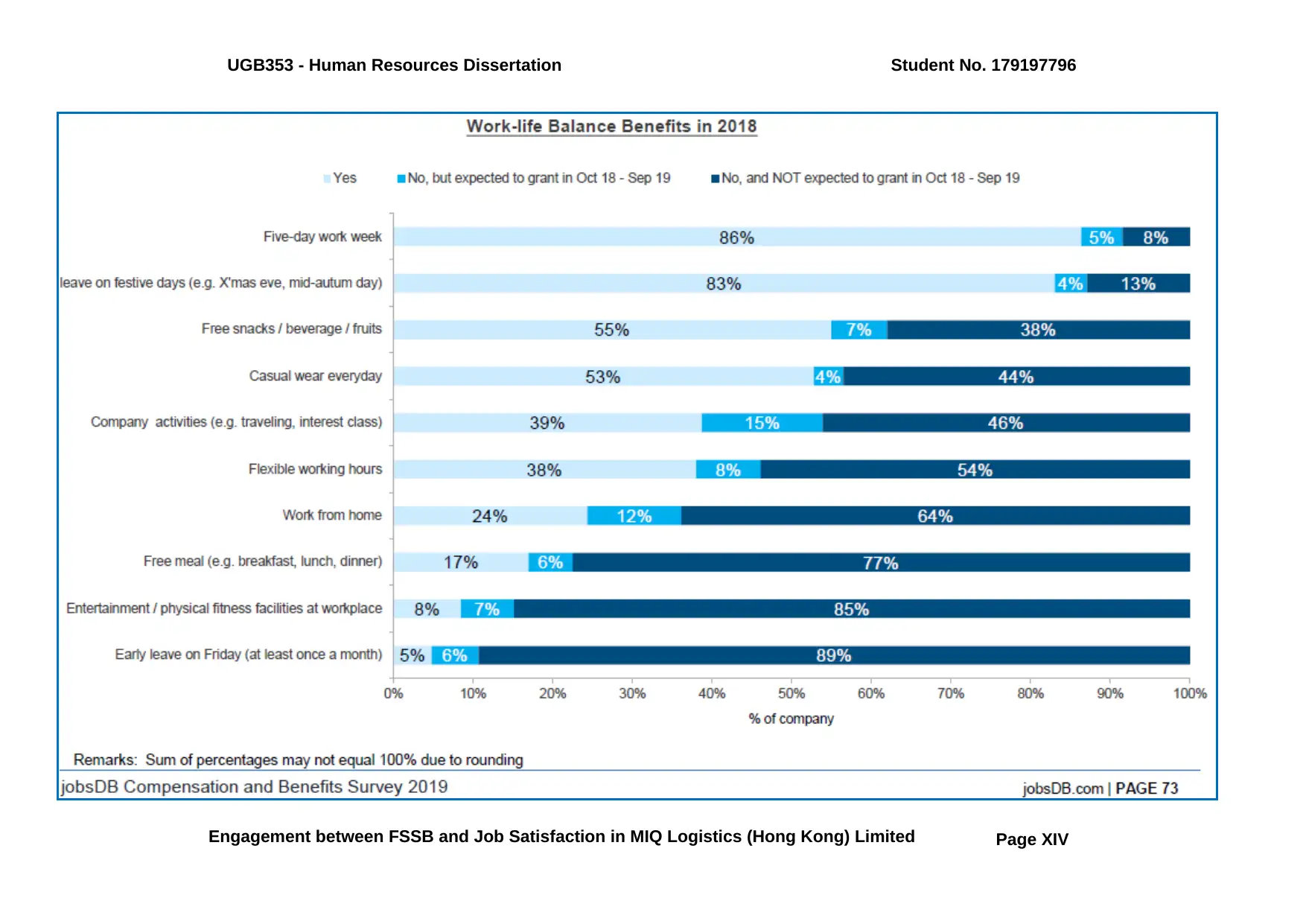
UGB353 - Human Resources Dissertation Student No. 179197796
Engagement between FSSB and Job Satisfaction in MIQ Logistics (Hong Kong) Limited Page XIV
Engagement between FSSB and Job Satisfaction in MIQ Logistics (Hong Kong) Limited Page XIV
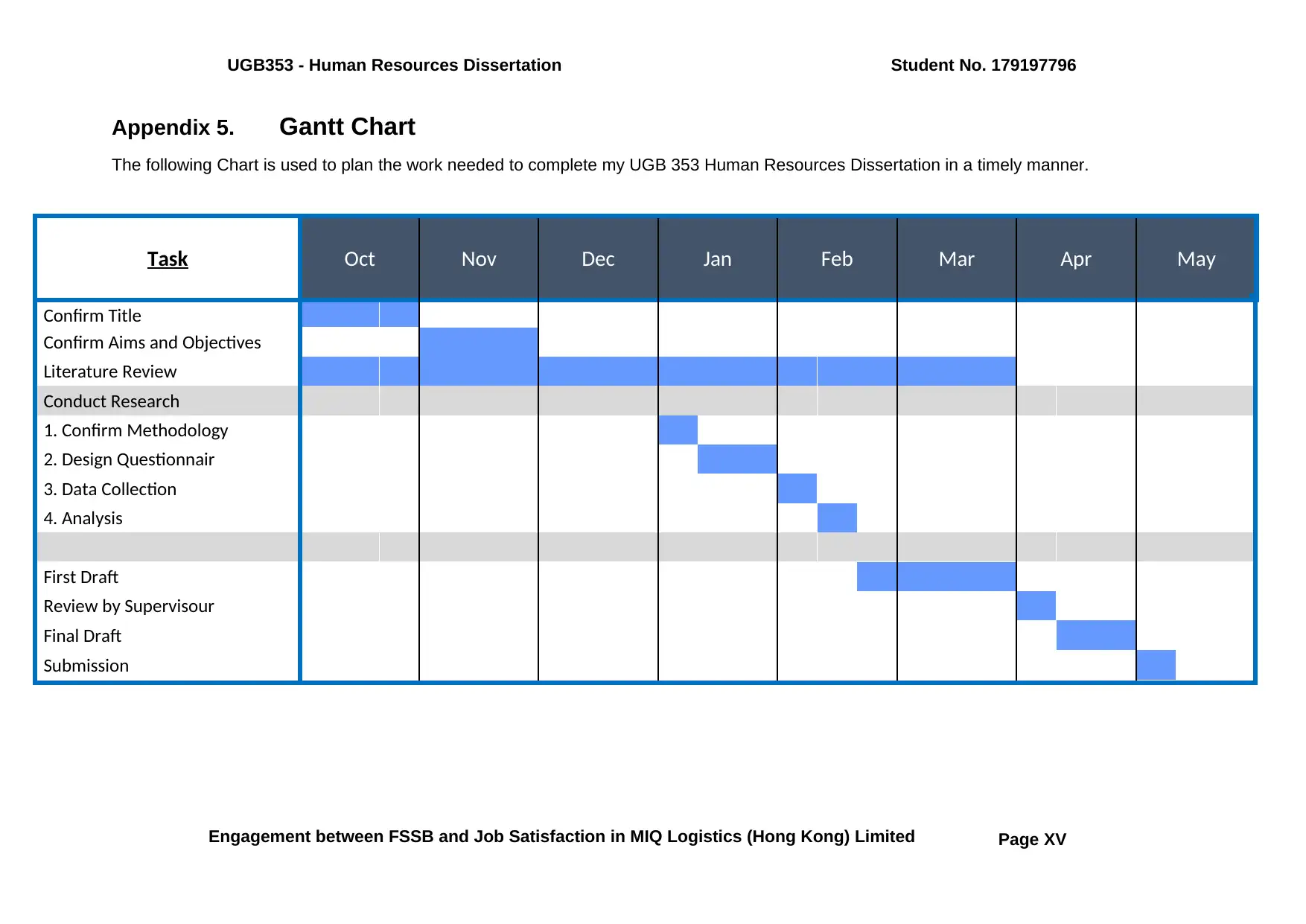
UGB353 - Human Resources Dissertation Student No. 179197796
Appendix 5. Gantt Chart
The following Chart is used to plan the work needed to complete my UGB 353 Human Resources Dissertation in a timely manner.
Task Oct Nov Dec Jan Feb Mar Apr May
Confirm Title
Confirm Aims and Objectives
Literature Review
Conduct Research
1. Confirm Methodology
2. Design Questionnair
3. Data Collection
4. Analysis
First Draft
Review by Supervisour
Final Draft
Submission
Engagement between FSSB and Job Satisfaction in MIQ Logistics (Hong Kong) Limited Page XV
Appendix 5. Gantt Chart
The following Chart is used to plan the work needed to complete my UGB 353 Human Resources Dissertation in a timely manner.
Task Oct Nov Dec Jan Feb Mar Apr May
Confirm Title
Confirm Aims and Objectives
Literature Review
Conduct Research
1. Confirm Methodology
2. Design Questionnair
3. Data Collection
4. Analysis
First Draft
Review by Supervisour
Final Draft
Submission
Engagement between FSSB and Job Satisfaction in MIQ Logistics (Hong Kong) Limited Page XV
1 out of 66
Related Documents
Your All-in-One AI-Powered Toolkit for Academic Success.
+13062052269
info@desklib.com
Available 24*7 on WhatsApp / Email
![[object Object]](/_next/static/media/star-bottom.7253800d.svg)
Unlock your academic potential
© 2024 | Zucol Services PVT LTD | All rights reserved.



